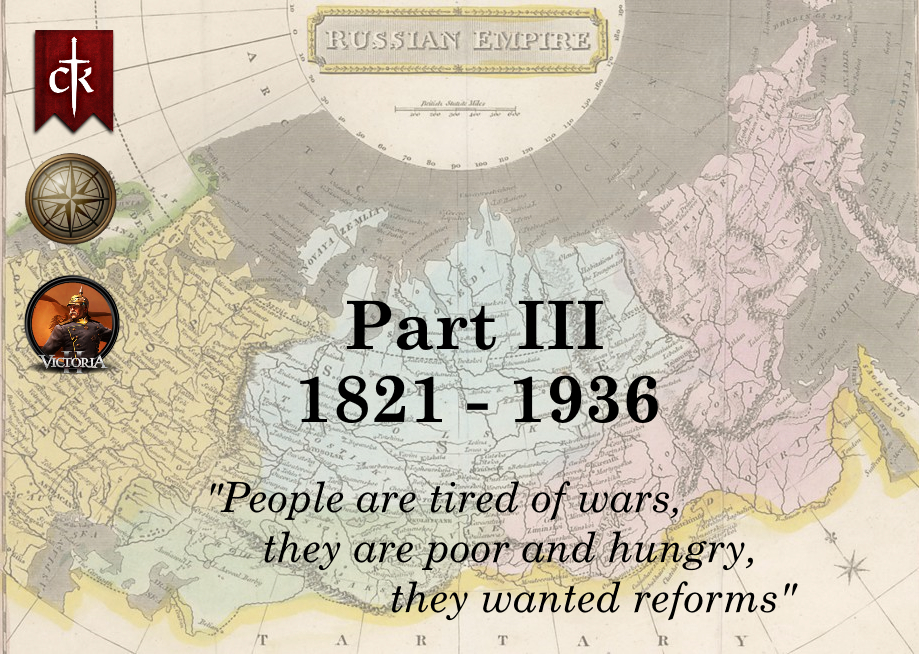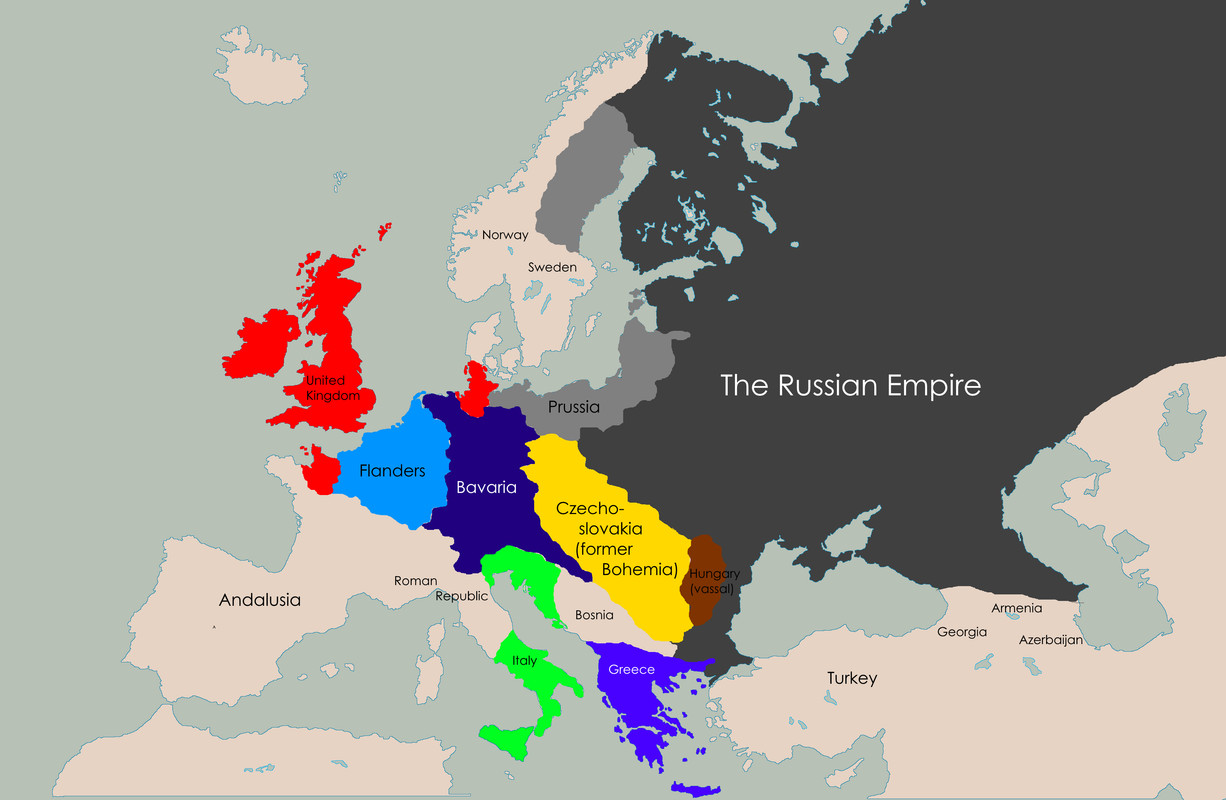The Russian Path, Part 3 - Megacampaign
- Thread starter Gamov_Andrew
- Start date
-
We have updated our Community Code of Conduct. Please read through the new rules for the forum that are an integral part of Paradox Interactive’s User Agreement.
You are using an out of date browser. It may not display this or other websites correctly.
You should upgrade or use an alternative browser.
You should upgrade or use an alternative browser.
Threadmarks
View all 12 threadmarks
Reader mode
Reader mode
Recent threadmarks
Chapter III. Reign of Alexandr II Meri (1855-1870) Chapter IV. Reign and death of Alexandr II Meri (1870-1882) Chapter V. The Witte’s years (1882-1892) Year 1905 Chapter VI. Dawn of New Age. 1905 Chapter V. Stolypin. Failed Statesman (1905-1915) Chapter VI. Frunze. Fall of The Empire (1905-1917) Chapter VII. Fragile Republic: Between Fascists and Communists (1918-1921)
Introduction
Hello,
The third part of my megacampaign. Make sure, that you've subscribed to trace the great history of the Russian Emprie from Dark and Middle Ages. through Early Modern Period to Great Divergence. The Noble House of Meri has ruled the country for thousands of years. Will they keep power in their own hands?
The third part of my megacampaign. Make sure, that you've subscribed to trace the great history of the Russian Emprie from Dark and Middle Ages. through Early Modern Period to Great Divergence. The Noble House of Meri has ruled the country for thousands of years. Will they keep power in their own hands?
Last edited:
- 1
Oh boy, I definitely need to read previous two parts. I wonder will this AAR reach Stellaris.
- 1
Chapter I. New times are coming (1820-1833)
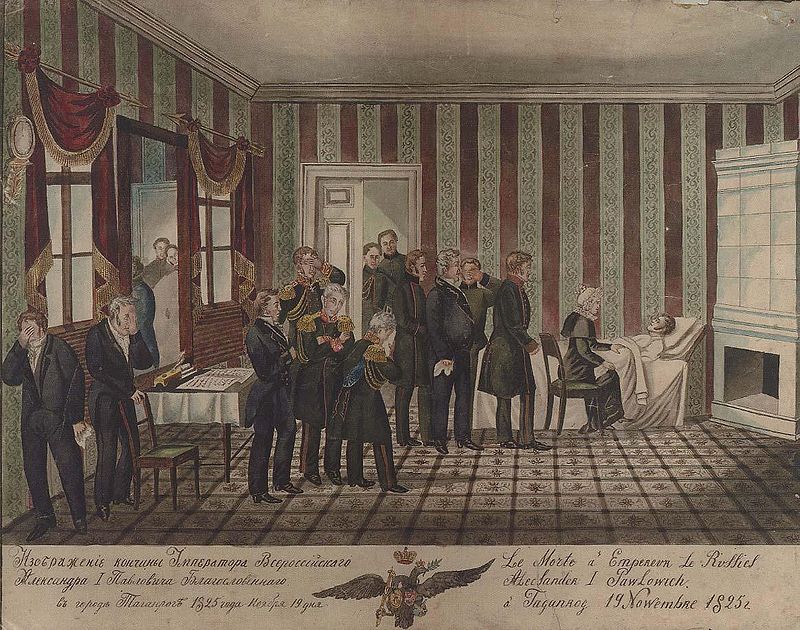
Tsar Alexandr I Meri is dying in the Winter Royal palace on the banks of Neva River. Winter is extremely cold in this year, Saint-Petersburg, a capital of the Russian Empire, is frozen solid. Courtiers and ministers are confused, they are afraid of change of power after Alexandr’s long and often disastrous reign. The fifty years of his reign were full of conquest, naval and land battles, great achievements and civil turmoil. Now, his time comes to the end… The Empire is waiting for new Tsar, who will reign in a completely new era of steam and steel.
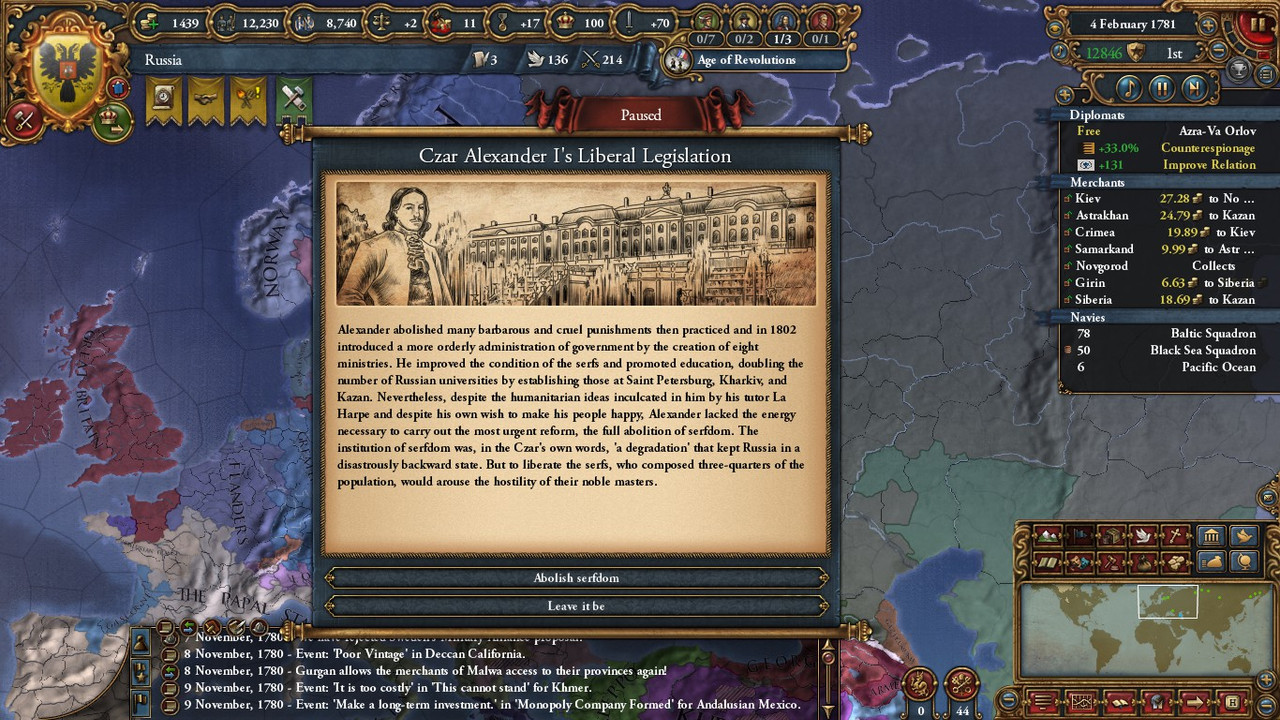
Alexandr was born in 1771 and ascended the throne in 1780, when he was only 13 years old. Father’s advisors Konstantin Ushakov, Prusas von Blucher and Vseslav Khovansky kept their positions in the Royal Court, they formed unofficial “triumvirate” to govern Russia while Tsar was too young. Alexandr began to follow liberal policy, influenced by the advisor’s triumvirate. He removed most restrictions on economy and civil life, imposed by his father Pyotr II Meri (1733-1784). Russia was becoming more open to new cultural and institutional changes, moved from Europe. Enlightenment has touched the most of European countries, establishing new ways of government, communication and the organization of society.
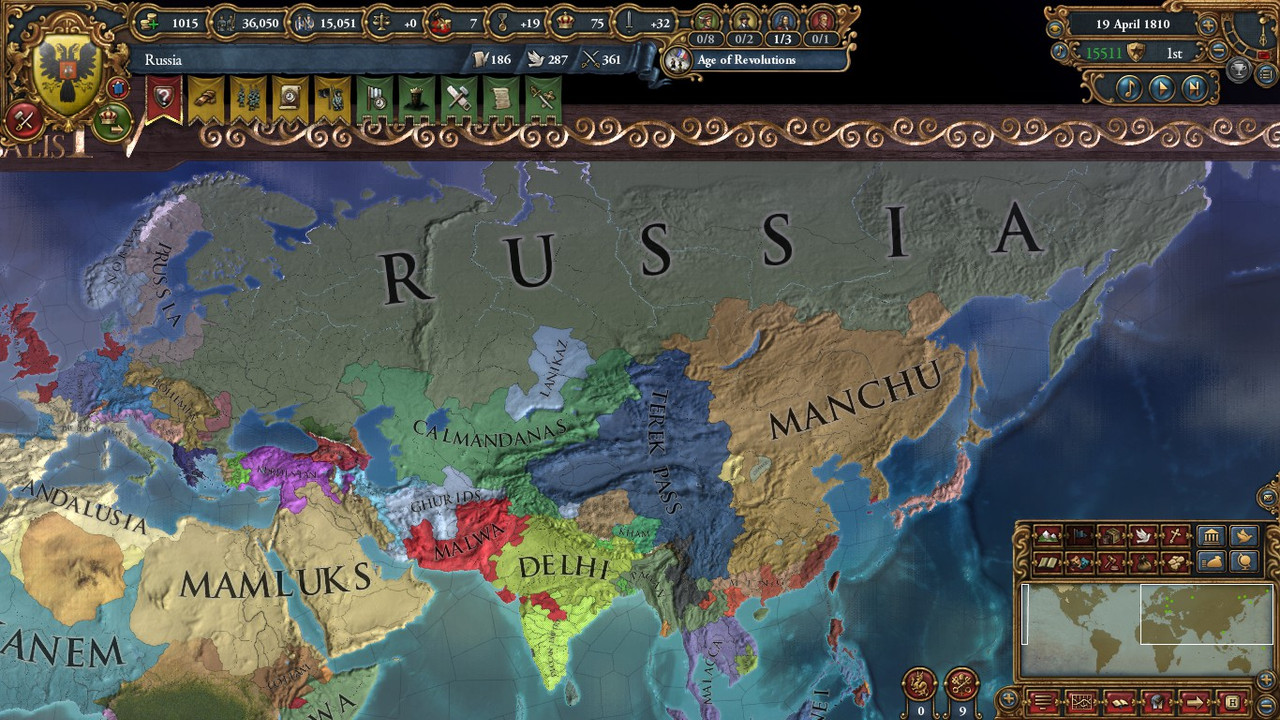
Military advisor Prusas von Blucher was an author of new Russian foreign policy. Thrace (including Constantinople), Finland, Poland and East Siberia were annexed to Russia along with some provinces on the Caucasus. In the period from 1801 to 1804 Russia seized colonies in the Pacific Ocean (Micronesia, Philippines, Hawaii and Oceania). Island of Hainan was defected from the Ming and Russia gained an important naval base in the Chinese Sea. Dreams of Tsar Dmitry I Meri (1613-1646) have been finally accomplished – Russia has become a colonial power. The Russian Pacific fleet began to won the first naval battles, while land armies defeated enemy within former territories of the Ming. The Riches of China were strengthening trade and economy, Russia was becoming a continental hub on the trade route between Asia and Europe. See Chapter in EU IV ARR
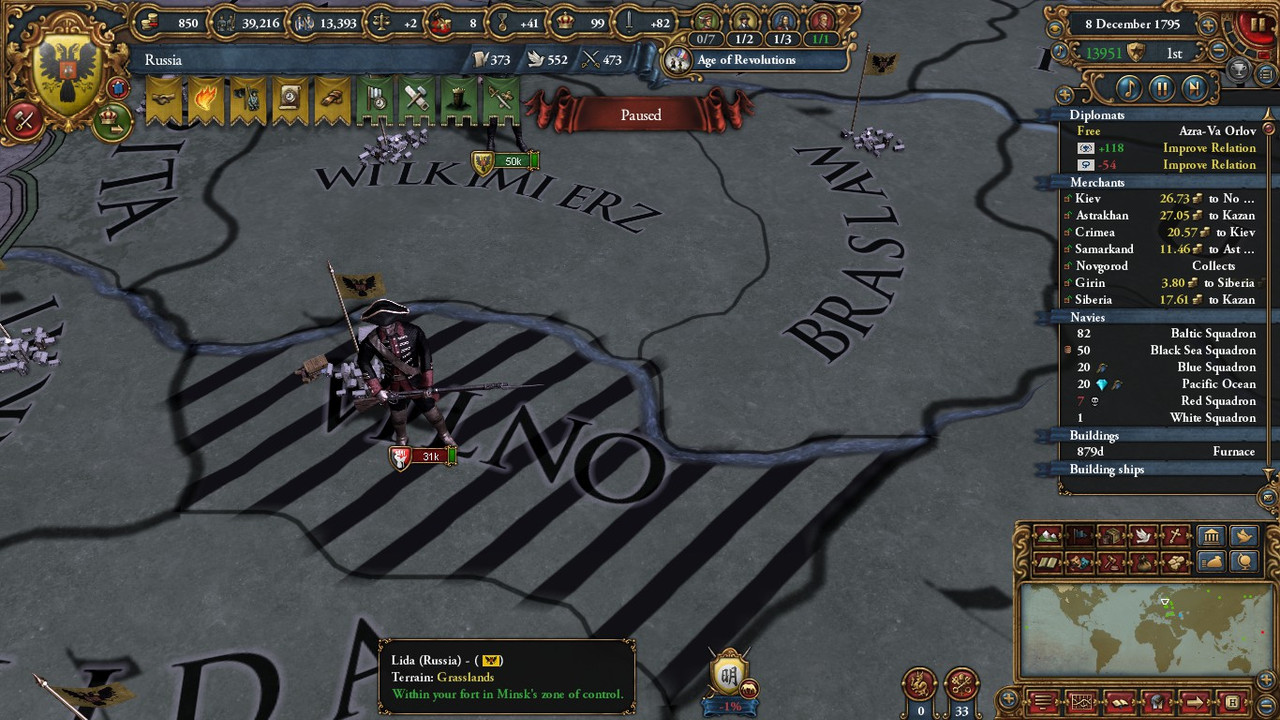
Alexandr I Meri turned to more traditional way of government, when he is coming of ages. He decided to replace father’s advisors and change the course of internal policy. Liberal reforms have been curtailed. Press was strictly censored, public meeting and circles were abandoned, nobility and burgers lost their initially granted rights. Tsar established secret police, which had rights to imprison without court judgment. However, Alexandr I Meri faced strong opposition from all estates. The curtailing of freedoms and rights has led to mass discontent in the whole Russian society. In 1795 a delegation of about 50 noblemen, officers and burgers was dispersed by police near the Royal Palace. Some members of the delegation were imprisoned, including influential Guard officers. Consequently, the Guard raised in Vilno, a local town on the border with Prussia. Vilno was a former capital of Lithuania, a once-great kingdom in the Middle Ages. Rebels captured fortress and gained control over the city. They sent delegation to Tsar in order to escape massacre. Tsar Alexandr I Meri ordered to suppress the rebellion using artillery which resulted in bloody massacre. Leaders of the rebellion were executed. See about it (chapter EU IV)
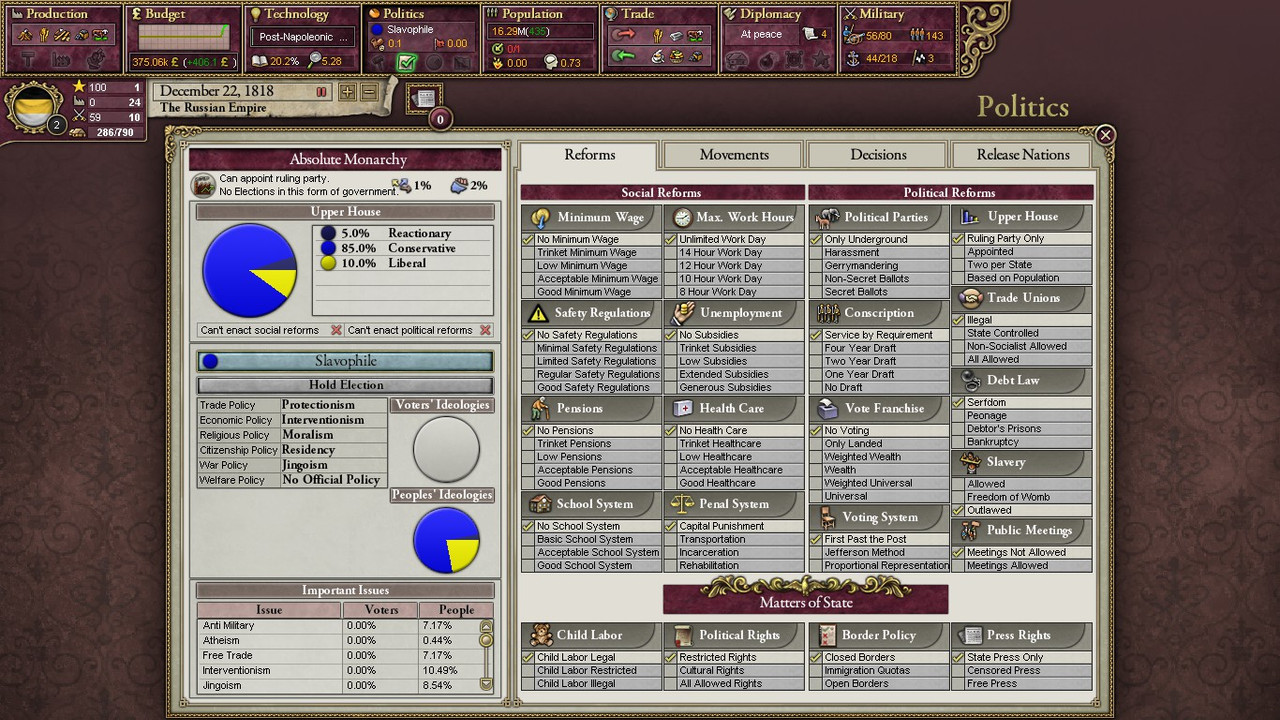
The Russian society was shocked by extreme brutality of 25-years-old boy. A few years later, widespread rebellion broke out through the country. More than 200 000 men upraised against Tsar and his retrograde policy. Turmoil compounded by full-scale warfare, hungry and civil disaster. Tsar could suppress the rebellion, but the country was in ruins…. After the riots of 1807/1808 Alexandr I Meri pursued reactionary and militarist policies. He suppressed any voluntary movement and imposed retrograde policy of destructive laws. In the first quarter of the 19th century the Russian Empire was described as an Absolute monarchy, the Russian subjects had no any political rights and freedoms.
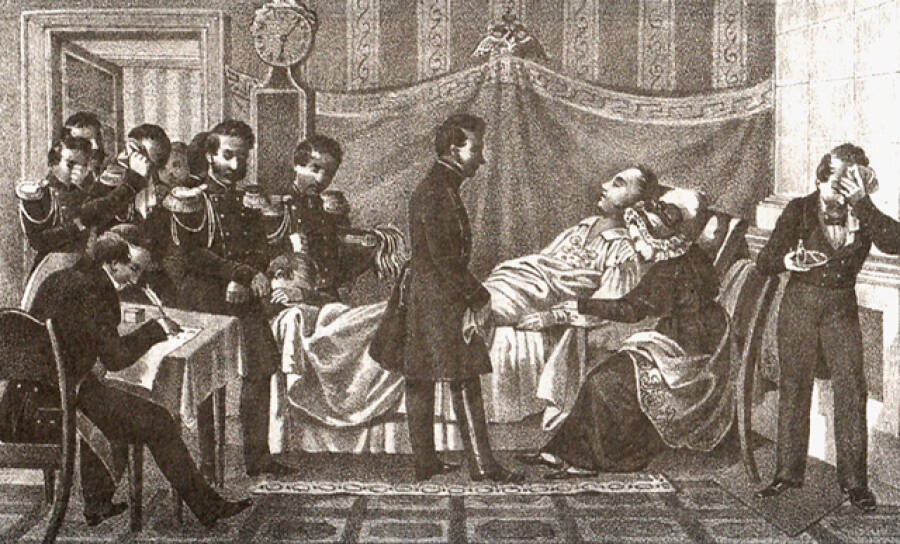
Crown Prince Nicholas is speaking with ministers and generals in the next room. His father is dying and he can do nothing. How long is he suffering? 10 hours, sir. Oh God. We must prepare for the worst, sir. The Russian Empire lost its ruler in that cold night. Is Guard loyal to the Royal House of Meri? Yes, they are loyal but most of them hates Tsar and desires for changes. I know about some secret societies of officers. Hopefully, they are not planning military coup. That is an avant-garde, the leading part of the Russian society, which hopes for changes.
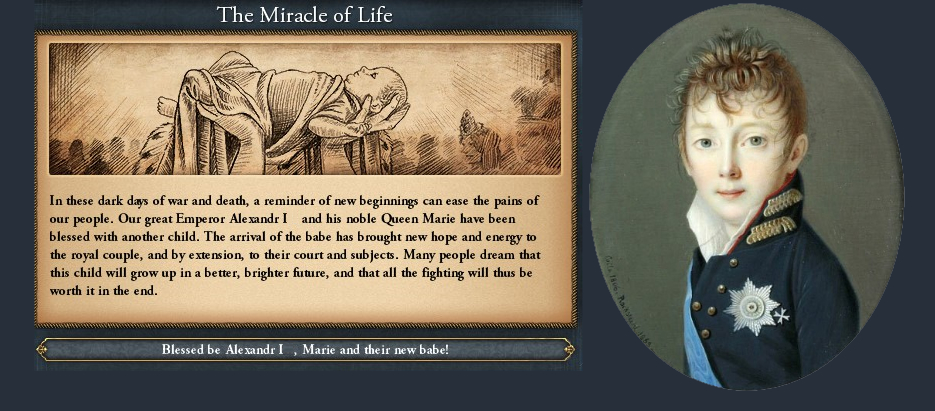
Nicholas was born on June, 20, 1802 in Saint-Petersburg. He was an oldest son of Tsar Alexandr I Meri and must succeed the Russian Empire. Nicholas got excellent home education and later entered the Cadet Corp. At age 20, he graduated the Cadet Corp, as a sub-lieutenant of the Imperial Guard detachment. He had excellent grades in Math, Engineering and Military drill. Crown Prince Nicholas would see himself as a war hero like Pyotr the Great (1676-1710). See about Peter I Great here
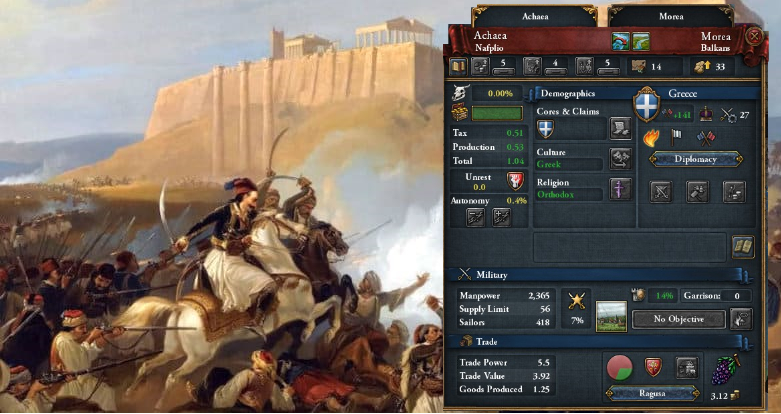
Russia joined Greece independence war against Bosnia and Bavaria as an ally of Greece. Russia won the war and many nobles moved to Greece. Young Nicholas was among them, who wants to visit a beautiful south country. The Greeks were grateful for military assistance provided by the Russian Tsar. Alexandr I Meri visited Greece himself to relax from oppressive atmosphere of a sustained and relentless civil disorder. He fell into depression after losing another war with Manchuria. Tsar need rest, food, time to care for his own family and health. Nicholas joined father and spent with him much time, talking about history, policy, wars and foreign relations.
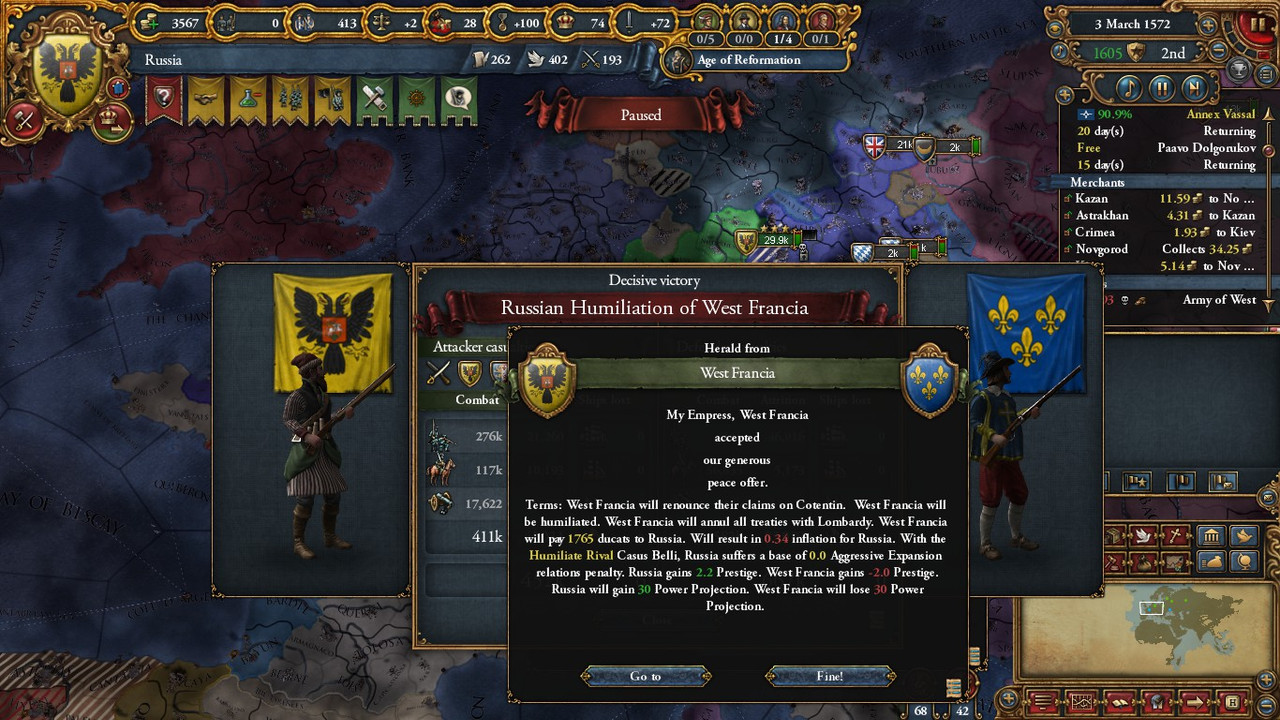
Duke of Greece gave an ancient book to Nicholas as a gift for the royal House of Meri. That was a memory of Ivan Meri. Ivan Meri was a nephew of Elizabeth I Meri (1540-1594) and heir to the throne of the Russian Tsardom. Ivan occasionally died in 1575 and his sister Mari succeeded the throne (1594-1613). Nobody knows that he created memories about The First Holy League War (1562-1572), when Russia joined the coalition of catholic states against pagan West Francia and its allies. Ivan Meri was a Supreme Commander of the Russian Army, brave and genius commander, who fought on the territories of Poland, Germany, France, Flanders and North Italy. Due to the Russian military provision norse pagan West France disappeared from the map of Europe. Bavaria, Prussia, Bohemia and Mecklenburg replaced France in the central Europe. These countries survived due to Russia.
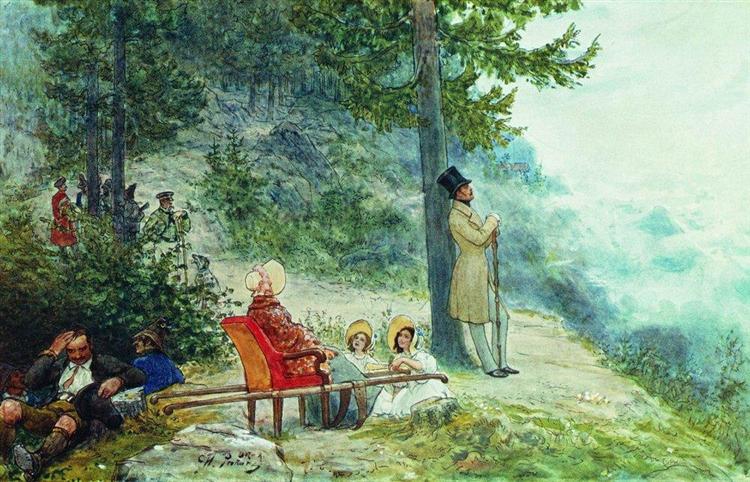
I want to be a hero like Ivan Meri, father! I’m just afraid that Tsar is more book keeper than a hero in the coming era. Military success depends more on industry workforce, population and positive net trade balance. Strong and self-sufficient economy is a key to military success. Son, internal enemy is more dangerous than rival neighbors. All kings in Europe have the same enemy – revolution. I have faced the ghost of revolution fifteen years ago. Empire had narrowly escaped the collapse during the riots of 1807/1808. My son, once you will be a King, don’t forgive the advice of your father.
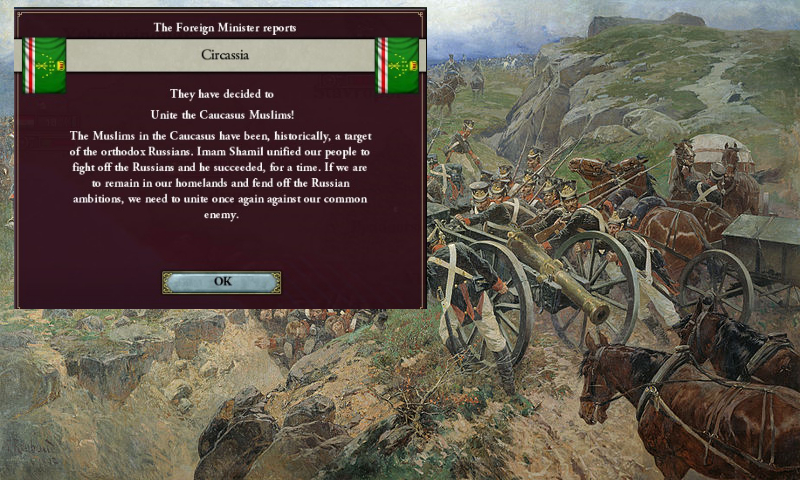
Grand Prince Nicholas went to the Caucasus at the dislocation of the Russian army in 1821. He took part in military actions within Georgia and Armenia. Russia was defending its allies from hostile coalition of the former Persian states. Grand Prince commanded a regiment, fighting in few land battles. War ended in the end of 1822; Russia has protected its allies.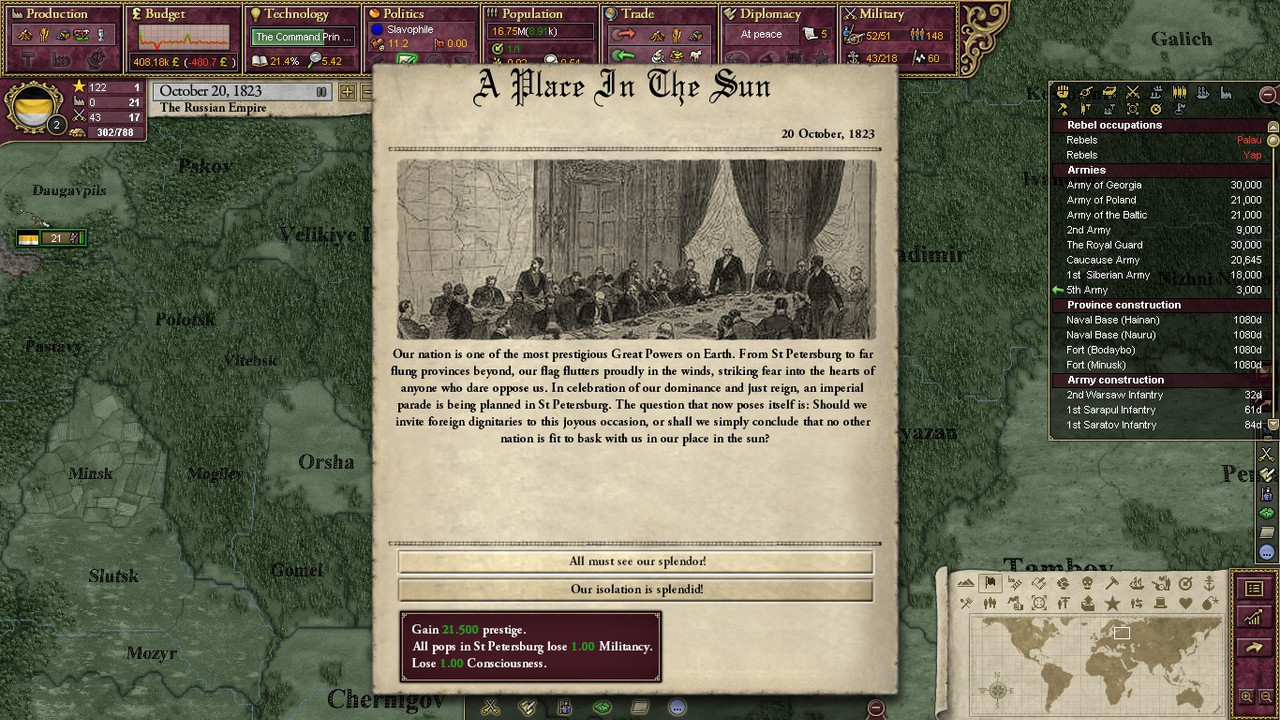
Next year The Russian Empire celebrated 1000th anniversary of the House of Meri. Great military parade was announced in Saint-Petersburg on the Mars square. The Russian Empire has grown from a pity Suomenko duchy of Opolye. The first Chieftain of Opolye Surt Meri was elected in 823 AD . His descendants managed to defeat the Vikings and the Khazar Khaganate, having based independent Vadimir kingdom in 1004 AD. Just over two hundred years Kingdom of Vladimir turned into the Holy Suomenko Empire. Petri I Meri (1185-1234) declared himself as an Emperor of all Suomenko tribes and states in 1227 AD. See about it (Crusader Kings III ARR).
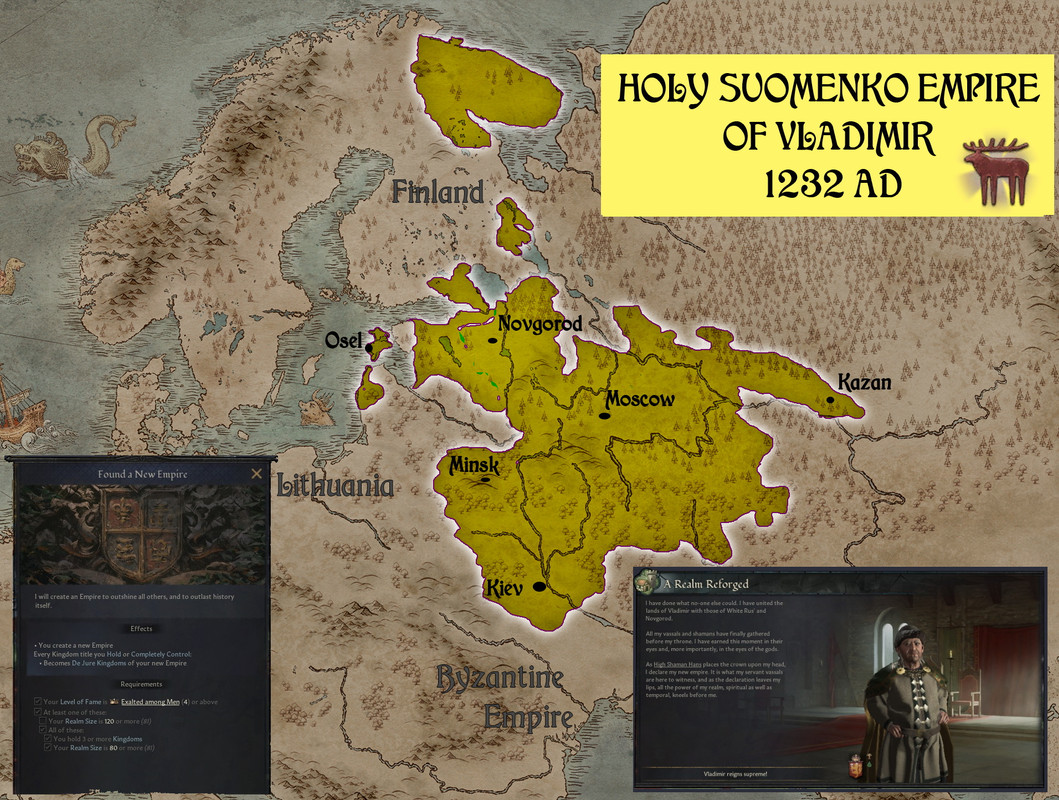
Merya’s tribes were following the Suomenko faiths and beliefs. After the conquest of all Holy Suomenko Places, Ashava reformed the faith and Vladimir kingdom had embraced the feudal ways of government in 1102 AD. However, the future members of House Meri had to convert to Christianity. The Byzantine Empire joined the civil war, flaming in the Holy Suomenko Empire during the Second Imperial Crysis in the period from 1330 to 1346 AD. The Byzantines supported for Kezhevat I “Murder” (1331-1346) and he promised them to convert his own son and heir. Tikshayka II Meri (1346-1379) converted to the Eastern Orthodox Church and founded the Medieval Russian Empire in 1367 AD. See here, here
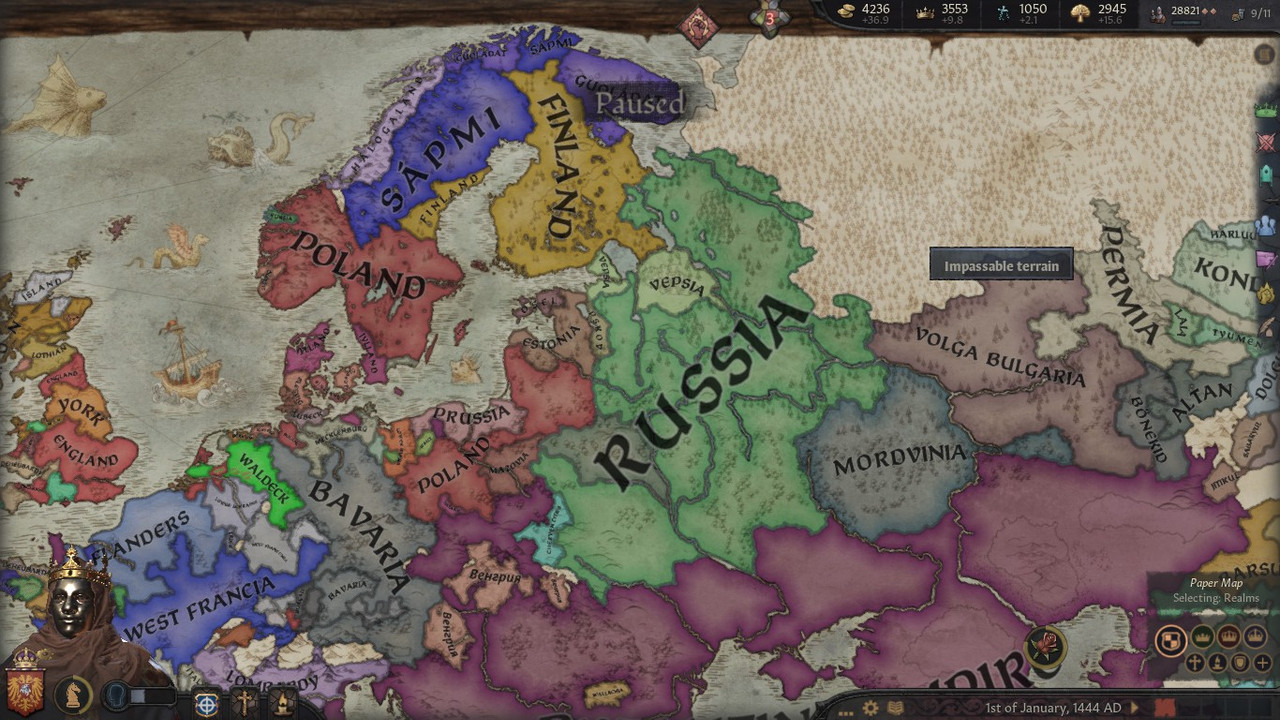
The Byzantine support was becoming more and more wearisome for the Russians. Up to the end of XIV century the Byzantine Empire had conquest the Balkans, Minor Asia, Anatolia, Caucasus, Pontic region and the south part of Apennines. After the Third Imperial Crysis Tsar Alexandr Meri (1379-1434) began to convert into the Western Catholic Church. Catholicism seemed safer than Orthodoxy, supported by the aggressive Byzantine Empire. The endpoint of the conversion become the battle of Moscow in 1429 AD. Strict policy to convert local population into the western Catholic Church was perceived as an attack on the cultural identity. Conversion caused the mass uprising of orthodox zealots against Tsar. Decisive battle occurred near Moscow. Loyal army led by Alexandr and his son Ivan (future Ivan I Meri) defeated the rebels and leave the siege of Moscow, which lasted for more than 10 months. In response, Alexandr moved the capital from Moscow to Tver in 1432. See about it in the last chapter of CK III ARR
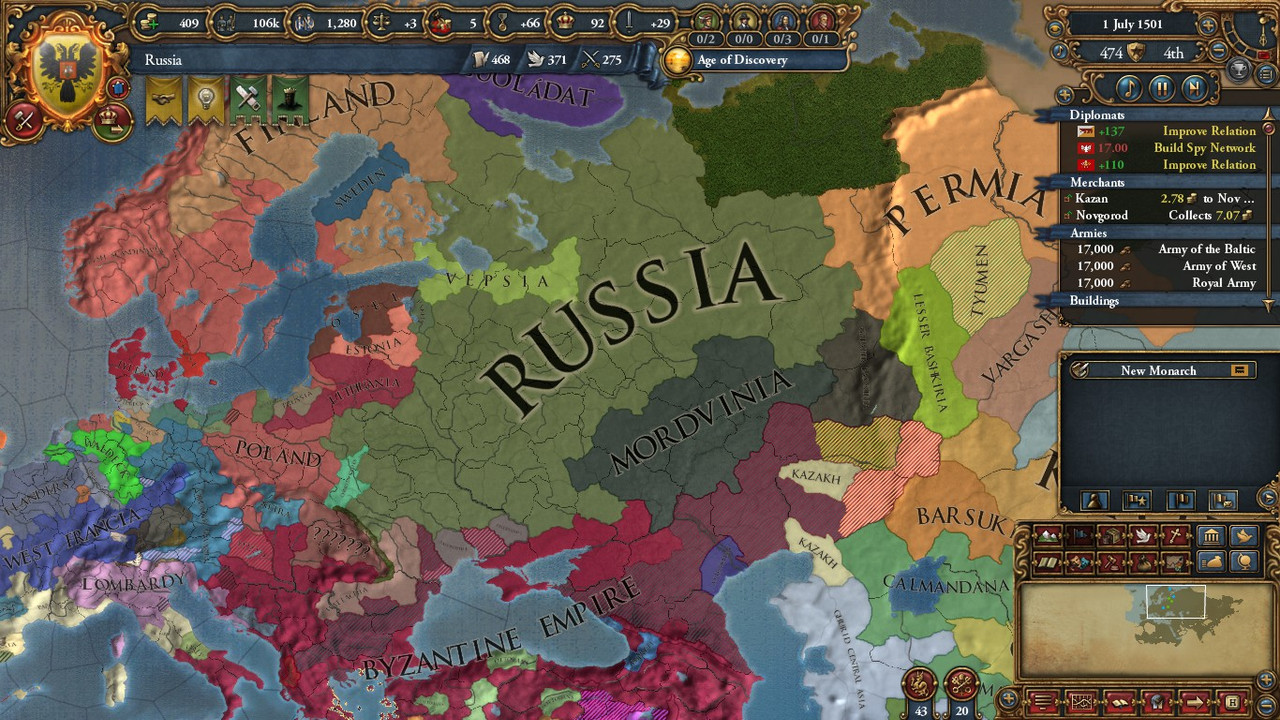
Russia passed through three the so-called Imperial Crysis during the 14th century. A few parts of the realm had separated, having become independent states. Most of them were hostile toward the former owner. Hopefully, Russia had not collapsed and Ivan II Meri returned most of the cored Russian provinces during the 1470s. After falling of the Byzantine Empire, Russia included also the whole Pontic region, getting access to the Black Sea. Fruitful lands of Crimea were given to the Russian Tsardom.
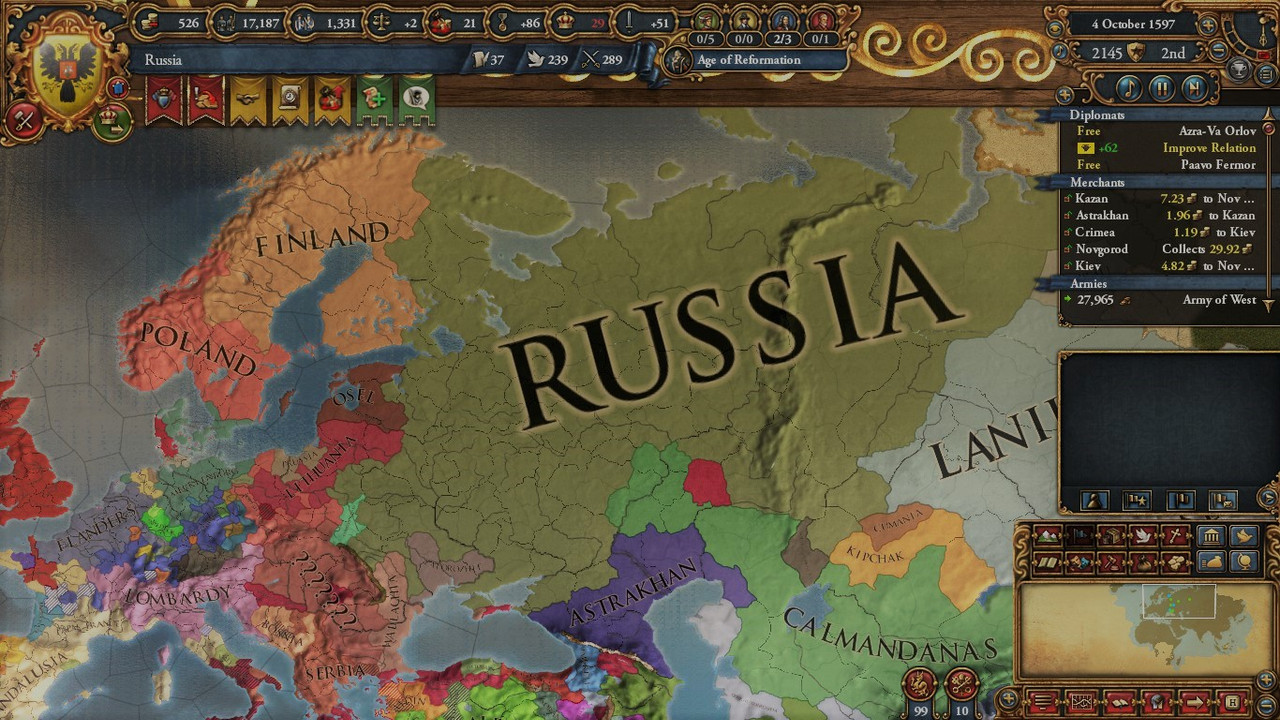
In the period of “Golden Age” of Elizabeth I Meri (1540-1594) the Russian Tsardom began to colonize the lands of Ural and West Siberia. The Riches of Siberia had accelerated economic growth in the 1610s, the main part of the treasury’s income was non-tax revenues) trade and later production). Government launched an ambitious programmed of manufactory’s building. The Russian Tsardom had become a leading country in iron and copper producing (Weapons Manufactories). In the XVII century Russia settled the coast of the Pacific Ocean. North Asian Alliance of Russia, Manchuria and Ashikaga defeated the Ming in a few bitter wars. The Russian Pacific fleet was founded in early 1672. See about it here
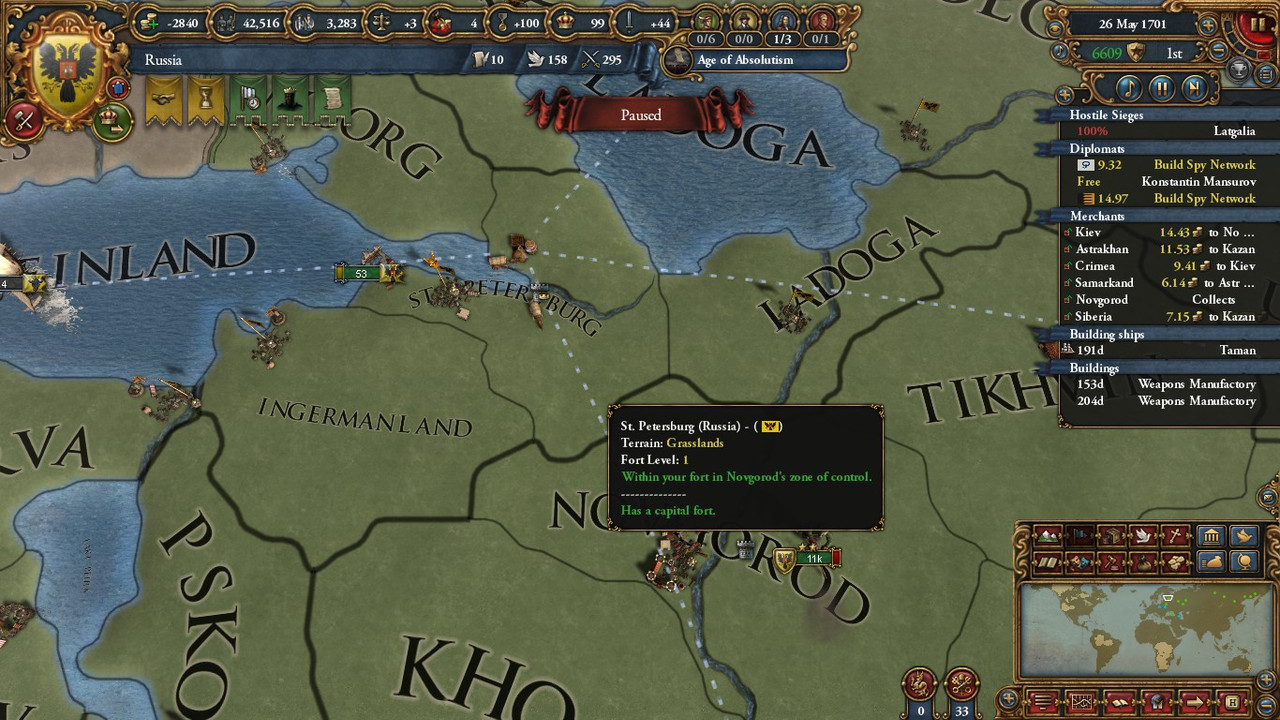
At the turn of XVIII century Pyotr I Great (1676-1710) launched a global reform program, aimed at the complex modernization of the Russian society. Despite economic growth and territorial expansion Russia lagged in technology and institutions. The Russian troops could defeat hostile coalition under the leadership of Calmandanas thanks to the reforms started under Pyotr I Meri. An important trade node n the south, Astrachan, was captured by the Russian troops in 1695. Westernized army and fleet dominated the Eastern Europe, South Asia and the Caucasus over the next few decades. Pyotr I Meri founded a new capital, Saint-Petersburg, to speed institutional spread from Europe to Russia. Th Tverian period of the Russian history has come to its end. See here.
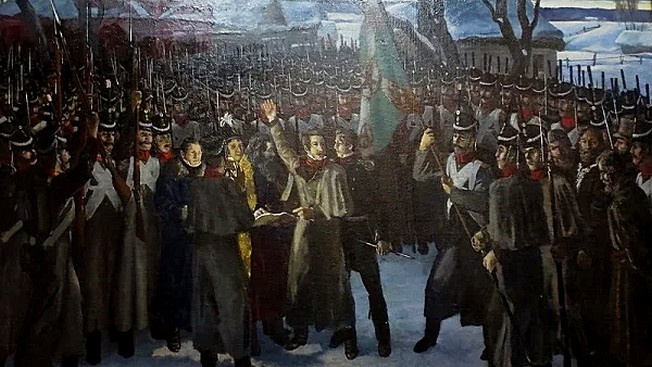
Despite the Perine reforms Russia was falling behind in technologies, trailing its international rivals in terms of both military strength and wealth. In the long reign of Pyotr II Meri (1730-1784) the Russian Empire suffered unsuccessful wars both wit Prussia and Manchuria, heaving extremely heavy causalities. Social discontent with absolute monarchy spread rapidly, as the economy began to experience downtown. From the 1750s hostile publications against Tsar had been circulating over the whole capital. Great Riots of 1807-1808 were results not only of the reckless actions of Alexandr I Meri, his father also contributed to the uprising, that almost destroyed the Russian Empire and overthrow the Meri dynasty. Read about reign of Pyotr II Meri and social turbulence.
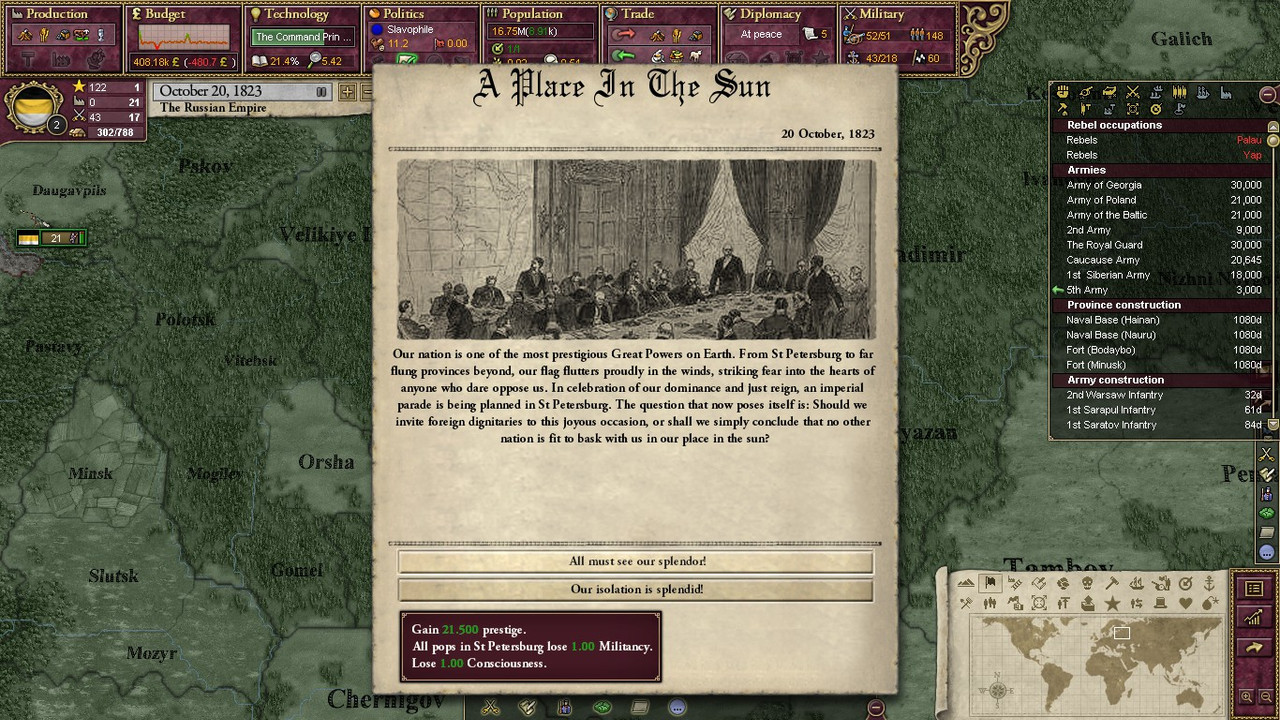
Grand Prince Nicholas Meri was assigned a Commander of Dragoons regiment, a new cavalry unit in the Russian army. Military conflict broke out on the Balkans, when Bosnia assaulted Greece in 1825. The Bosnian troops invaded Greece and occupied the northern provinces of country. Alexandr I Meri decided to avoid war but he secretly ordered to provide for military support (ammunition, small arms and money to Greece). Two years later Bohemia joined the war on the Greek side and Bosnia was defeated. Nicholas was sent to the Russian army, located in the suburbs of Constantinople. The Russian troops were ready for intervention but the order didn’t come. Nocholas married with Catherine, a daughter of the Duke of Mecklenburg. In 1827 son was born, he was named after the Russian Emperor Alexandr. Nicholas lived with family in Constantinople from 1825 to 1832.
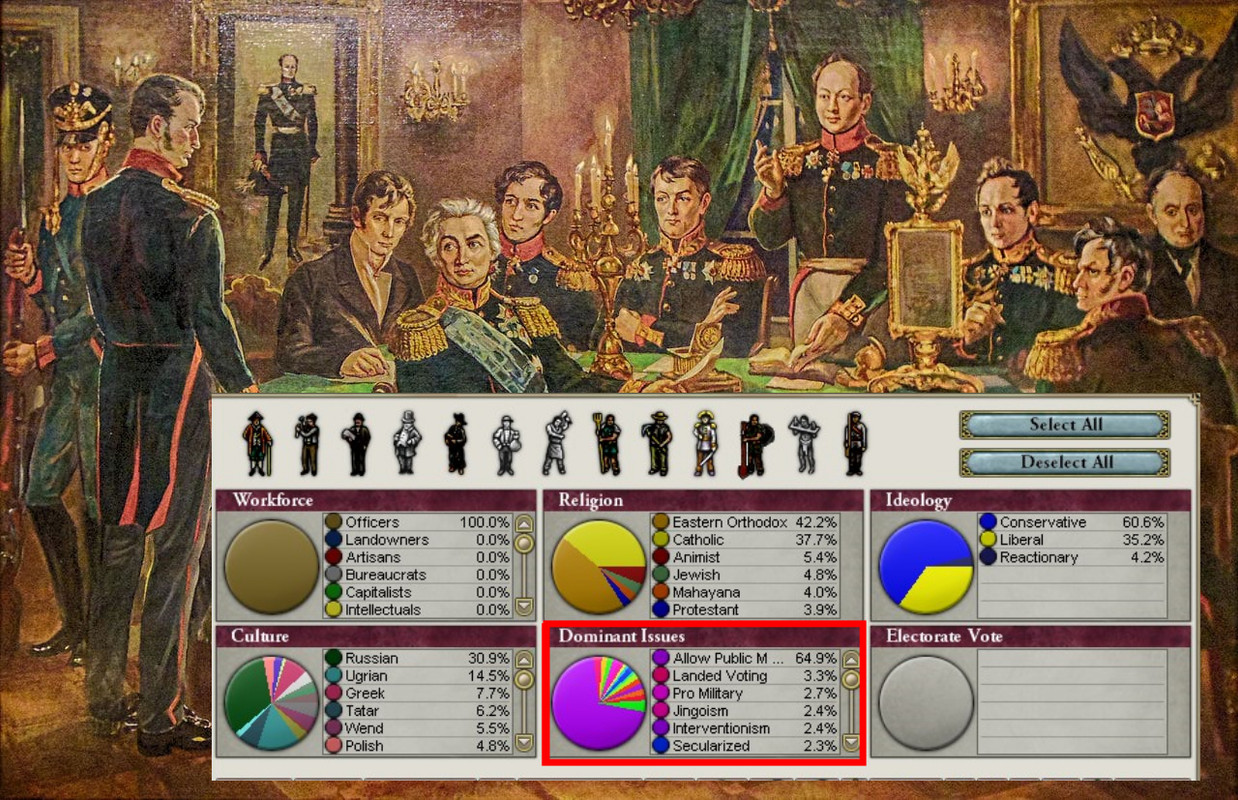
The Emperor continued following the reactionary policy of oppression. He was not confident with the loyalty of his own army. Campaign for Public Meeting was growing popularity, thus almost 70% of the Officer Corp demanded for liberal reforms. When revolution happened in Georgia in 1830, Tsar sent the Russian troops to suppress the uprising. King of Georga left the capital with much of his family, thus providing the liberal factions to make a more move for power. General Otari Mordashvili attempted a military coup on 17 May 1830, some brigades of the Georgian army upraised. In response, the 1st Russian Caucasus Army invaded the country and suppressed the rebellion. Otari was killed during the siege of Tbilisi, “Ancient regime” in Georgia has survived.
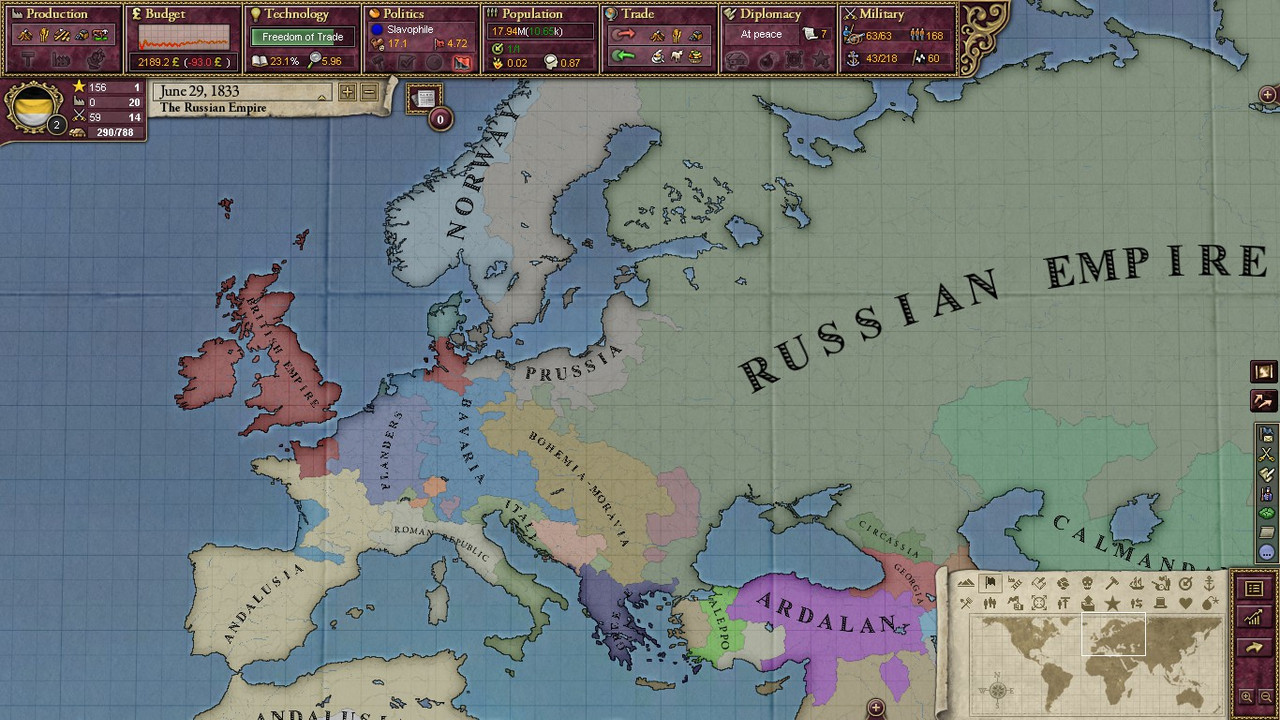
When Nicholas was 30 years old, Tsar Alexandr I Meri introduced him to the Royal Council. Nicholas arrived with his family in Saint-Petersburg on 15 November, 1832. The 60-yearsold Tsar didn’t feel well, so he wanted to prepare Nicholas for reign. Grand Prince Nicholas was obliged to coordinate military consumption for the western armies, located on the borders with Prussia and Bohemia. Tsar Alexandr I Meri caught a cold, inspecting the fortifications in Abo, a naval base in the Grand Duchy of Finland. He was dying, when he was arrived in Royal Palace. Advisors, cabinet ministers, courtiers and generals gathered in the General Assembly Hall under the shadow of turbulence. Heir was able to take power…. Tsar Alexandr I Meri died on 17 January 1833 after almost half-a-century reign. Common people were happy to the end of long and difficult reign. A new Tsar is inspiring hopes.
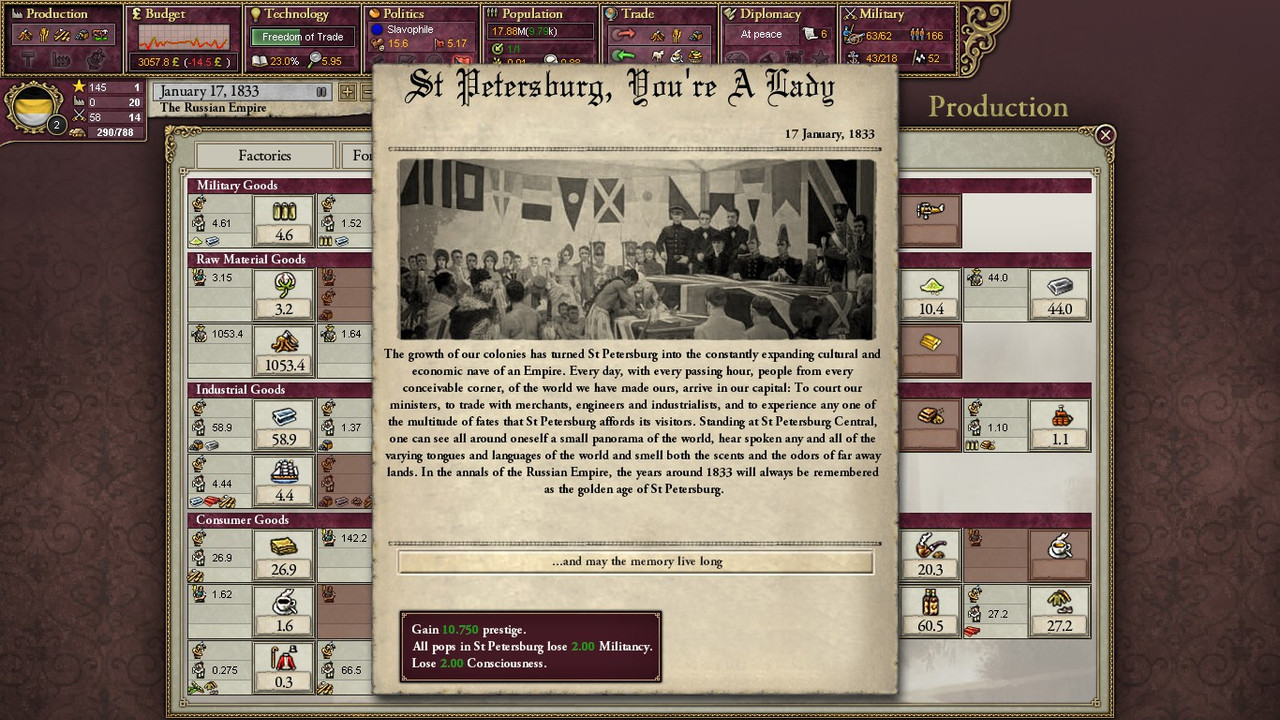
- 2
Chapter II. Reign of Nicholas I Meri (1833-1855)
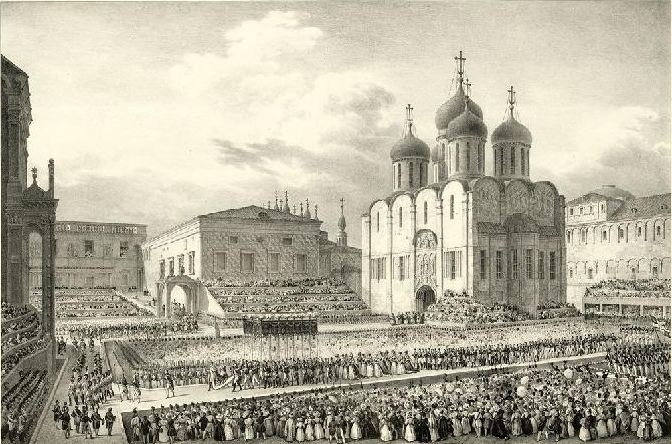
Grand Prince Nicholas Meri was crowned in Tver on 3 March, 1833. After the coronation Tsar moved to Timerovo, the shrine of the Meri’s. Despite Tikshayka II Meri (1110-1149) moved the capital to Moscow (1138 AD), the rules of Vladimir Kingdom, Medieval Suomenko Empire and then the Russian Tsardom had been buried nearby the Ancient Castle. Tsar Nicholas I Meri visited the graves of his father Alexandr I Meri (1771-1833) and grandfather Pyotr II Meri (1722-1784). It is interesting, that Pyotr I Great (1676-1710) and Aleksey II Meri (1710-1733) were buried in Saint-Petersburg, instead of Timerovo. New capital remains alien to the Royal House, being only a political center of the Russian Empire. Heart belongs to Timerovo and Tver.
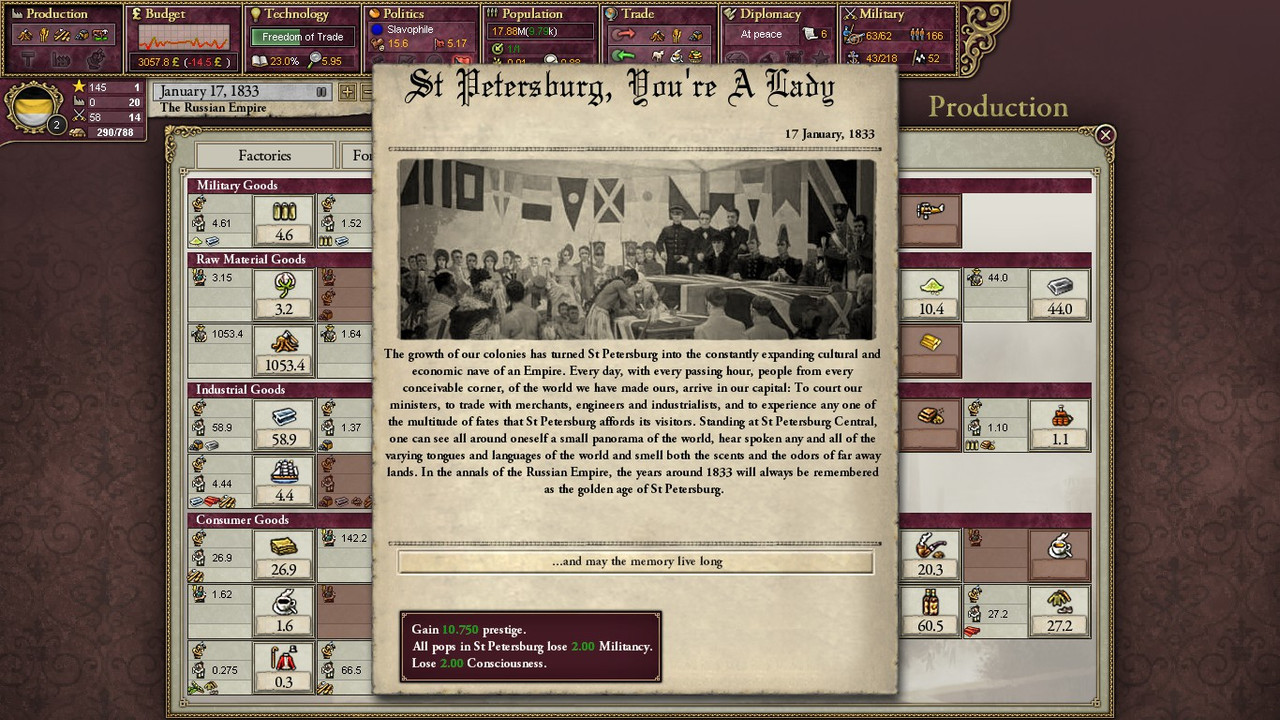
Royal escort went then to Moscow from Timerovo. Shortly before the accession of Nicholas, Moscow’s population has crossed point of 1 million people. City was still a capital of “Orthodox Russia”, while the state religion was Catholicism. Tsar met with the leading representatives of Upper classes: Landowners, Capitalists and the Officer Corp. Tsar promised for some kind of political easing and economic reforms. He understood social discontent with the “Ancient Regime”, powerful figures from different social classes desire for freedoms and rights. Initially Tsar enacted the decree of Trade Freedom later in the year. Trade envoys are allowed to cross the country borders without permissions.
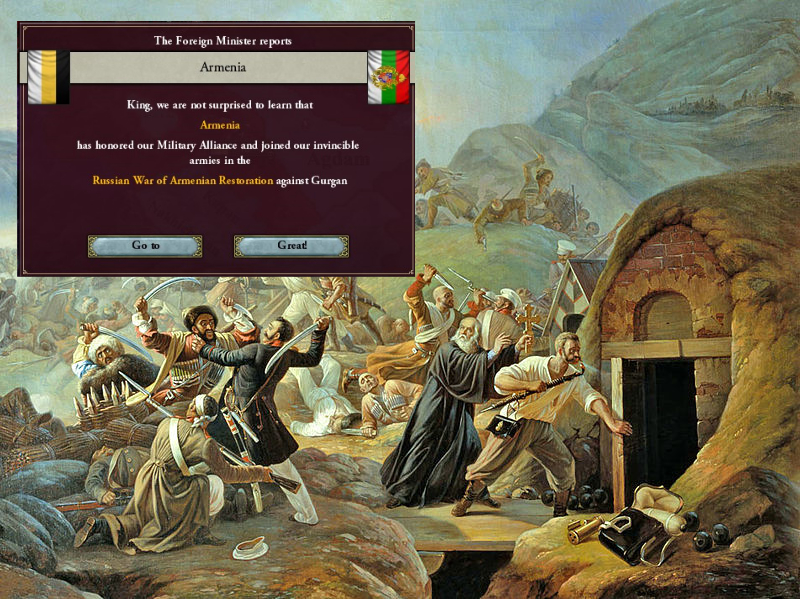
However, during next decade following the accession (1834 – 1844) Russia was engaged in few military and diplomatic conflicts on the border edges of the Russian Empire. At the end of 1834, Russia attacked the former Persian state of Gurgan to liberate the former Armenian territories. Armenia was a vassal of Russia. The Russian troops were fighting the Persians, forcing Gurgan to return some cored provinces to Armenia. Russia has earned the respect of the nations of the Caucasus.
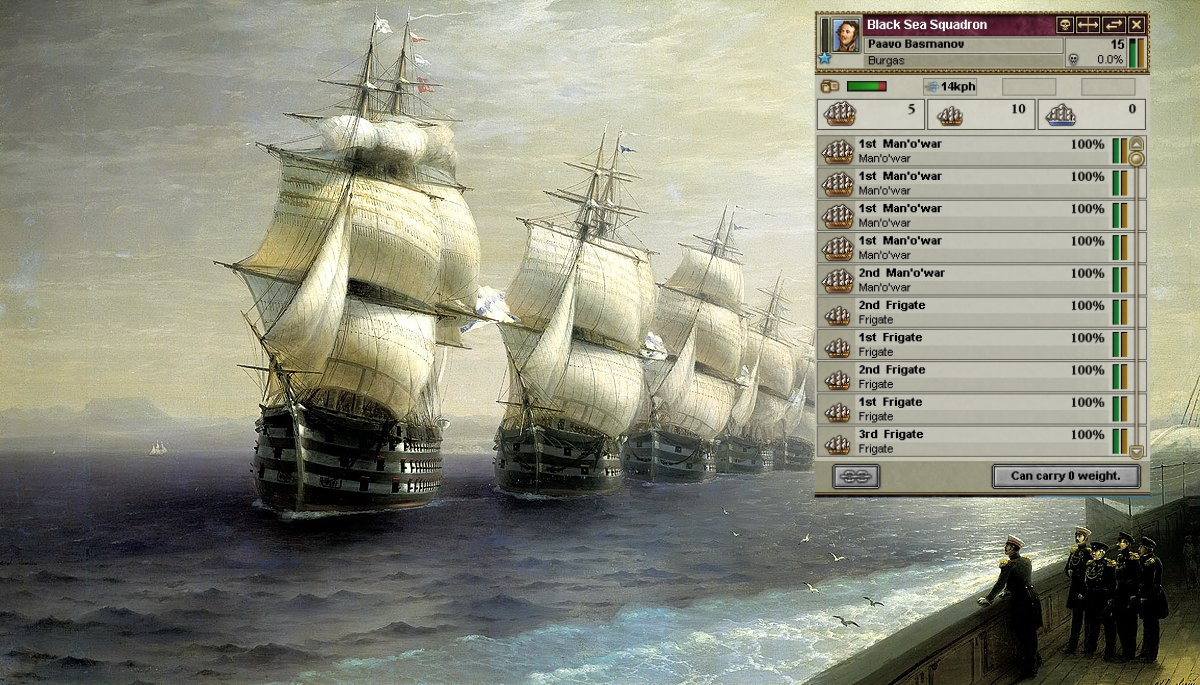
Areas of the Aegean Sea have become a flashpoint for the near decade. Diplomatic crisis occurred because of the tensions between Greece and Bosnia on 15 March, 1835. Tsar Nicholas I Meri preferred staying neutral. He tended to avoid huge military conflict with the European countries. Several years earlier Greece and Bosnia fought each other by resorting to the Russian Empire. During the First Greek war (1807-1810) the Russian troops liberated Greece from superior forces of Bosnia. In the years of the Second Greek war (1824-1826) the Russian participation was too extensive.
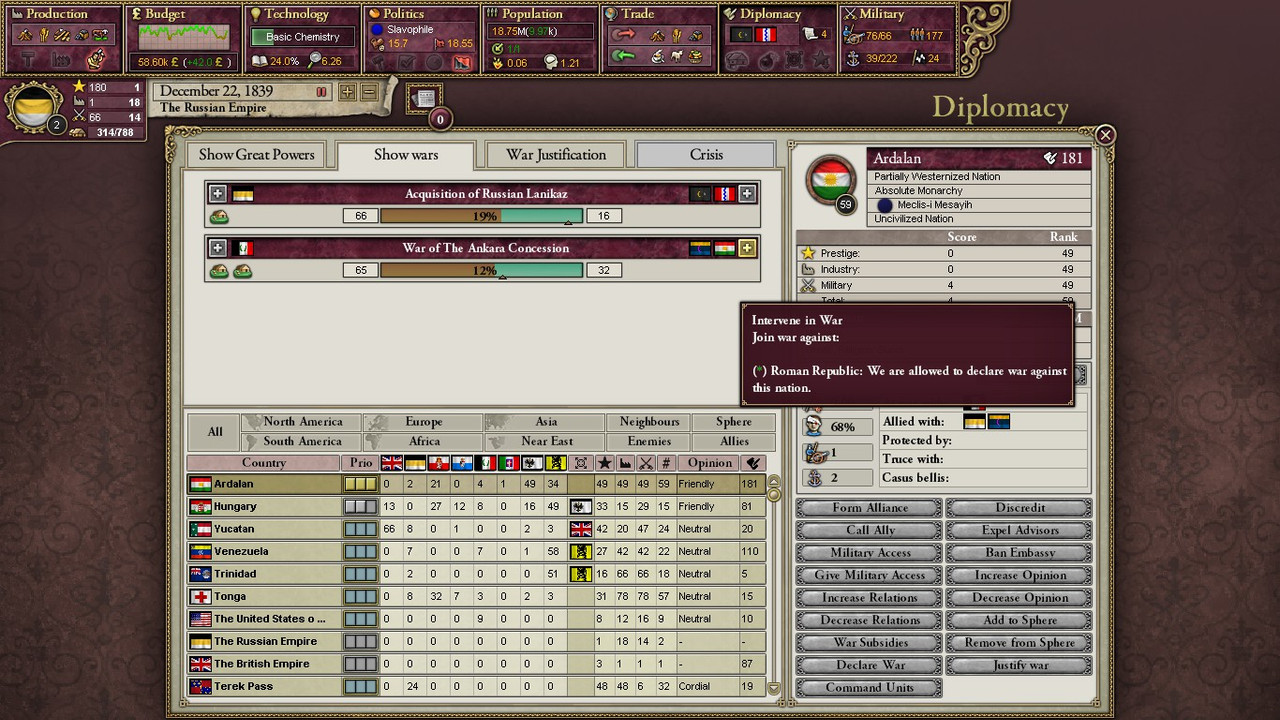
The Roman invasion of the Aegean islands occurred on 20 November, 1835. The Roman politicians drafted an ambitious plan for colonization of Anatolia, owned by Egypt. The Roman forces had conquered the quarter of Minor Asia despite protests of Russia from 1836 to 1839. The growing power of the Roman republic (former Papal State) threatened the Russian presence on the Balkans, so Russia once joined ongoing war between the Roman republic and Aldaran (11.12.1839).
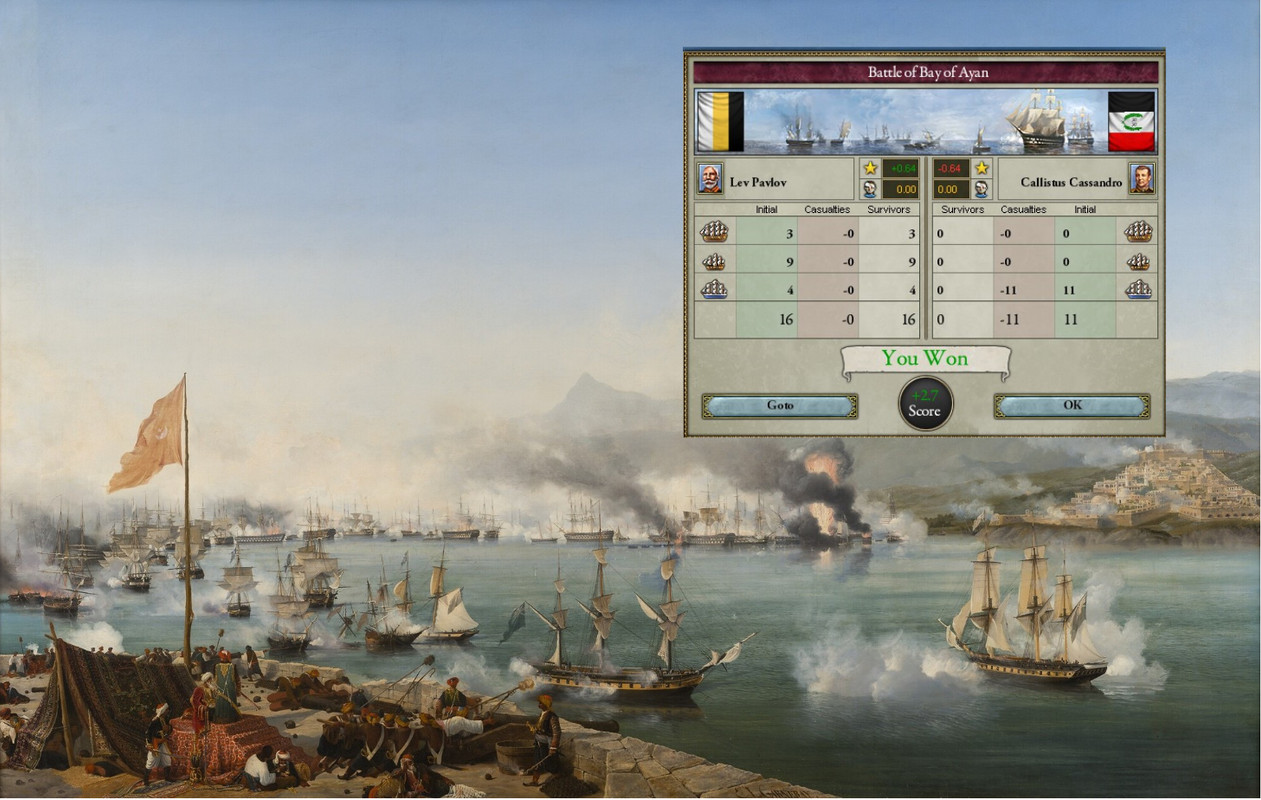
The Russian troops launched coordinate attack from three directions. Balkan army of 24 000 men moved from Constantinople, the 1st Caucasus army marched from Georgia, while the 2nd Caucasus army went from Armenia. The Russian troops were defeated at the first battle of Sivas, and general Pavel Shuvalov was forced to retreat back to Georgia. Ater filling supply and new recruitment the Russian armies come back to Aldaran. In the battles of Giserum (28 August 1840) and Sivas (10 November 1840) the Russian army, superior in number, launched a vigorous attack against the Roman positions. Next year the Roman troops were surrounded near Urfa. The Roman republic was forced to cede back occupied provinces to Aldaran and restore Turkey as an independent state.
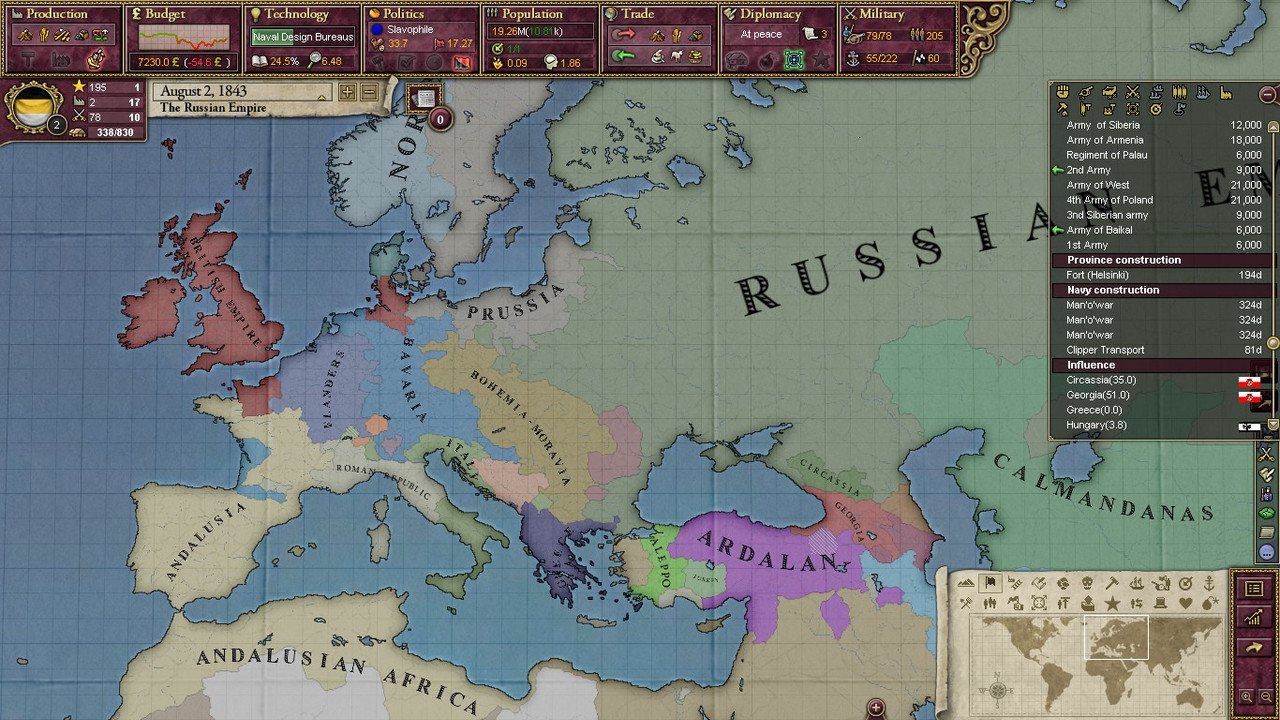
Peace agreement was signed on 10 June, 1843, and the Roman republic got out of the Minor Asia. The Russian Empire included Crete in the sphere of influence three years later. Naval base was founded on Crete to strengthen the presence of Russia in that region. Expeditionary Forces of 12 000 men landed in Crete. That was the coolest place to perform military service.
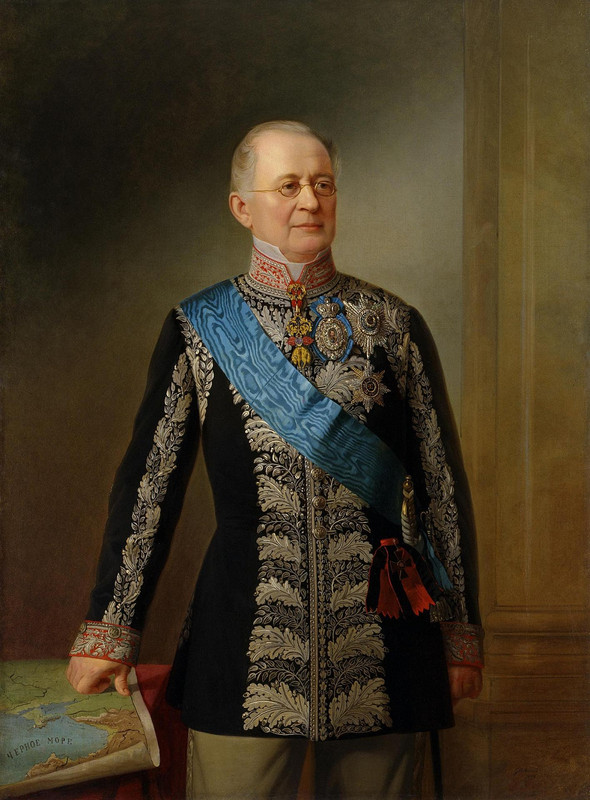
Military success opened a window of opportunity for institutional reforms in economy and a politics. Nicholas I Meri met with Alexandr Gorchakov, Minister of Interior Affairs, in the late of 1843. Gorchakov presented to Tsar reform project. Tsar understood the need for political and economic changes. Russia won the war with the Roman republic due to the superiority in number of troops. The Russian fleet couldn’t set sail, since navy had severe shortage of clipper supply, industry ceased to exist and government experienced a shortage of small arms, artillery and canned food.
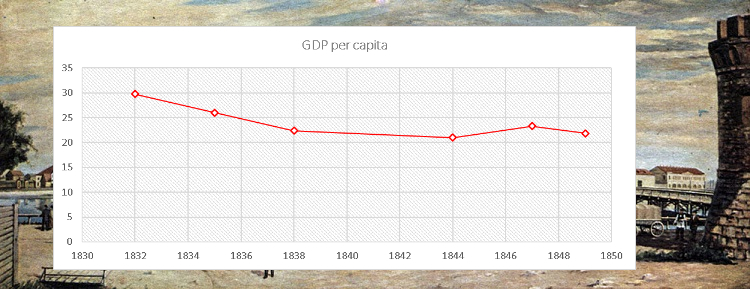
The Russian economy had been struggling from 1820 to 1844. GDP per capita decreased by 30% for 20 years, while other European countries faced industrial revolution and economic growth. There are no factories and railroads, but only outdated manufactories from 18th century. The Russian economy was the biggest, but extremely infective. Small distant military campaign in Anatolia caused heavy causalities and financial loses. Russia has huge foreign debt.
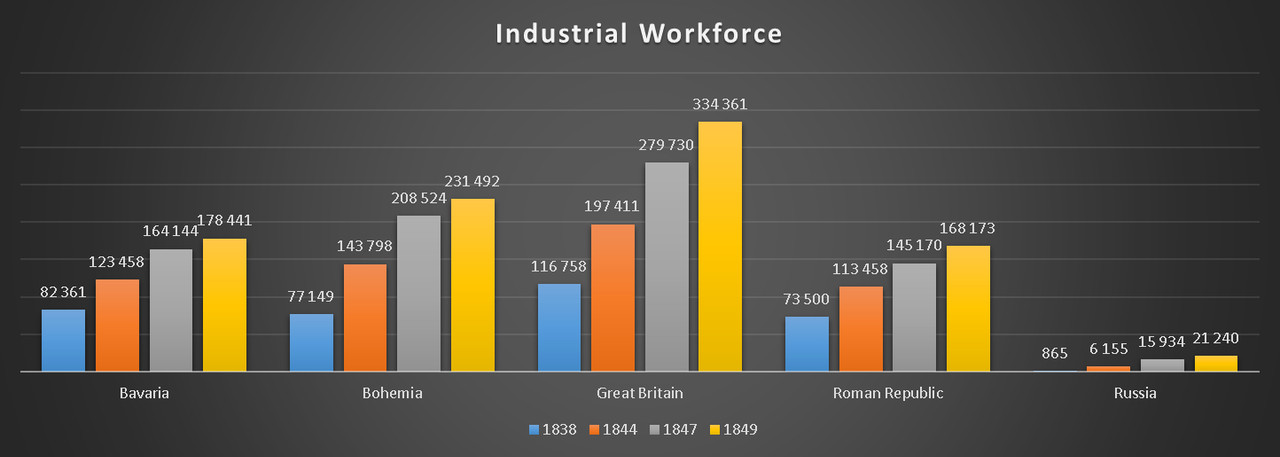
Up to the end of the 1840s Russia had only 20 000 workers in factories, while the European countries had more than 100 000 factory workers. Great Britain, Bavaria, Bohemia, Italy and Roman republic increased capacities and increased industrial output. See on the grath above.
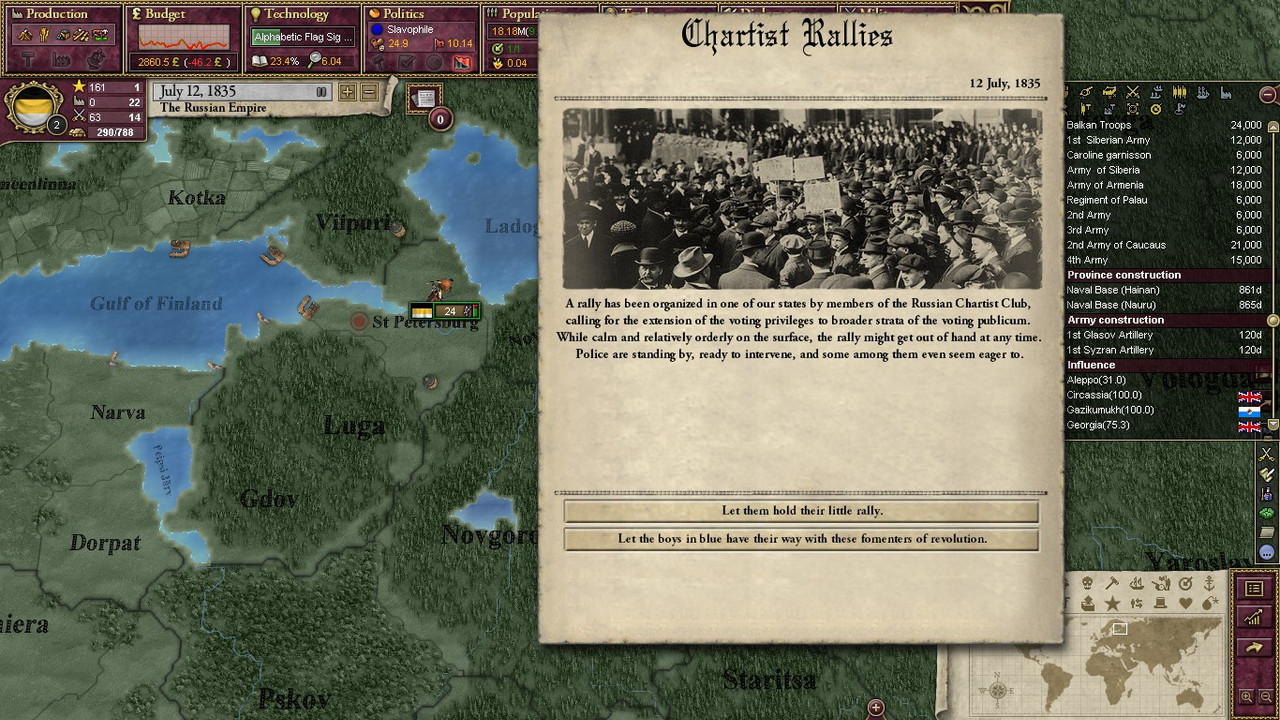
Ideas of liberty are gaining popularity throughout the country. Chartist movement grasped the country during the 1830s. Chartist rallies took place in the western provinces of the Empire (Poland, Lithuania and Baltic). Tsar Nicholas I Meri preferred not to smash rallies brutally as his father did. Thus, civil movement was not turning into full-scale armed resistance.

Start point has become a gathering of the Constitutional Convention on 12 June, 1844. Members of the Convention elaborated a draft for political reforms including election of the Upper House, permission for Public Meeting, and gradual thawing of press censorship. Tsar Nicholas I Meri approved the draft generously and the first election in the Russian history was held on 21 December, 1844. Seemed a distant dream of liberty began to fulfill…
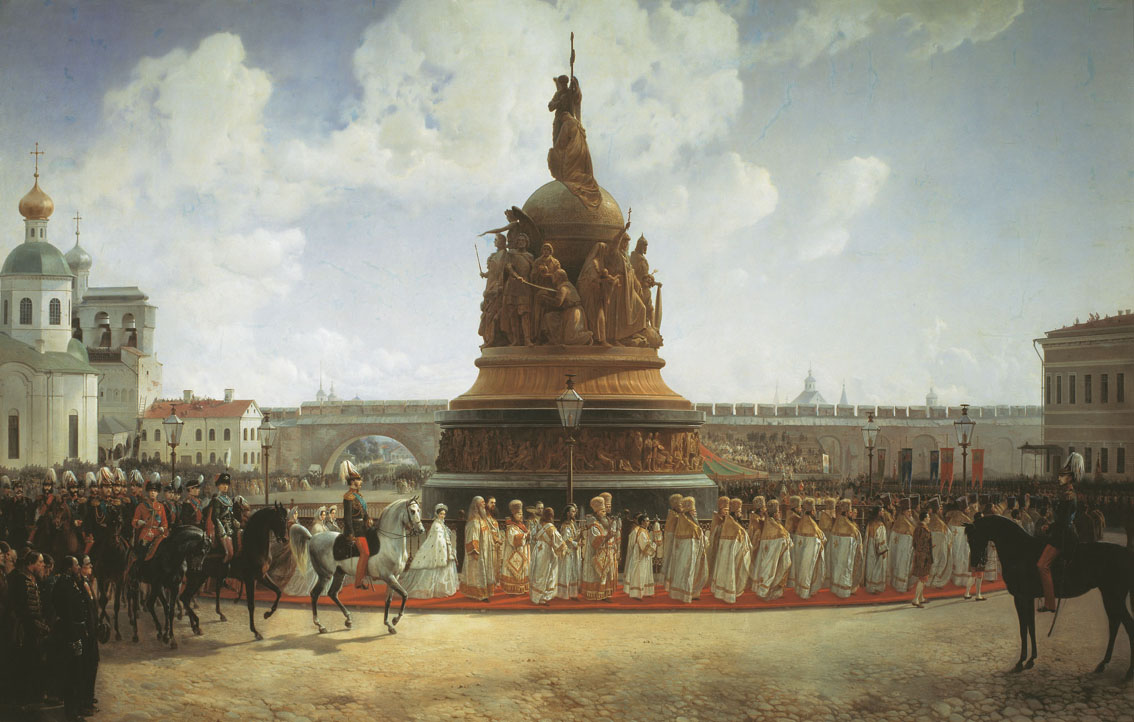
The first meeting of the Upper House was held in Saint-Petersburg Convention Center in February 10-24, 1845. The election results were following: Conservative – 48,46%, Liberal – 43,52%, Reactionary – 8,02%. Senate was elected only within landowners of 163 000 men (0,21% of the population of 77,429 mln. men). Most of them were the Russian Catholics, living in Moscow, Nizhniy Novgorod, Kharkov and Saint-Petersburg. The acted conservatively and didn’t share liberal thoughts of the government headed by Gorchakov. So, Gorchakov’s government focused initially of the economics. Government has launched construction of railroads to stimulate industrial development. Capitalists are given vast opportunities for business. They invest funds in factories, railroads, export-import transactions as well as government procurement. The Russian economy began to recover at the turn of 1850.
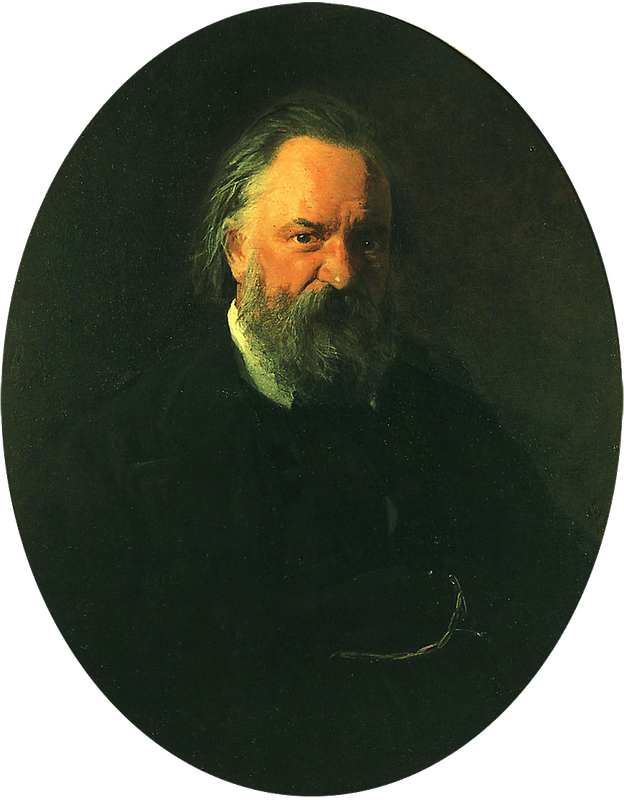
In the course of time landowners has become more liberal because of the drastic economic growth. Finally liberal faction got control over Senate in the end of 1848. Alexandre Herzen, a powerful landowner, was elected as Chairman of Senate. Decree of Public Meeting was enacted on 3 January, 1849 under his chairmanship. Next year a new immigration policy was adopted and borders of the Russian Empire have become open. Press censorship was eased in favor of education two years later in 1852.

Tsar Nicholas I Meri agreed on the autonomy of Poland on 20 June, 1846. Prussia faced growing national movement in Scandinavia. Danish and Swedish nationalists rebelled against the Prussian occupation and have gained long-desired independence. It is better to have a loyal puppet, than an evil enemy on the western imperial borders. However, Tsar denied a similar request from the finish representatives.
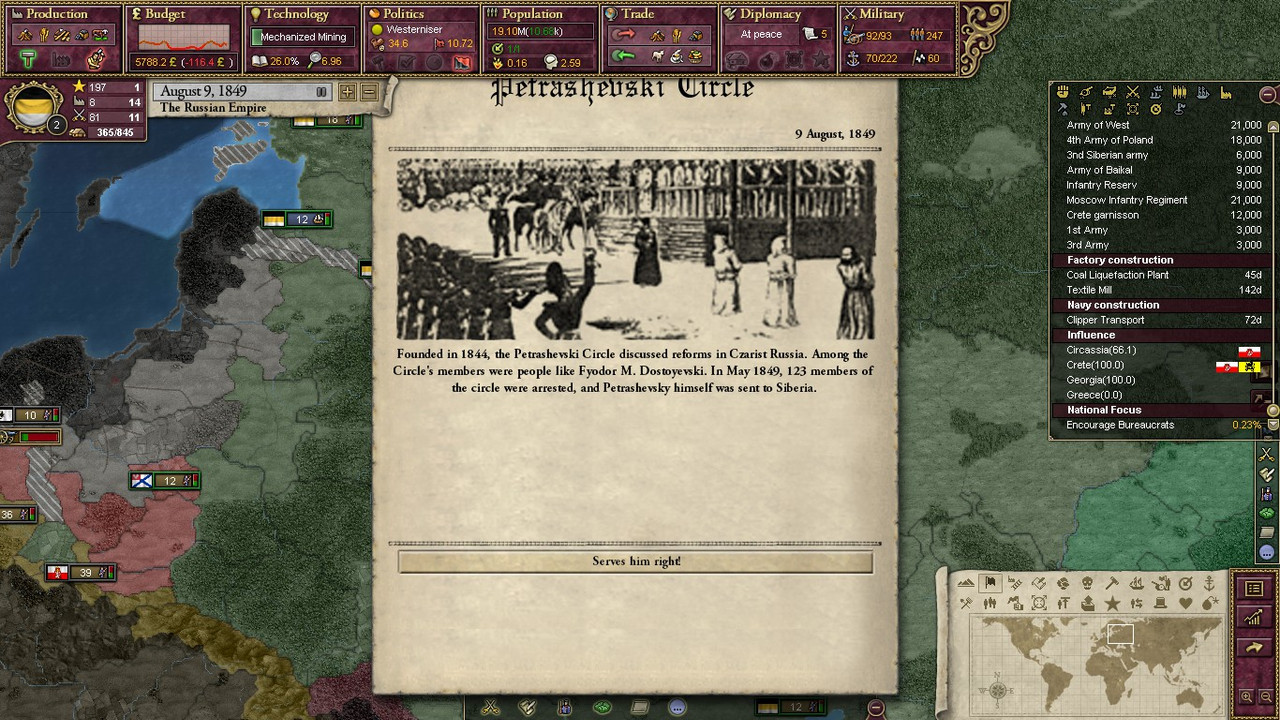
Despite the success of a new liberal policy, Nicholas I Meri began to curtail liberal reforms at the turn of the 1850s. Downfall of the Prussian absolute monarchy frightened the Russian elites. Society commended independence of Denmark and Sweden, but neither was prepared to accept revolution. Moreover, secret police discovered a conspiracy in Autumn 1849. Members of the so-called Petrachevsky Circle were plotting against monarchy to overthrown the Dynasty. They were executed by hanging….
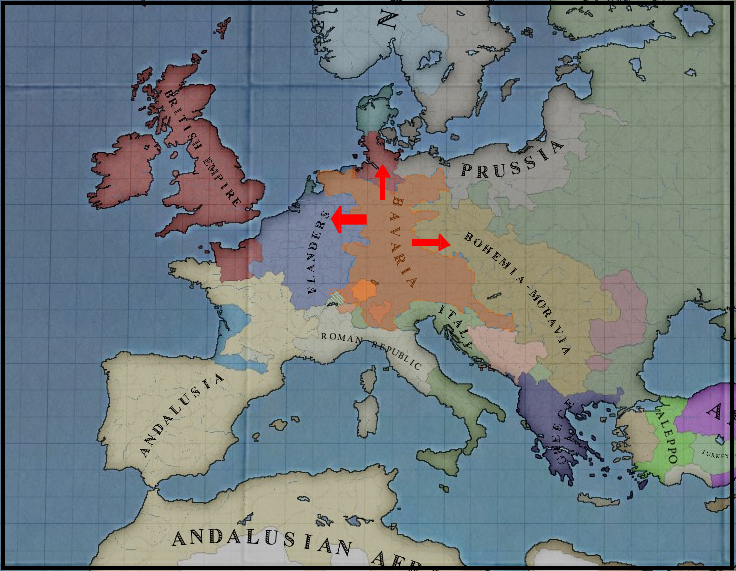
Bohemia, Bavaria and Prussia had been containing each other since the turn of 19th century. Prussia conquered half of Scandinavia and successfully opposed the Russian pressure. Bavaria has become an heir to Greater Bavaria, a medieval fell kingdom which was conquered by West France. West France was destroyed by Holy Catholic League at the turn of 17th century. Mecklenburg, Papal state, Bavaria and Russia broke West France. Protestant Bohemia established itself as a strong independent state in the end of 17th century after a series war conflicts with Mecklenburg, Prussia and Hungry.
Great Britain had provinces in the North Germany, that had been conquered in the mid-17th century. Prussia defeated Great Britain in the war of 1752-1762, and the British expansion was stopped. Great Britain had military alliance with Bohemia against Prussia and Bavaria. Bavaria allied with Bosnia, while Bohemia supported Greece. Flanders had no allies. The Russian Empire was mainly indifferent to the European deals. Alexandr I Meri as well as Nicholas I Meri rejected all proposals for military alliance from Flanders, Great Britain and even Bavaria. Tsar understood that Russia will not benefit from the European wars but only lost.
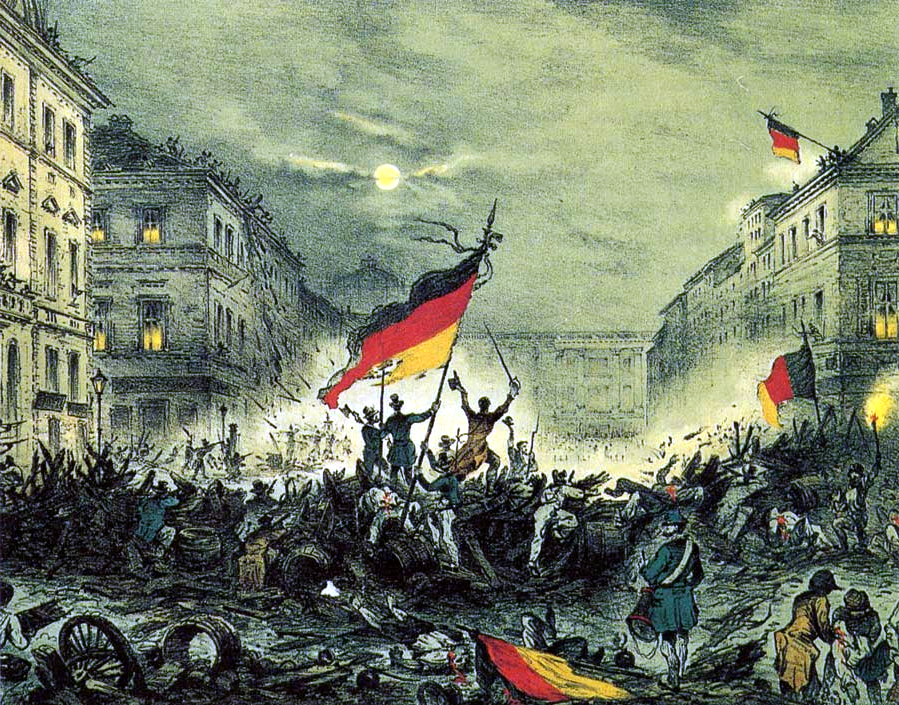
Everything has changed after the collapse of Prussia in 1850, balance of powers was breaking down. Bavaria managed to include collapsed Prussia into its sphere of influence and began to gather the German lands. Firstly, Bavaria made assault on Flanders that had no allies. Regions of Rhein and Westphalia were conquered without any resistance. Then Bavaria attacked Bohemia allied with Great Britain. Modernized and high trained army smashed week forces of Bohemia and Great Britain. Bohemia cedes the western provinces to Bavaria. Losing the war has caused the revolution in Great Britain. After five years of internal fighting Queen Victoria was forced to declare Constitution. Fall of the most developed power has led to worst world economic crisis 1855 – 1870. Thus, the only country had ambitious to form Germany – Bavaria. Russia remained neutral during the expansion of Bavaria and did not belong to any military alliance.
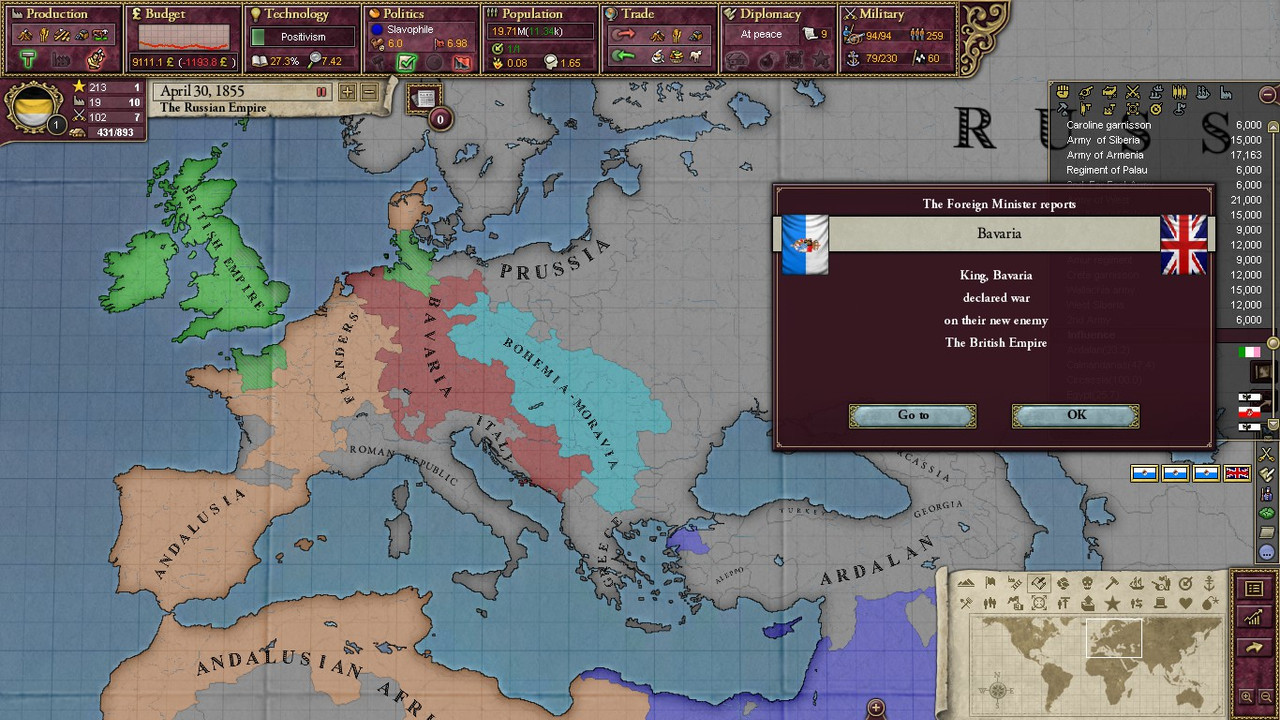
Death of Nicholas I Meri
Nicholas I Meri got cold in February 1855, while he was inspecting forts of Kronstadt. 44-years-old Tsar fell ill and his condition quickly deteriorated despite the best efforts of royal physicians. Death of beloved ruler has shocked the Russian society. Reign of Nicholas I Meri (1833-1855) is evaluated positively by modern historians as well as contemporaries. He managed to reform political system, initiate important social changes and lay foundation for industrialization. Russia avoided violent uprisings and revolution due to the peaceful changes produced by liberal government. The granting autonomy to Poland decreased successfully flashpoint on the western edges of the Imperial borders. Foreign policy was reasonable, due to prudence and precaution, which should govern any wise ruler. The Russian Empire expanded to include lands on the Far East and Siberia. Despite few offers from Flanders, Great Britain and Italy, Russia had not entered any military alliance and avoided major war. Nicholas I Meri was buried with honor in Timerovo on 13 March, 1855. His oldest son Alexandr was only 28 years old. He will succeed the Russian Empire.
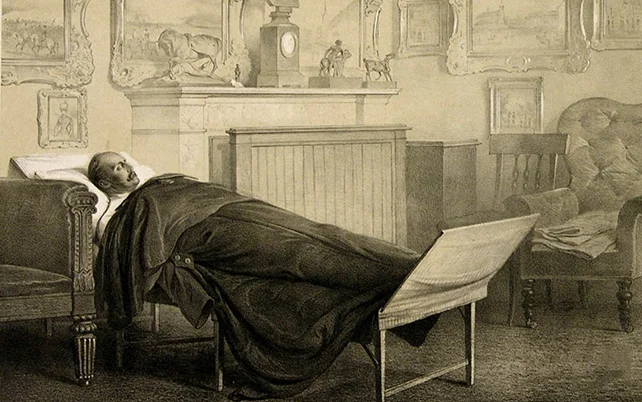
- 1
World in 1870
Chapter III. Reign of Alexandr II Meri (1855-1870)
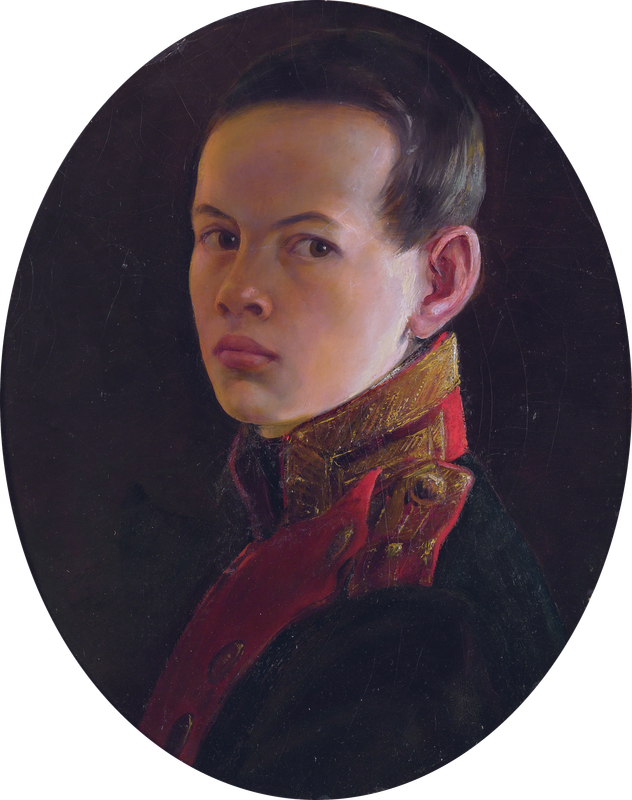
Alexandr II Meri was born on 25 April 1827 in Constantinople, where his father Grand Prince Nicholas served. He got excellent home education and was enrolled at the Academy of Military Service in 1844. Alexandr was conscripted at acting army after graduation. During the war between Russia and Egypt Grand Prince Alexandr was fighting under the command of General Chibisov. He served at Expedition Corp and took part in few battles near Damascus. At the battle of Angus Grand Prince Alexandr was in the command of a cavalry regiment. After the war Alexandr was awarded by medal for honor.
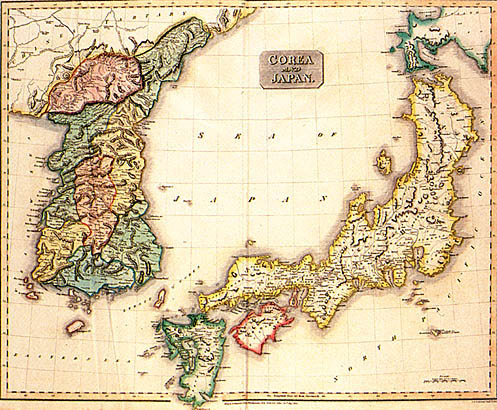
Tsar Nicholas I Meri introduced his son to the Royal Council, as his father did before. Tsar sent him to Japanese archipelago to conclude military alliance with Ouchi in 1854. Ouchi has become a civilized nation shortly before, so the Russian Empire wanted to enlist the support of this emerging Asian nation. Russia had plans for the conquest of the Manchurian lands (Baikal region, Sakhalin, and Okhotsk Sea), Diplomatic mission was successful and alliance between Russia and Ouchi was concluded. Grand Prince Alexandr has crossed all the country from Saint-Petersburg to Okhotsk port. He was the first Meri’s, who observed entire country and reached the Pacific Ocean.
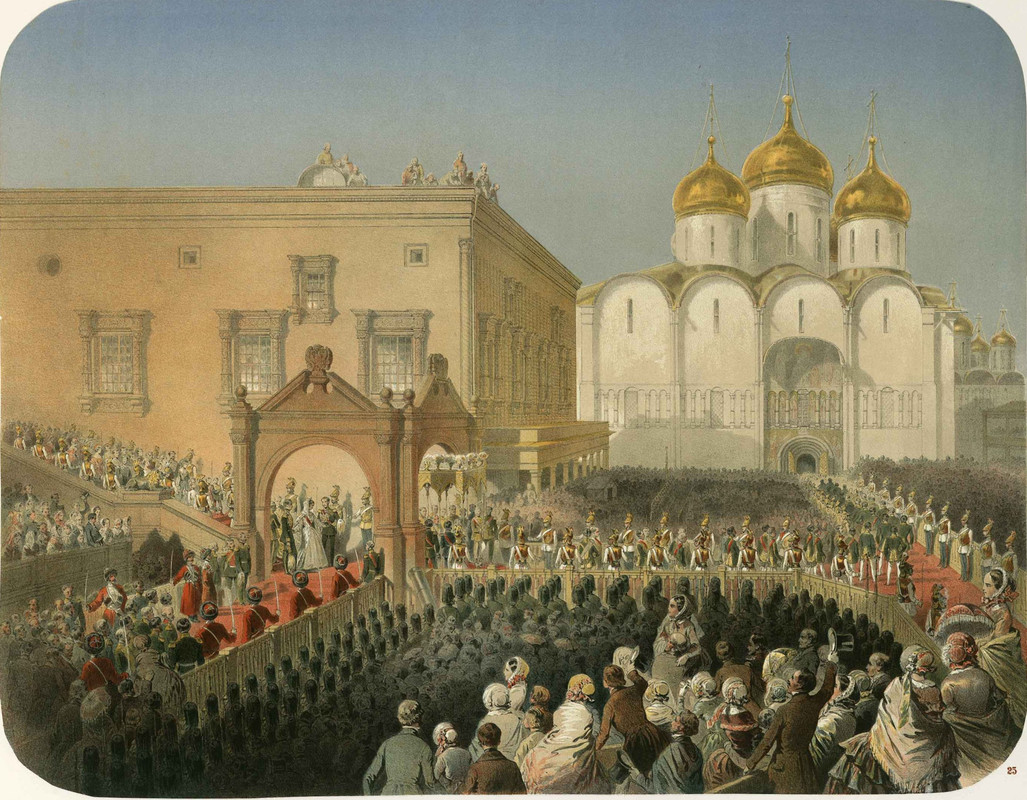
Alexandr spent three months on the Far East and came back to St. Petersburg in February 1855. Turkey, the Russian ally in the Minor Asia, declared war on Aleppo, so Alexandr was going to be a military adviser at the Turkish army. Russia supported Turkey, a new nation, that become independent in the 1830s. That was only republic which the Russian Empire supported. But the Russian Tsar Nicholas I Meri (1833-1855) died and Grand Prince Alexandr Meri succeded to the throne of the Russian Empire. Alexandr II Meri was crowned in Timerovo on 14 May 1855.
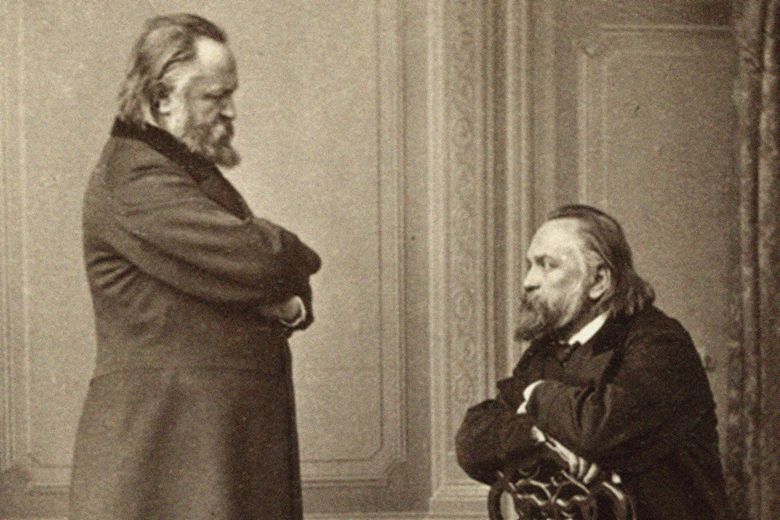
Alexandr didn’t share liberal believes of his father, he was a highly conservative man. He rejected any moves to set up a parliamentary system that would curb his powers. Chairman of Senate Alexandr Herzen annoyed Tsar and lot of people in the Royal Court with his special behavior. Herzen was an important agent of changes for political easing and western modernization. He insisted on the fact, that an increasing number of countries have adopted constitutional forms of government. Russia should join them peacefully but not via violent uprising. The standoff between the Crown and Senate headed by Alexandr Herzen lasted for 3 years and ended with the victory of Tsar. Herzen was forced to leave country and move to the United Kingdom in 1858. He was blame for treason.

Tsar was a principal ideological opponent for the liberals. He believed that revolutions in the European countries (1850 – Prussia, 1856 – United Kingdom, 1859 – Bohemia) have become a threat to the Russian Empire. Proponents of westernization pointed out that Bavaria, a growing power, adopted a constitution voluntary. King Leopold II of Bavaria agreed on political reforms and escaped from civil disorder and violence. On the contrary, Prussia and United Kingdom faced turmoil and fell in collapse for a while. Prussia lost its status of Great Power and Bavaria included the country into the sphere of influence. United Kingdom happened to recover and continue economic development, which was interrupted by unsuccessful war and subsequent bankruptcy of 1869.
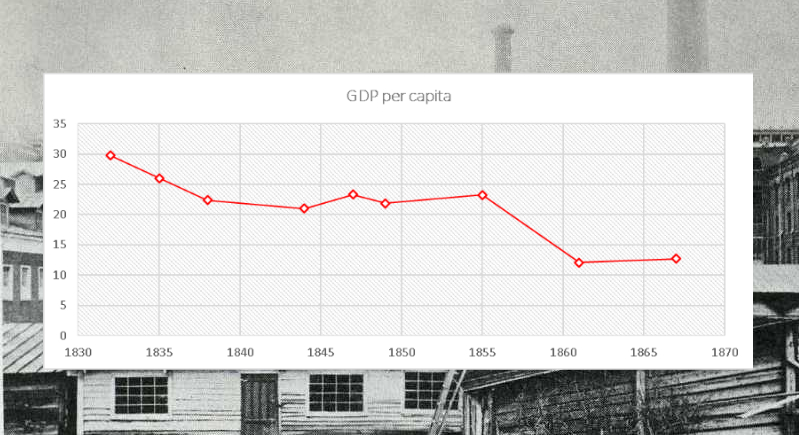
Alexandr II Meri ordered to adopt a new policy Military-Industrial Complex in 1858. He truly believed Russia has to rely on public sector more than private business. New Conservative government launched naval construction program, development of war-related production and factories building. Early Railroads were started to build in the Russian Empire in 1862. However, aggressive policy of Bavaria and collapse of the UK had devastated world economy and had taken a heavy social toll. The Russian Empire faced 10-year economic crisis from 1855 to 1865. Demand for raw materials from Russia dramatically declined, leaving thousands of laborers unemployed. Conservative economic policy based on public sector failed, public debt had reached roughly 1.5 Mln pounds… financial situation was grave. New factories had shortage of workforce, qualified clerks, and imported raw materials. Factories were inefficient and not able to substitute craftsmen, who were struggling under economic crisis.
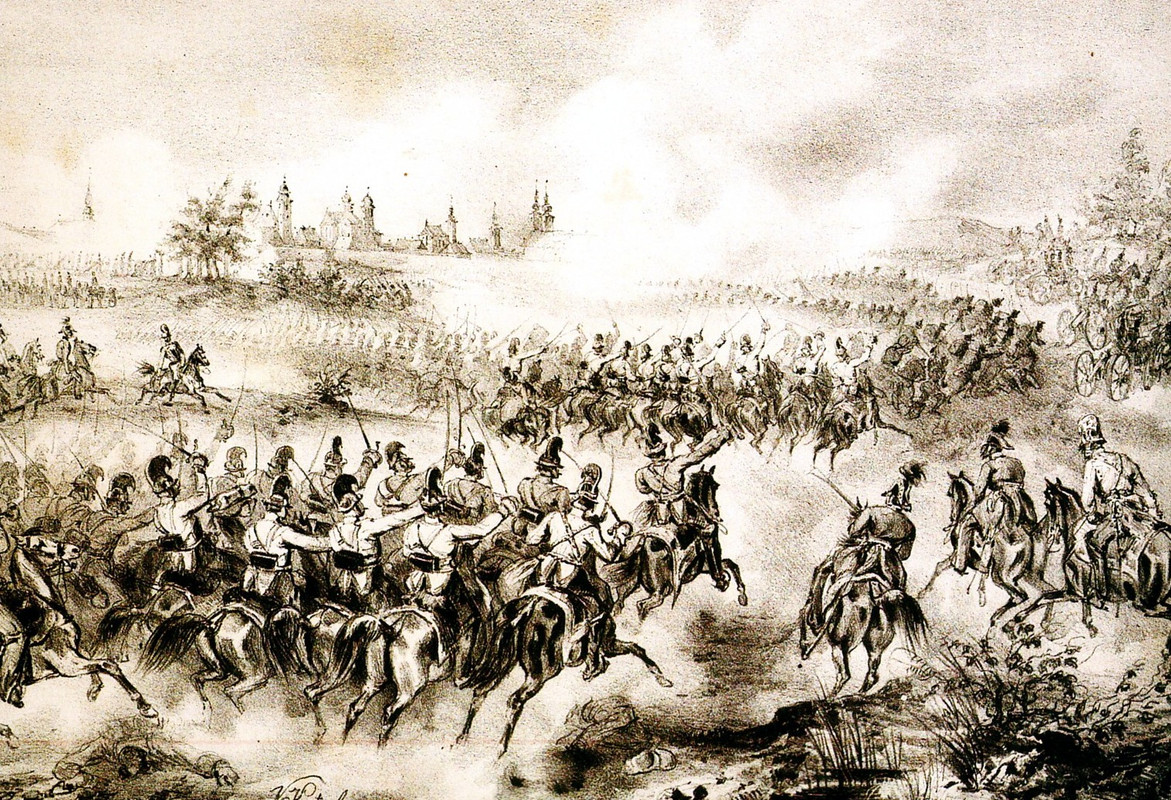
Deterioration of national economy has inevitably led to drastic social tensions, that are degenerating rapidly into a crisis. Civil war broke out in Hungary, the country was included in the Russian sphere of influence shortly after the collapse of Prussia. The Hungarians desired freedoms and political rights, but the Russian Tsar Alexandr II Meri sworn to suppress any revolutionary movement "wherever the occur". The Russian troops occupied the country and hashed repeating uprisings in Hungary.

Major uprising occurred also in Thrace in 1863. Governor-general Kuropatkin was assassinated in Constantinople, after that the Greek rebellion broke out throughout the region. Rebels sieged local cities and blockaded the Russian garrisons. Tsar ordered military forces to disperse the crowds and suppress the rebellion. By August 1863, the riots were suppressed. Three years later a violent break down of civil demonstration occurred in Brest. Dozens of people were injured after the disperse of peaceful demonstration.
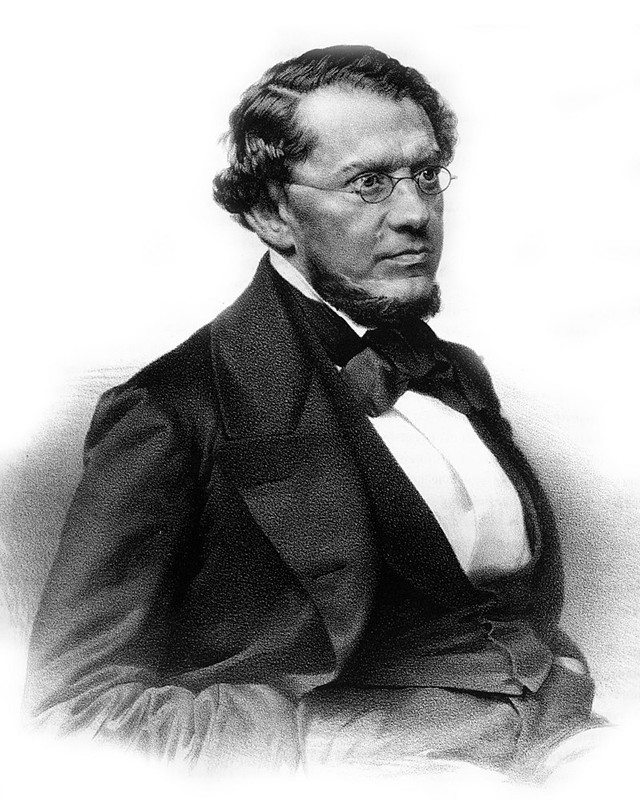
Civil disorders coupled with economic crisis had provoked a heightened Government crisis, which paralyzed the Upper House. And as a consequence, the liberals gained control of Senate and forced Tsar to assign a liberal Minister Cabinet. Influential intelligent Konstantin Kavelin formed government, after taking the office he presented to Tsar a plan for financial recovery. He proposed government to cut expenditures and reform tax system in order to balance budget. Tsar approved the financial plan, but rejected any ideas of political liberalization and economic nationalism. The Kavelin’s reforms slightly improved financial situation, however, budget debt remained a huge (1 450 434 pounds – 1870).
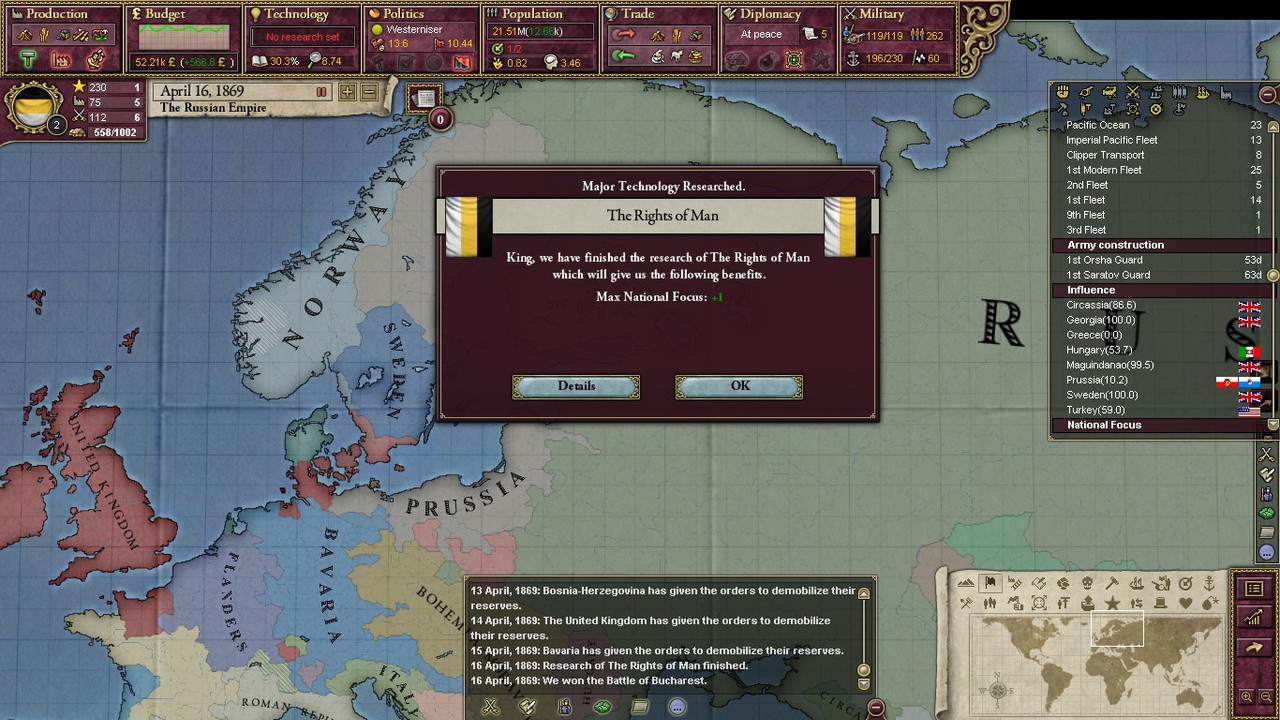
Growing popularity of liberal ideas caused the change of internal policy. Tsar Alexandr II Meri finally ratified the Declaration of The Rights of Man on 16 April, 1869. The Russian Empire got additional National focus, which was aimed at promoting workforce in the country. By taking this step, Tsar improved Crown reputation, tarnished by bloody suppression of rebellions and dispersals of demonstrations. Unfortunately, state policy continued to be oppressive. Next chapter you will see, how the "Hungarian Question" has led to major war in Europe.The desire to extinguish the flame of revolutions prompted Alexandr II Meri to conclude millitary alliance with Bavaria and declare war on a neighboting country...

- 1
Chapter IV. Reign and death of Alexandr II Meri (1870-1882)

The Russian Empire entered the 1870s as a strong, but internally unstable state. Tsar Alexandr II Meri, by violence and cunning, managed to overcome the liberals in the previous decade. Progressive institutional reforms of his father Nicholas I Meri (1833-1855) had been curtailed, and the conservative circles within the Court imposed the policy of oppression and exploitation of the common Russians. But unfortunately for Tsar, the conservative policy met strong opposition from the left in the coming decade. Up to the end of the 1860s, the socialists were to be elected in the Senate. They called for Base School System, Restriction of Child Labor and Minimum Wages on the factories. Many of them shared the liberal agenda of Free Press and Landed Vote.

Socialist’s share in the seats of the Upper House has raised significantly from 8,5% to almost 20% for ten years. Gradually the socialists were becoming more and more radical because of suppression from the tsarist’s regime. Ideas of Karl Max were gaining popularity among intellectuals, clerks and workers at that time, and the communists began to be elected in the Senate from 1876. Crazy landowners and capitalists called for expropriation of private property. That was sheer madness!
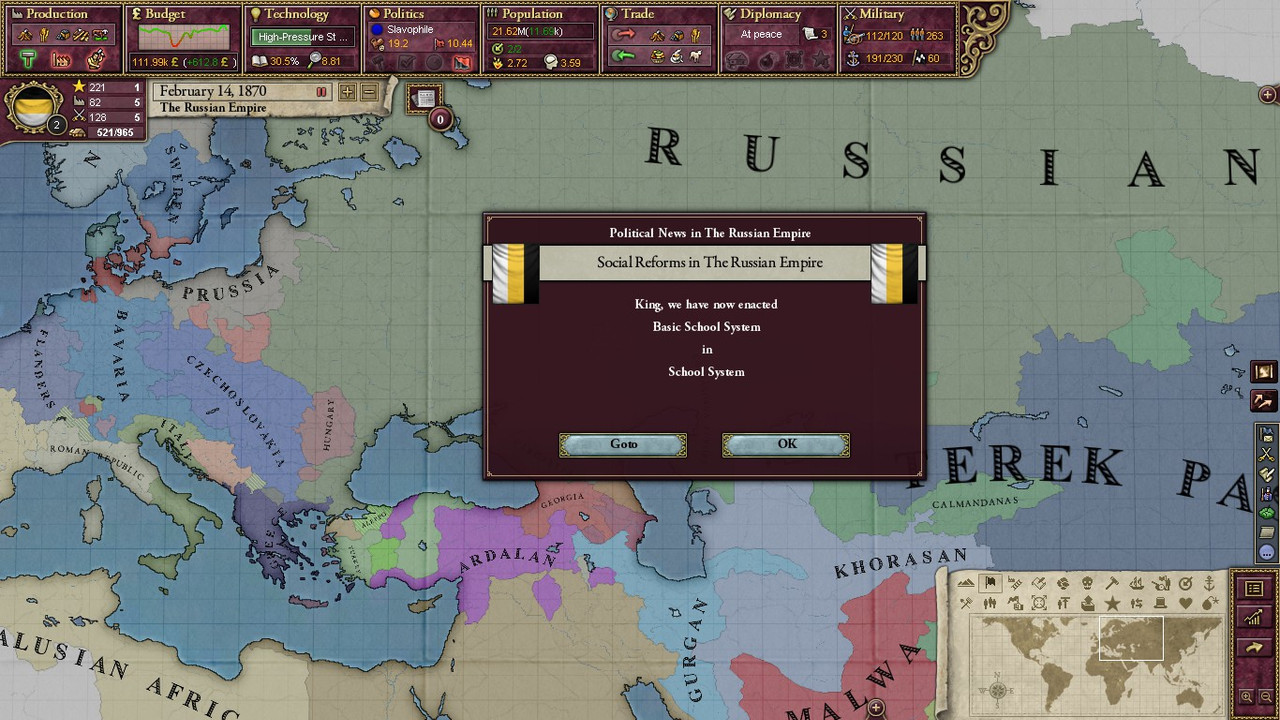
Government sometimes made concessions toward the socialist movement to prevent civil disorders. Base School System was introduced to promote literacy in Russia on 17 February, 1870. Russia had one of the lowest literacy rates among the European countries (below 30%), this hindered economic growth and technological development. The Decree of Child Restriction on the plats and factories was passed by the Senate six years later on 16 April 1876.

Tsar Alexandr II Meri agreed on some sort of social reforms, including education and easing of working conditions on production. But he fiercely rejected any attempts to challenge the Absolute monarchy. Prosecution of opposition, militarism, suppression of peaceful protests and strict press censorship continued all the years of Alexandr’s reign. Vote rights were limited by only 6 000 men from almost 21.6 million people, living in the Russian Empire. The Russian wealthy catholics called also for the establishment of more just State where oppression and social injustice will not exist. Almost 24% of them favoured the restriction of Child Labor, while other 21% campaigned for liberal reforms of extension of Vote rights and Free Press.
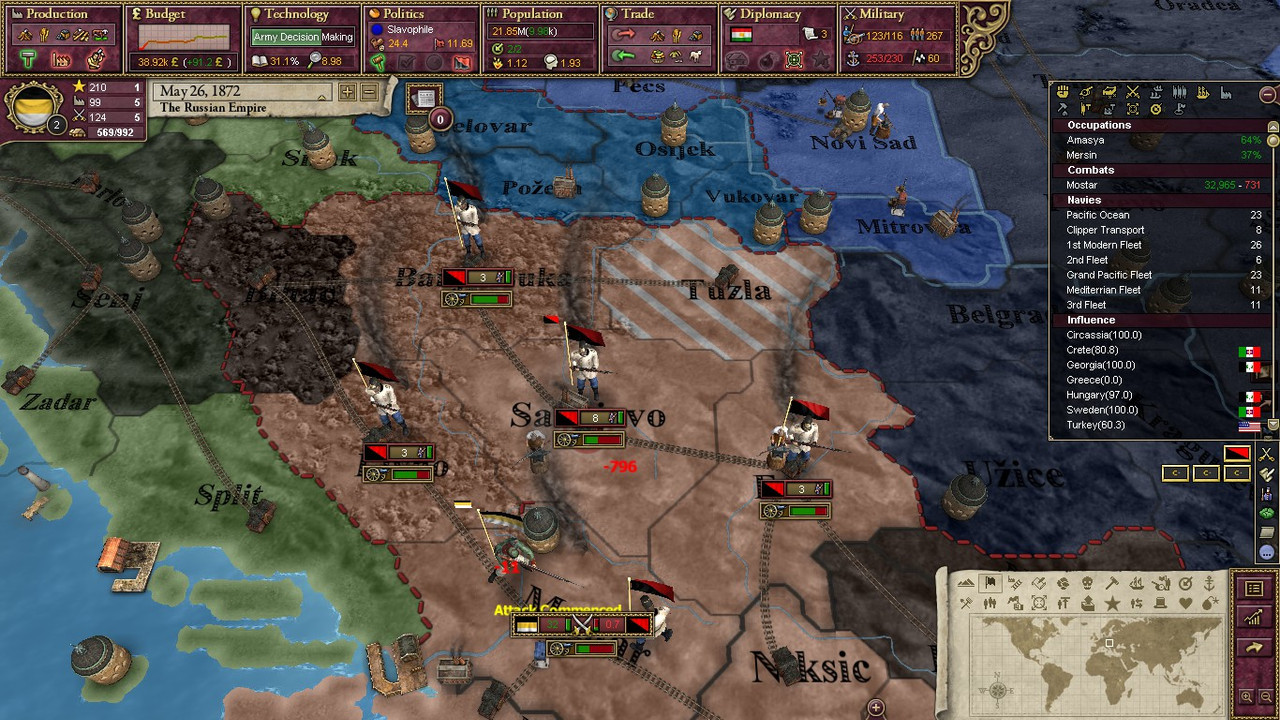
The Russian Empire suppressed national and liberal movement inside the country as well as abroad the Empire. Revolution attempts in Bosnia and Hungary were smashed cruelly and downed in blood in 1872/1873. Monarchic regimes in Sweden, Bosnia, Hungary and Georgi were supported merely by the Russian soldiers. Alexandr II Meri earned the nickname of “Gendarme of Europe” for reactionary policy based on suppression of national movement in other counties.
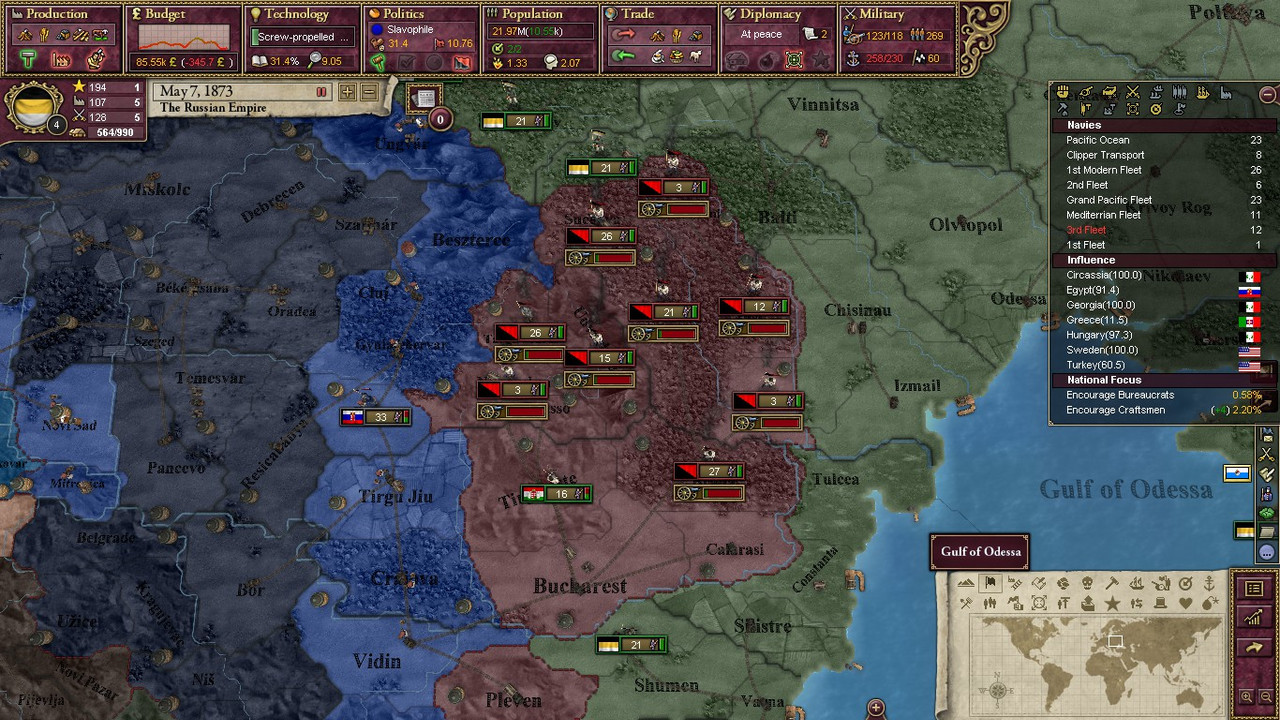
Some royal advisors felt that “Hungarian question”, the problem of repeating uprisings in Hungary, could be partly solved by “a small victorious war”. Bohemia owned a few cored provinces of Hungry. After the victorious war with Bavaria, King of Bohemia declared the foundation of a new state – Czechoslovakia (7 July 1869). Bavaria and Russia concluded a military alliance in response, that shocked the whole Europe (16 September 1869). From the accession Alexandr II Meri has been focused on military development. He introduced new types of military units (Engineer Corp – 1860; Guard Regiment – 1866; Four Years Draft - 1867, Breach-Loaded Rifle Regiment - 1868), improved army professionalism (Decision-making process – 1873), developed Navy forces (Steam frigates – 1860, Monitors and Ironclads – 1879). The Russian Empire seemed to have a high-trained army coupled with impressive Maritime force.
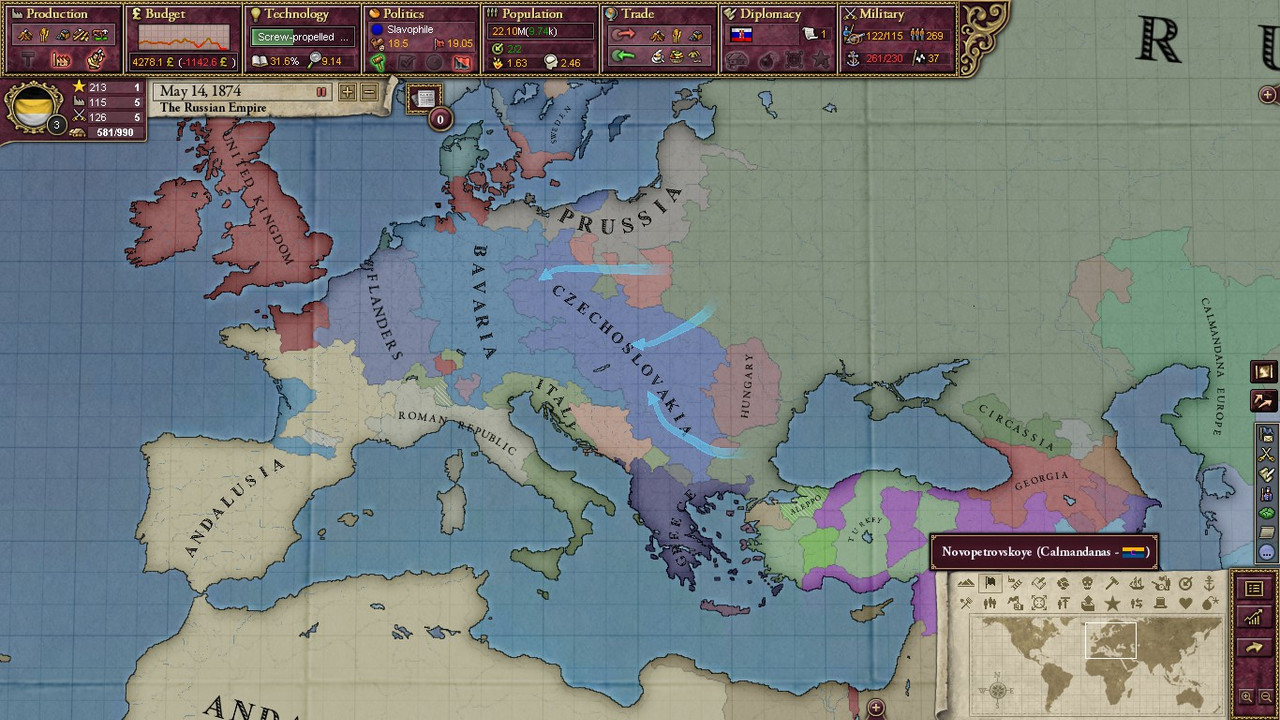
Bavaria had the second greatest land army in the Europe. Modern economy and political system of Constitutional monarchy, which had been adopted peacefully by King, all of these made Bavaria a powerful state. The Kingdom had ambitions to unite Germany, having won a set of wars Flanders, the United Kingdom, Prussia and Bohemia. There are only a few steps to unite Germany, and Russia joined the game on the side of Bavaria. The Balkan War started in 1874 and lasted for two years. The Russian army invaded Czechoslovakia from two main directions: Hungary and Poland, while the Bavarian forces fought Expeditionary Corp of the United Kingdom in the North Germany. Military plan was to fast smash the troops of Czechoslovakia and then occupied the British provinces on the continent.
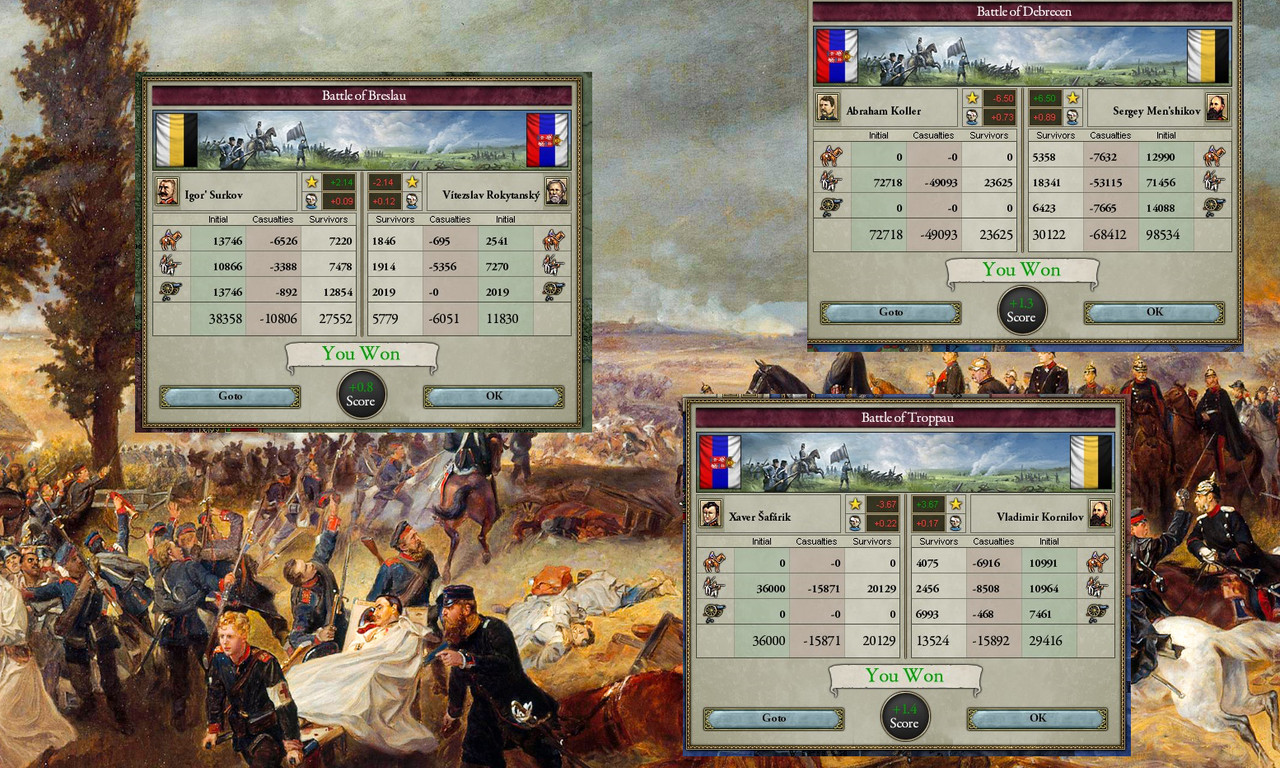
Initial success of the Russian army has turned into disaster. After a series of bloody battles (Battle of Breslau – losses of 11 000 men; Battle of Troppau - losses of 16 000 men), the Russian troops were forced to retreat. The force of Czechoslovakia fought bravely against the invaders and gave them a powerful rebuff. The Russians had extremely heavy causalities, thus Alexandr II Meri had to call for mobilization. The Hungarians rebelled behind the Russian armies, more than 70 000 peasants, citizens and solders attacked local garrisons all the country. Professional troops acted on the front, so the uprising has spread to most of Hungary, the rebels seized cities and small forts. Mobilized solders, who were untrained and poor-armed, slowly droved back the rebels, despite being outnumbered. The Russian troops were fighting war on two fronts from Herbst 1874 to Summer 1875, that was draining the energies of army.
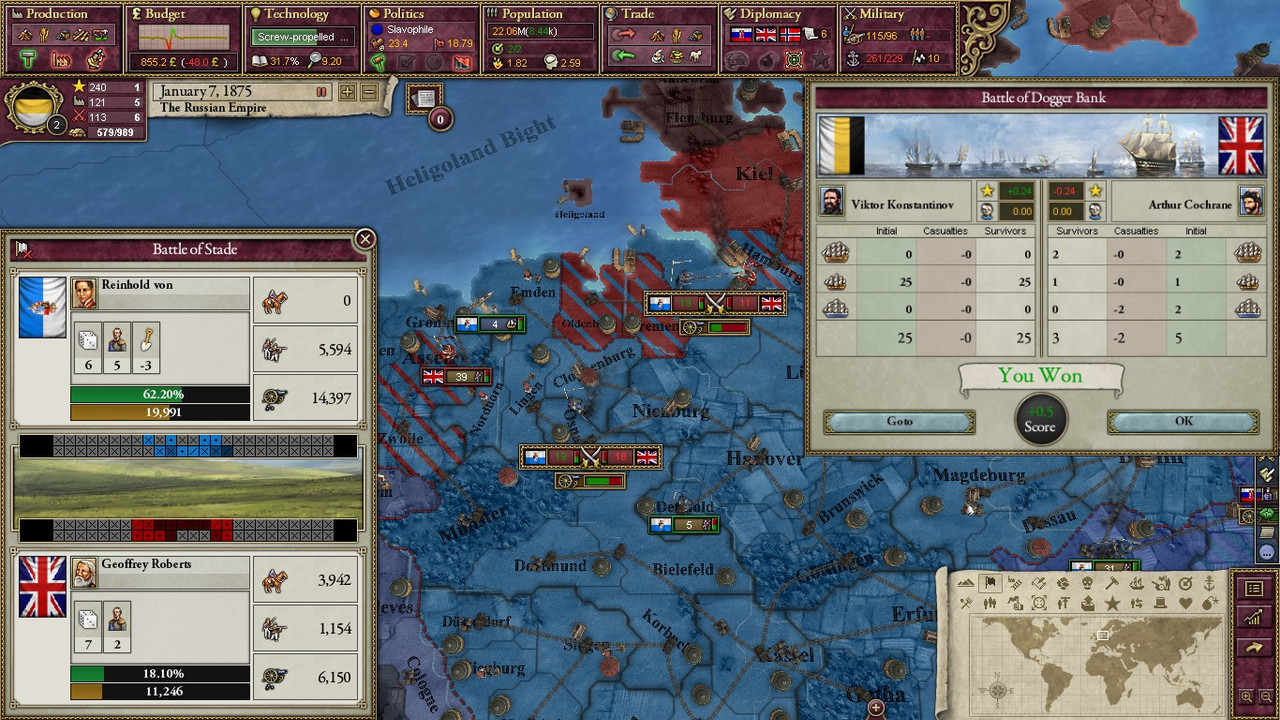
While land armies were embroiling in Transylvania and Germany without vivid success, the Russia Navy successfully defeated the British fleet and blockaded the Islands. British Navy was surprisingly weak and exhausted to withstand the shock of the modern Steam squadron of the Russian Empire. The United Kingdom has been cut off from sea trade routes, thus national trade has dramatically decreased and the UK declared bankruptcy. The British Expeditionary Corp was circled and destroyed by the Bavarian troops in the following months.

The Russian armies were superior in number, they were occupying one province by another, looting villages and cities in driving direction. The Battle of Debreen occurred in Transylvania on 25 December 1875. The Russian army led by Sergey Menshikov defeated the enemy, but has l-lost almost 69 000 men (Cavalry – 8000; Infantry – 53 000; Artillery – 7600). Despite victory, the Russian troops suffered so heavy casualties, that general Menshikov had to retreat for recruitment and filling supply.
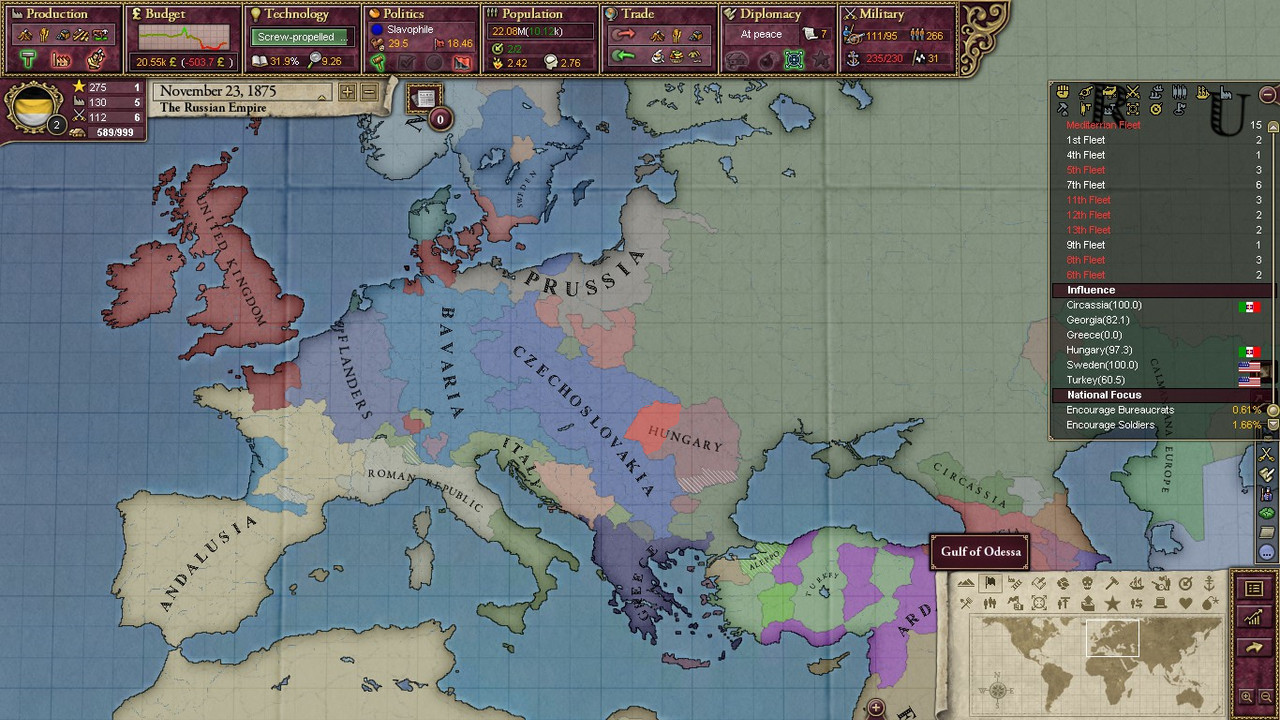
Despite the heavy losses, the Allies continued moving toward Prague. Peace negotiations started on 14 July 1876. Czechoslovakia agreed on the transfer of the cored provinces to Hungary, payment of reparations and disarmament. Failed United Kingdom paid foreign debt to Bavaria and Russia, and liberated some lands in the North Germany. As a consequence, Bavaria has taken revenge, and Russia placated the elites of Hungary by giving to them new holdings. Tsar hoped these measures will calm the Hungarians for a while.
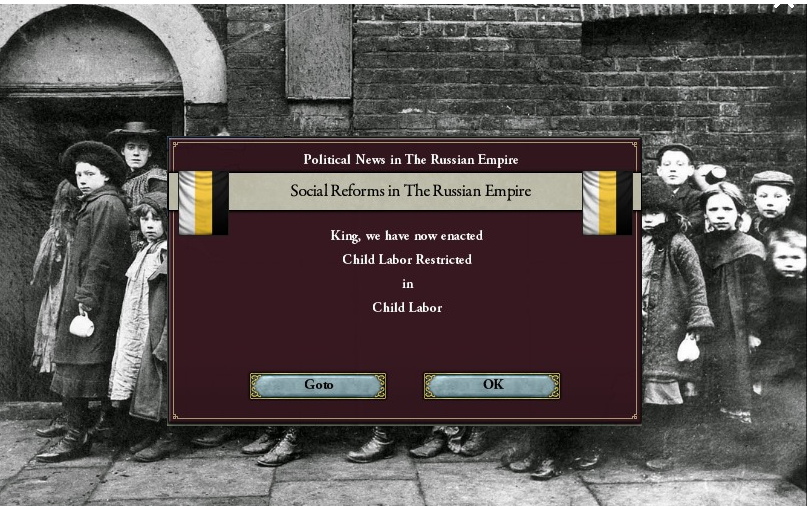
Russia won the war, but victory didn’t bring calm. The Russian army had suffered heavy casualties during battles and guerilla in Hungary. Civil society was outraged by heavy losses and massacre of peaceful people in Hungary. Chartist Rallies again broke out in Summer 1876, while the socialists have gained more than 15% during the election of 1877. They managed to push the Restriction of Child Labor.
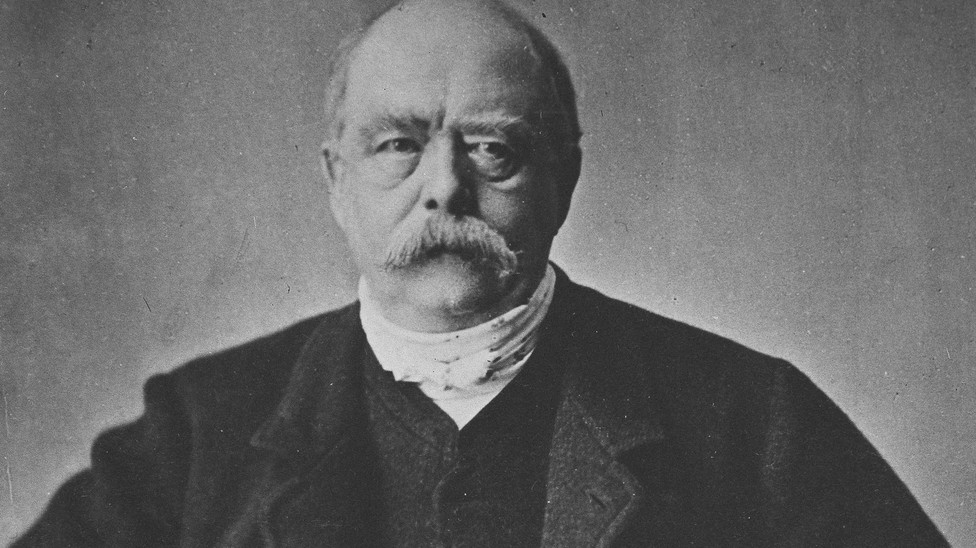
Military alliance with Bavaria was highly unpopular in the Russian Empire. Bavaria seemed to be an aggressor, conquering the neighboring lands to unite the German nation by means of “steel and blood”. Otto von Bismark, a Chancellor of the High Council of Bavaria, was pursuing policy of forced German unification. He arrived at Saint-Petersburg to prolong the military alliance between two countries. Tsar approved the prolongation, but he said the Russian Empire will not join an offensive war against Flanders and the United Kingdom. That had suited the powerful envoy from Bavaria. Bismark seemed very pleased to enlist the support of the Great Eastern Empire.
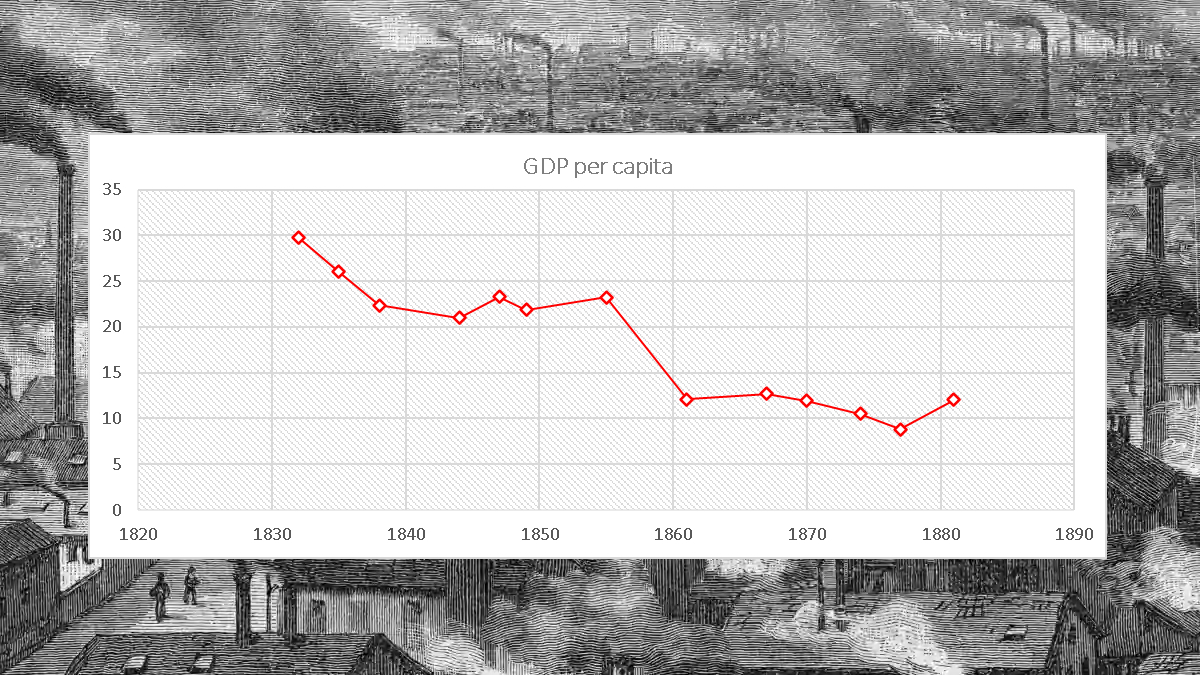
The Russian economy was in ruins after the past war. National GDP has been steadily decreasing for twenty years from 1856 to 1876. Unemployment, shrinking wages, shortage of industrial and consumer goods like regular clothes, furniture and beverages. High taxes caused by enormous military spending on wars and colonization have been impoverishing common people. Existing state factories were inefficient because of labor shortage, skill gaps and idleness. Factories had supply disruptions caused by lack in materials: raw materials as well as industrial goods that negatively impacted on production and created economic challenges for management.
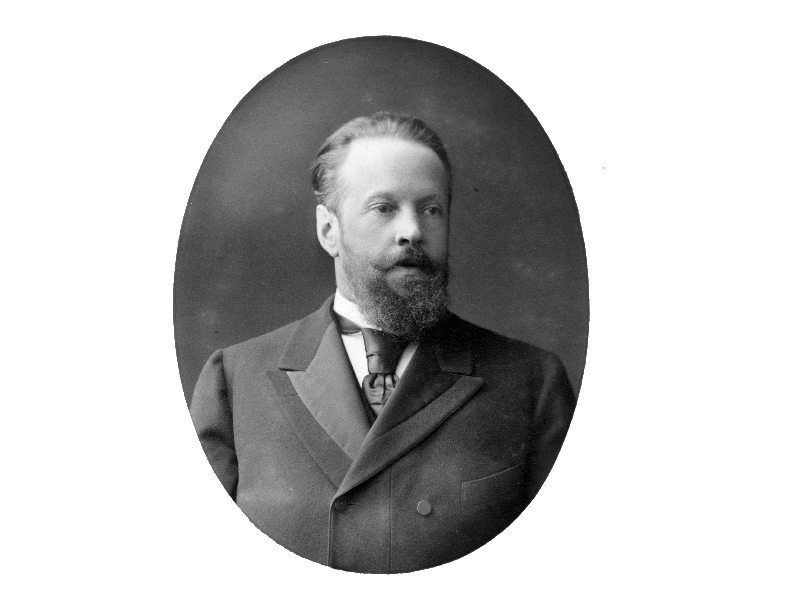
So, Tsar Alexandr II Meri decided to assign Sergey Vitte as a Prime Minister, who was obliged to form Reactionary Minister Cabinet. Sergey Witte was a 52-years-old bureaucrat, who made an excellent career, managing state factories in Moscow, Tula and Tver. He was good at his job. Sergey Witte relied on industrious men but not politicians in his work. During five years of Witte’s government national industry was restructured by filling the gaps in technological network. Government funded the construction of factories adjusted to huge plants. For example, steel mills and sawmills were founded to strengthen existing military factories in Moscow. Glorious steam shipyard was built in Saint-Petersburg. Sergey Witte analyzed each province to form industrial clusters (military production, forest industry, navy supply) that boosted the economic growth. Government shut down unneeded factories to flow workforce into more productive sectors.
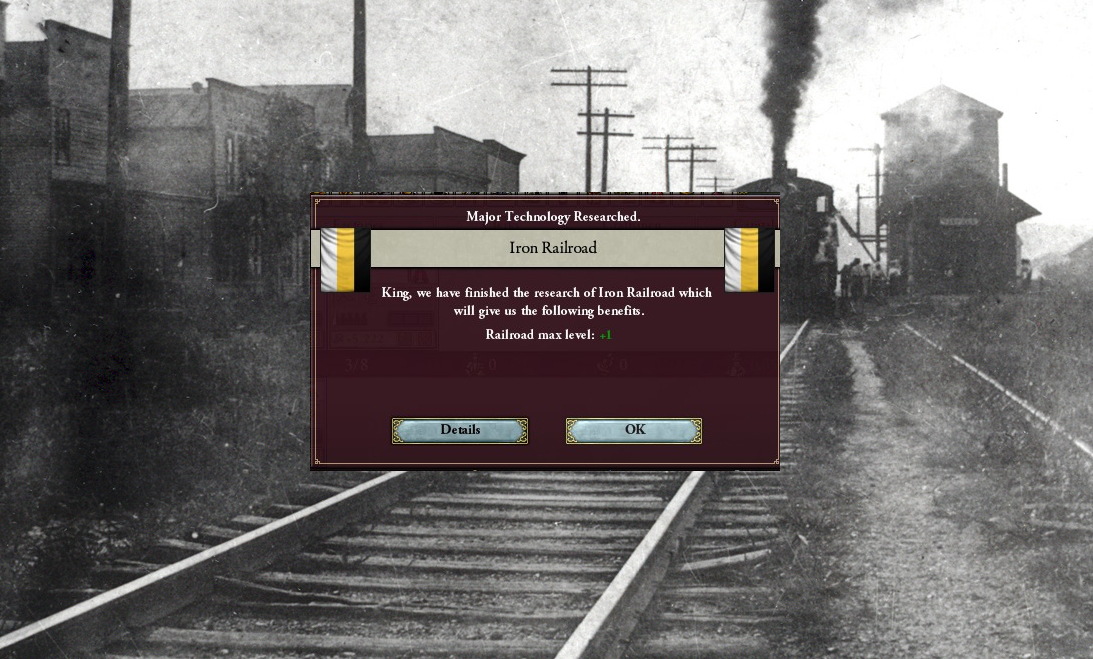
One of the most important things was an invention of Iron railroads on 31 May 1878. Government has launched ambitious plan of infrastructure building through the country. The Russian Empire has to be tied around by a network of railroads from Kamchatka to Warsaw, a capital of vassal Poland. Industrial goods and natural resources should move smoothly and fast across the entire empire. Productivity of factories has increased by comparison with the previous years. The working class, numbering about 400 000 persons, has doubled for the last five years. Russia was ranked fifth in the workforce rating of the European countries.

Experts predicted, that number of labors will exceed the level of 1 Mln up to the end of the 1890s. They worried the Russian Empire might the same fate as the United Kingdom. The British working class joined the bourgeoisie and Absolute monarchy was fallen in England in 1850. Disturbing rumors were coming from the Roman republic, one of the most industrialized nations, where the workers seemed to destroy liberal republic and established the socialist government. At the turn of 1881 the socialists in common with the communists’ candidates did take 20 per cent of the seats in the Senate!
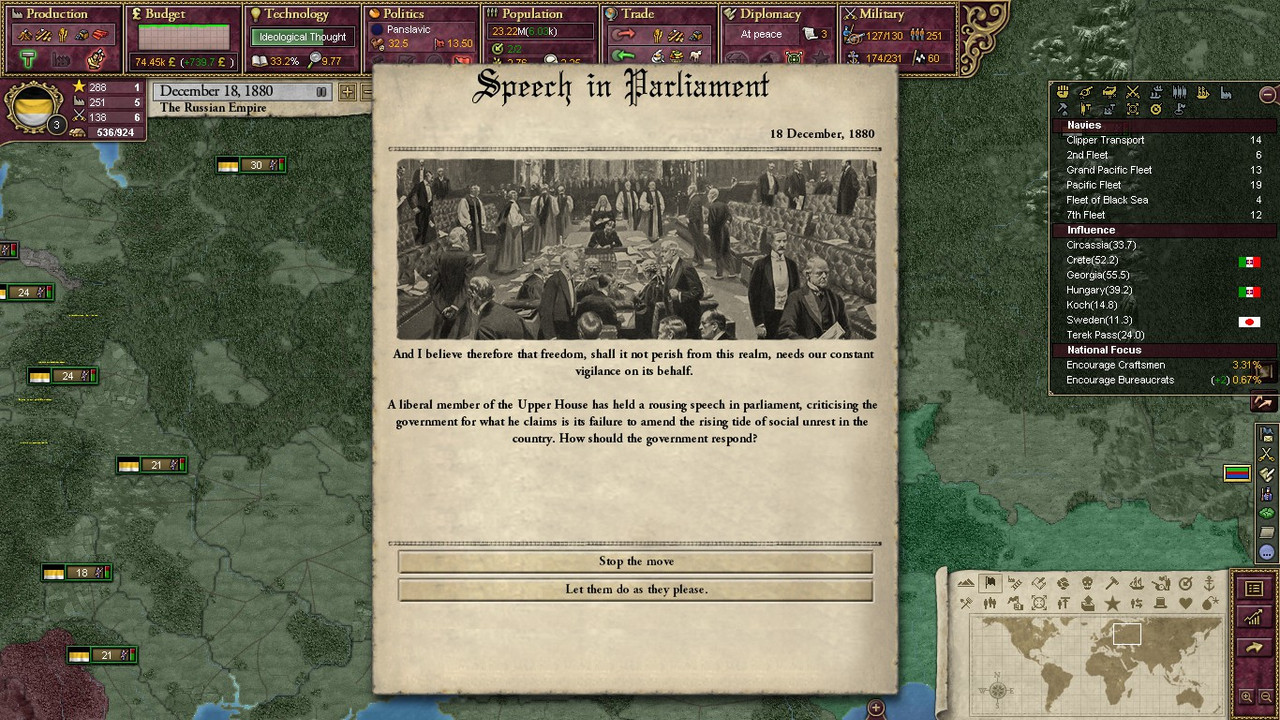
Liberal deputy Michail Zemsky, an influential intellectual from Moscow, made speech in the Senate on 18 December 1880. He bravely cautioned against attempting to suppress liberal movement, because of the danger of social upheaval. According to the records, Tsar, government and local authorities should make steps toward the liberals in the demands of democratization. The deputy warned mass riot will tear the country apart. Time for social compromise has come! All sound forces of the society must consolidate and push the announced reforms! Otherwise, we will face the chaos of civil war.
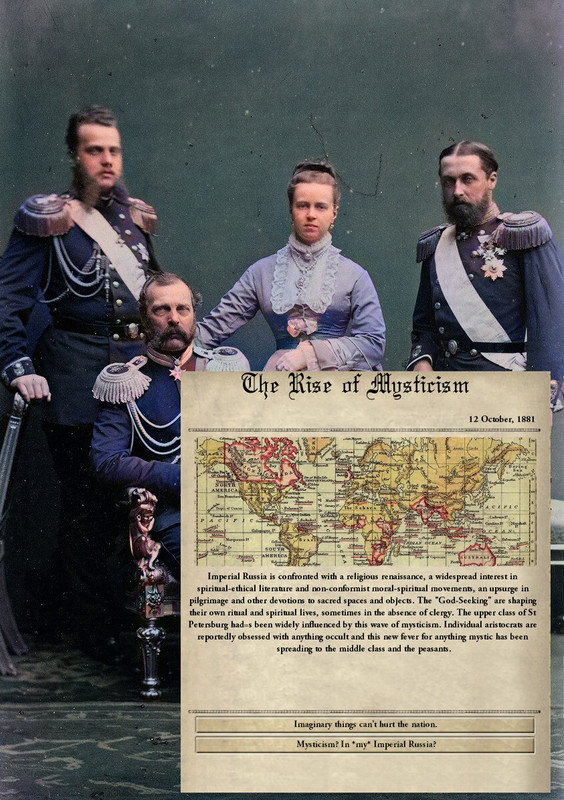
His parliamentary speech has become famous, but that has not been heeded, and thus a new oppression race was set off. Opposition from the left as well as the right has been radicalized in response, the liberals and the socialists were eager for fighting their ideas on street s of the Russian cities. Secret societies of anarcho-liberals, the militant socialists and the communists were organizing to challenge the Empire. Tsar Alexandr II Meri had mental break in October 1881. He was worried about the death of his beloved wife and was walking the mystics. Tsar was retired in Gatchina, he didn’t receive ministers and didn’t read the papers. Besides, rumor has it he was indulged in drunk…
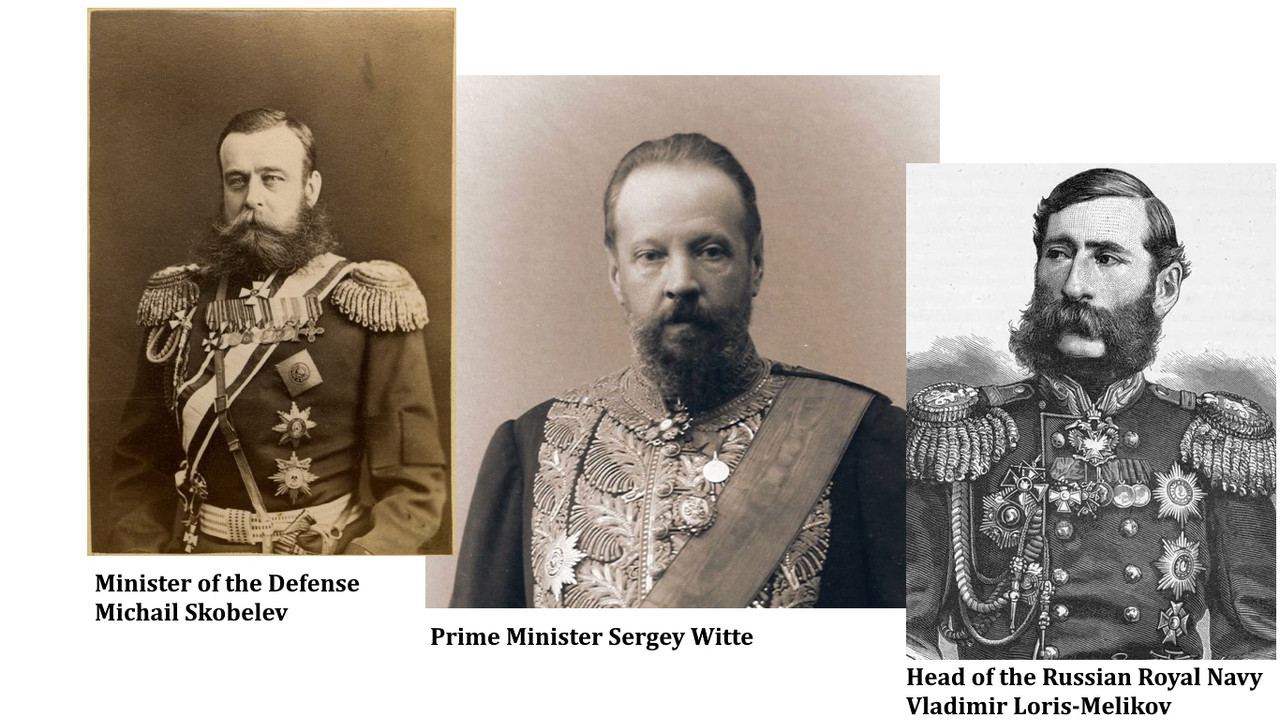
Triumvirate was formed, as have occurred previously in the Russian history. Prime Minister Sergey Witte, Minister of the Defense Michail Skobelev and Head of the Russian Royal Navy Vladimir Loris-Melikov formed an unofficial circle of powerful men in the state. They began to prepare for possible social upheaval (even in the form of armed uprising). Royal Navy and Forces were on standby for red alert!
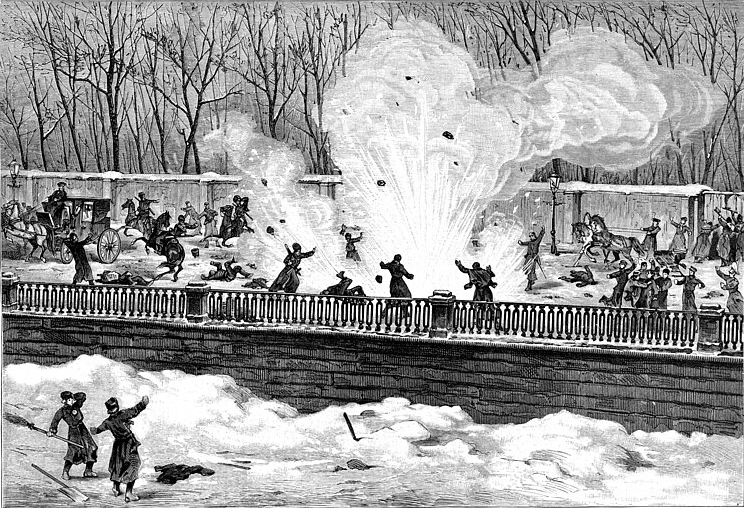
Tsar Alexandr II Meri decided to visit the Royal Palace to participate in the opening ceremony of the Senate. The Royal escort moved from Gatchina to Saint-Petersburg on the morning of 11th March 1882. Line of the carriages and carts stretched back several kilometers. Tsar avoided railroads, he thought that railroads are dangerous to one’s health. Royal Carriage was attacked by the terrorists, when that crossed Moika bridge in Saint-Petersburg. The Hungarian socialist Angey Vaida dropped a bomb on the Tsar’s carriage. The explosion killed Alexandr II Meri, and a few men was injured in the assassination. Tsar Alexandr II Meri had been killed in the assassination on 11 March 1882. Triumvirate met in Royal Palace on the night of 11th March to elaborate plan for the rescue of the Empire....
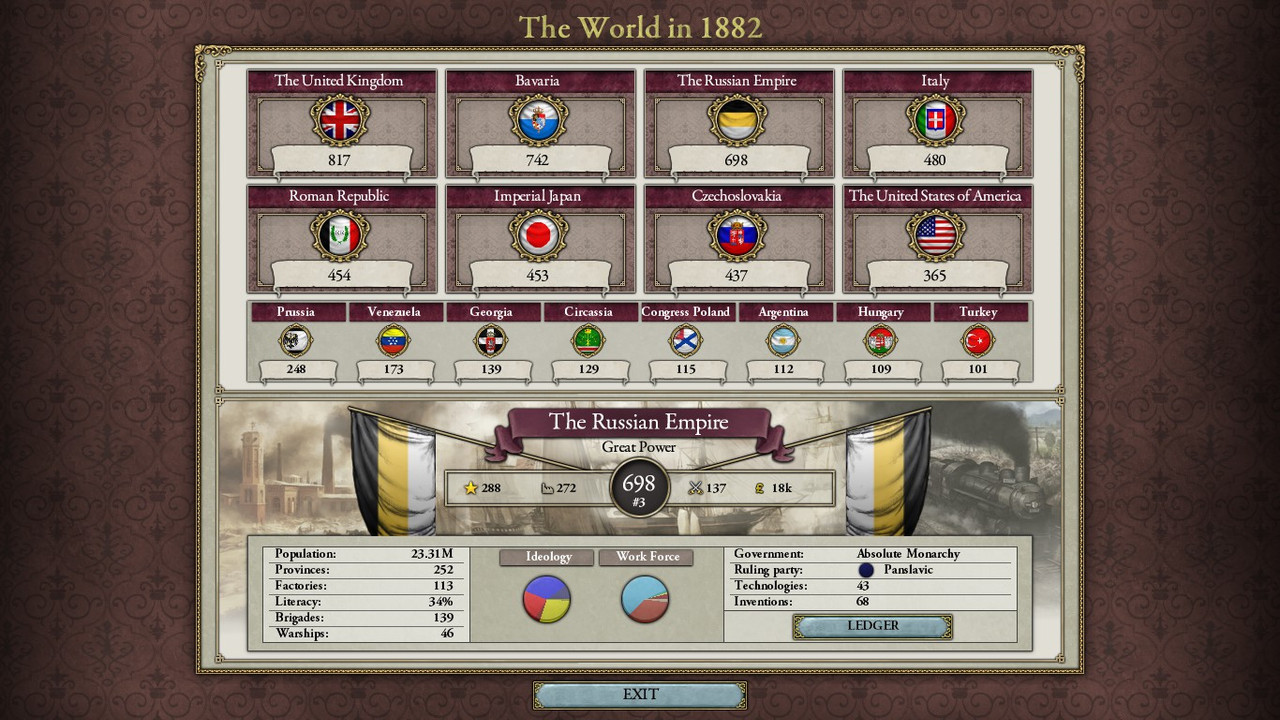
- 2
Chapter V. The Witte’s years (1882-1892)
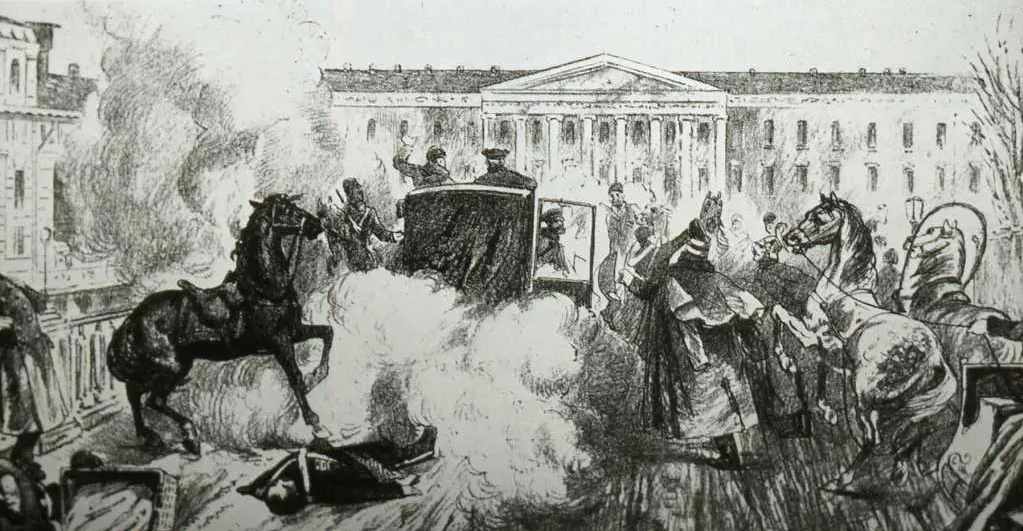
The Triumvirate, which would have ruled the Russian Empire, met in the Royal Palace at the night of 11 March, after the assassination of Tsar Alexandr II Meri. They drafted the Priority Action Plan to rescue the Russian Empire. First, Heir had to be isolated in the Gatchina palace. Second, all troops had to be gathered on the outskirts to Saint-Petersburg (Novgorod, Pskov, Vyborg and Ladoga). Third, Government must initiate a consulting with the leading representatives of the Senate to exclude possibility of uprising inside the capital.
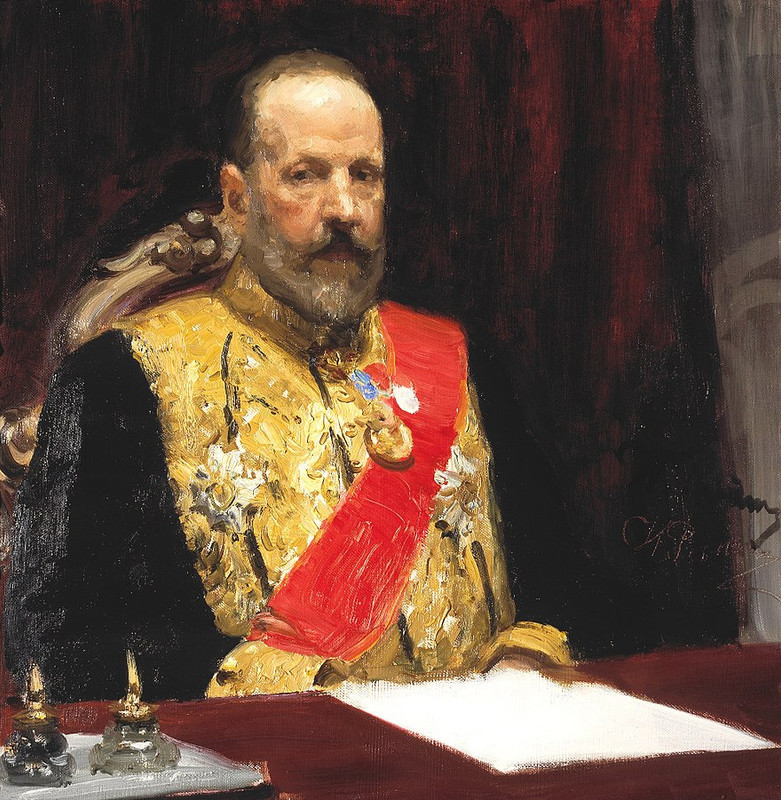
The socialist as well as the communist deputies, who gained almost 20% of seats last year, abandoned meeting of the Senate. Sergey Witte managed to conclude the agreement only with reactionary and conservative factions on 10 April 1882. The left factions and radical liberals began to go the provinces to agitate for uprising. Some of them were presumably imprisoned and extrajudicially executed by secret police. Violence has been gradually spreading the Empire and Sergey Witte said: “If we didn’t stop them, the country will face chaos….”.
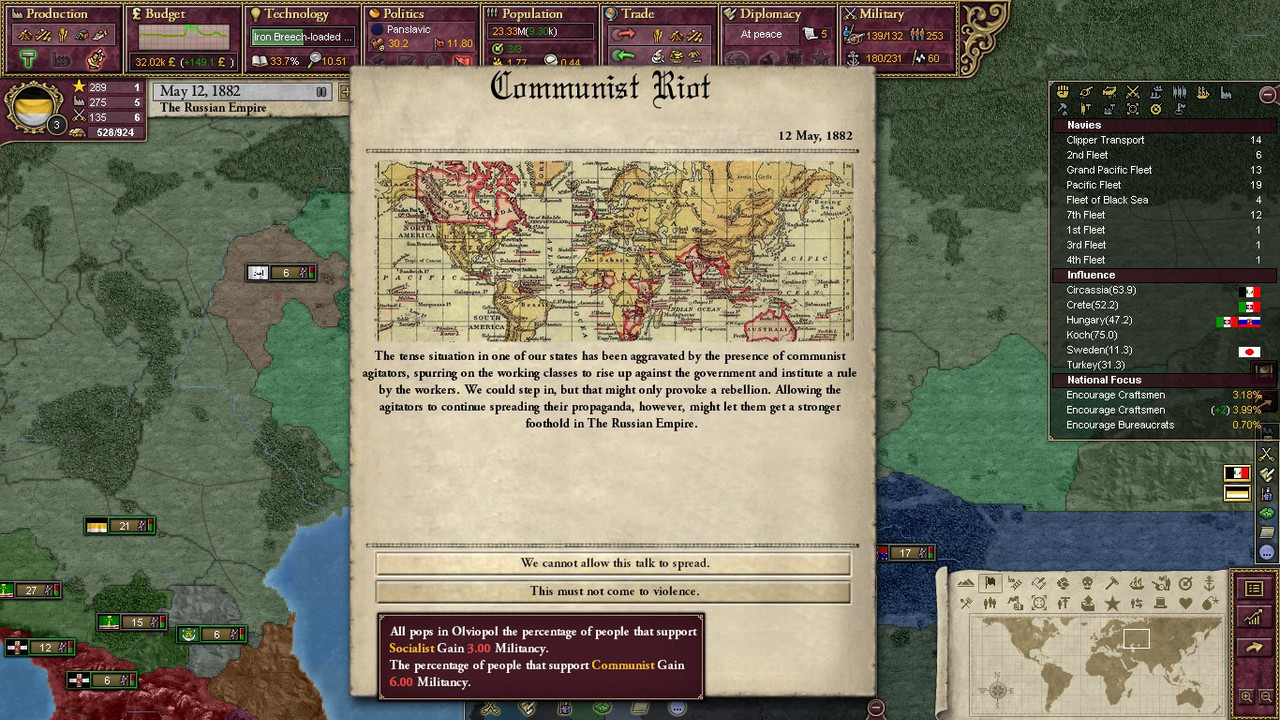
The communists upraised in the city of Olviopol two month later after the death of Tsar Alexandr II Meri. Armed combatants seized the building of City Council and took some facilities in the outskirts. The South army led by General Gurko marched quickly to the city and disarmed the rebels. Ringleaders of the rebellion were executed by hanging.
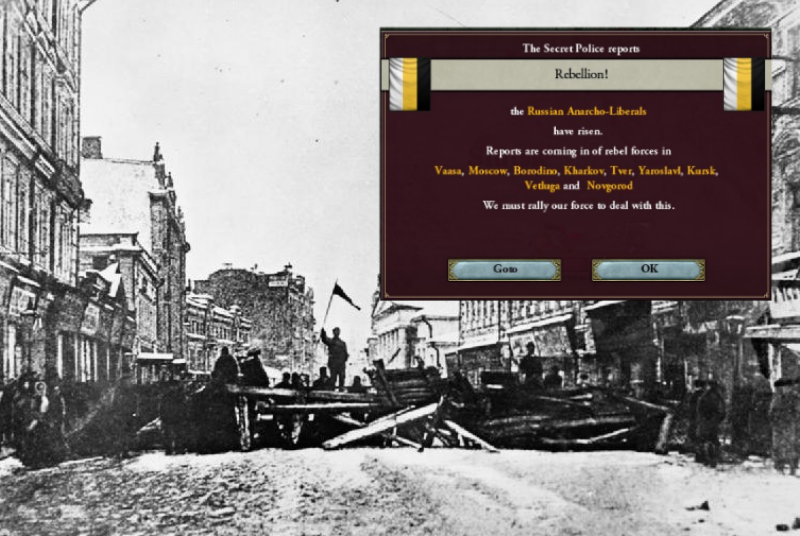
This year a more serious uprising occurred in Moscow on 28 November 1882, where anarcho-liberals upraised to overthrown the monarchy and establish a republic. They were able to fight the regular troops on the streets of Moscow, Vladimir, Kursk and Tver. Loyal army fought the rebels, using artillery and cavalry regiments. Street battles have lasted for two months and cost the hundreds of lives.
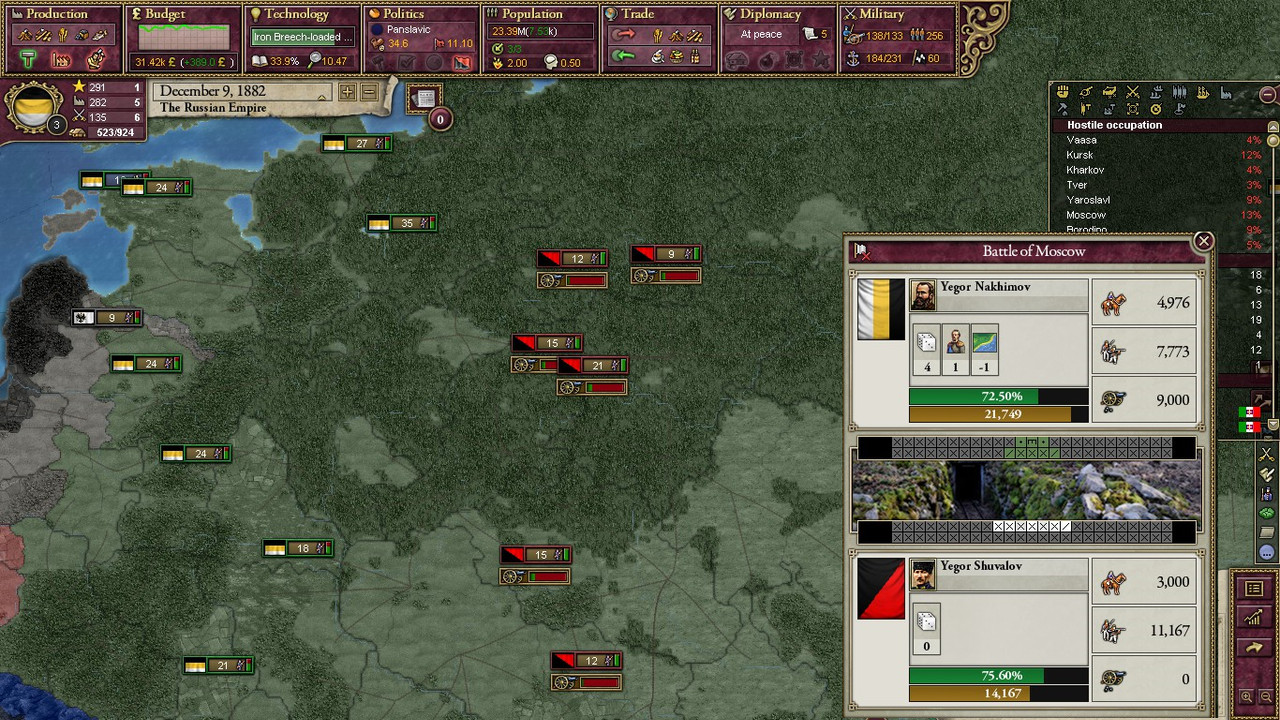
Imperial forces suppressed the protests, thus participants in the rebellion were arrested and sent into exile in Siberia, having lost their civil rights and property. Investigation has shown that the most of them were liberal-oriented intellectuals and artisans. There were many landowners and capitalist have joined the ranks of the rebels. Workers of industrial factories didn’t attach to the rebellion.
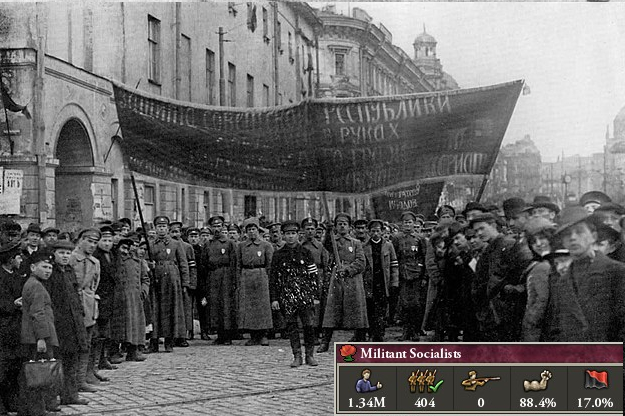
Sergey Witte was not satisfied, having received reports about suppression of the revolt. He knows Militant socialists are plotting against government to raise a major nation-wide rebellion. They might have about 400 regiments, according to the records of secret police, that makes them a real threat to the Regime. If they all had rebelled, the Empire would have collapsed. He must either crash them or placate some left factions by sort of social reforms. Triumvirate elaborated a plan to overwhelm the revolution. The Imperial forces of 87 regiments were committed to Saint-Petersburg. The defensive line ran 10 kilometers from the capital. Saint-Petersburg has been passed on the martial law and garrison transited to a state of emergency. Sergey Witte applied to the Senate to adopt the measures needed for rescue state. More than half of the Senate voted for a state of emergency. Both the liberals and the social-democrats voted for stability against brutal radical from both sides.
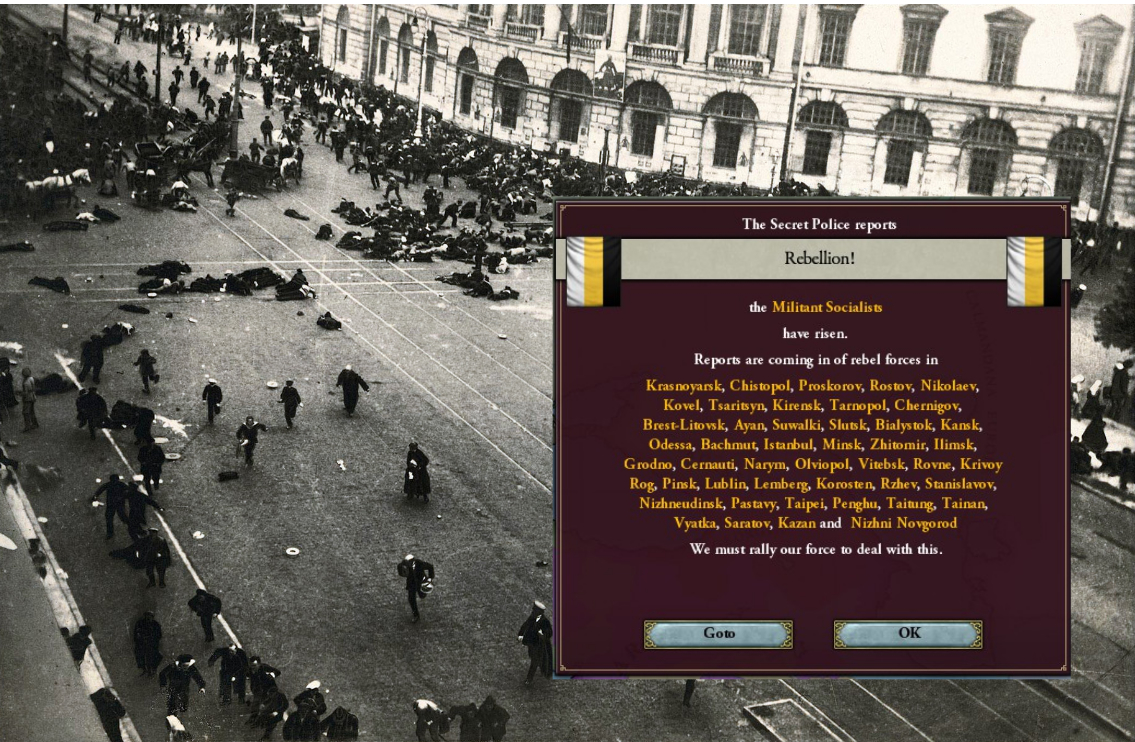
Rebellion broke out on 22 March 1884 (in the name of Great riots of 1807/1808), covering huge territories of Ukraine, Poland, Lithuania, Thrace, Perm and Volga. Dozens of cities raised against the regime to fight for “better life”. Major battles took place in the outskirts of Grodno and Nizhniy Novgorod. In the battle of Grodno loyal troops defeated the rebels, killing more than 85 000 men at that time.

Nizhniy Novgorod, a rich and influential trade city, has become battlefield between the revolutionary and loyal forces. General Michail Skobelev, a member of the triumvirate, was fatally injured while commanding the troops. Alexandr Ulyanov, brother of Vladimir Lenin, a leader of small radical left party, was also shot during the battle of Nizhniy Novgorod. Well, then that did go unnoticed.
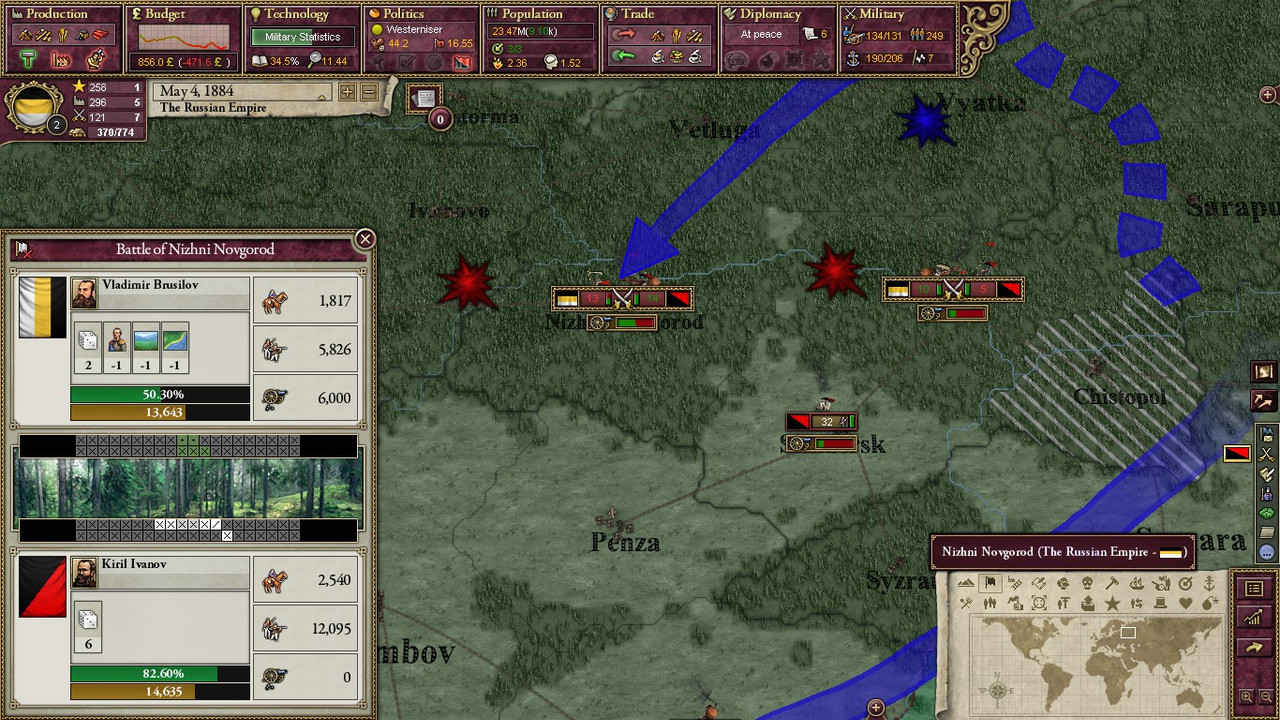
Grodno, a strong fortress in Lithuania, was stormed by the rebels on 24 May 1884. Loyal troops led by Dmitry Kuropatkin managed to consolidate and attack the seized city month later. Bloody battle lasted for three months and ended with the victory of the loyalists. During all summer of 1884 government forces were fighting the rebellion throughout the Russian Empire. Military actions had ended only in fall of the year.
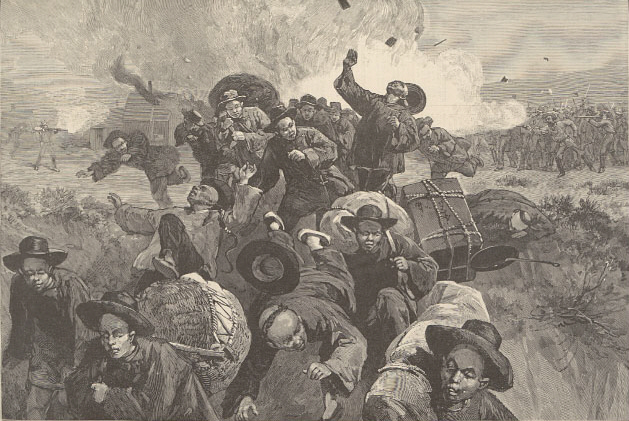
Major rebellion broke out on Formosa, the Russian colonial island in the Yellow sea. The Chinese insurgents of 120 000 men slaughtered the Russian garrison and civilian population, who were loyal to Russia. Officers, solders, civil servants and landowners were fiercely executed by armed nationalist combatants. Horrible massacre lasted for 10 months and thousands of colonists were killed mercilessly by mobs organized partly with the support of the Manchurian governors, who sponsored the rebellion.
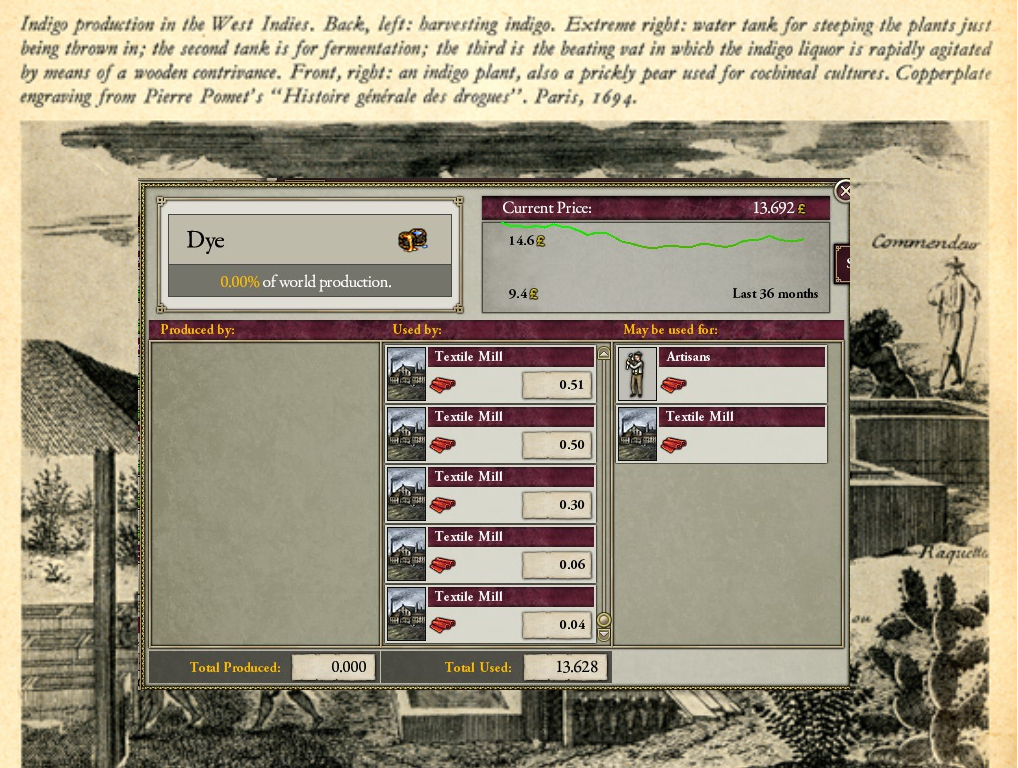
Shortly before the rebellion, the Russian Empire had plans for seizing India for the provinces rich of species and dye. Dye was highly needed for the growing national textile industry. Thus, a mobilized high-trained and good equipped army located on Hainan Island. General Mirsky fast telegraphed to Admiral Dolgoruky, when he received news of riots on Formosa. They began to plan a punitive expedition to Formosa, gathering troops from the islands on the Pacific Ocean.
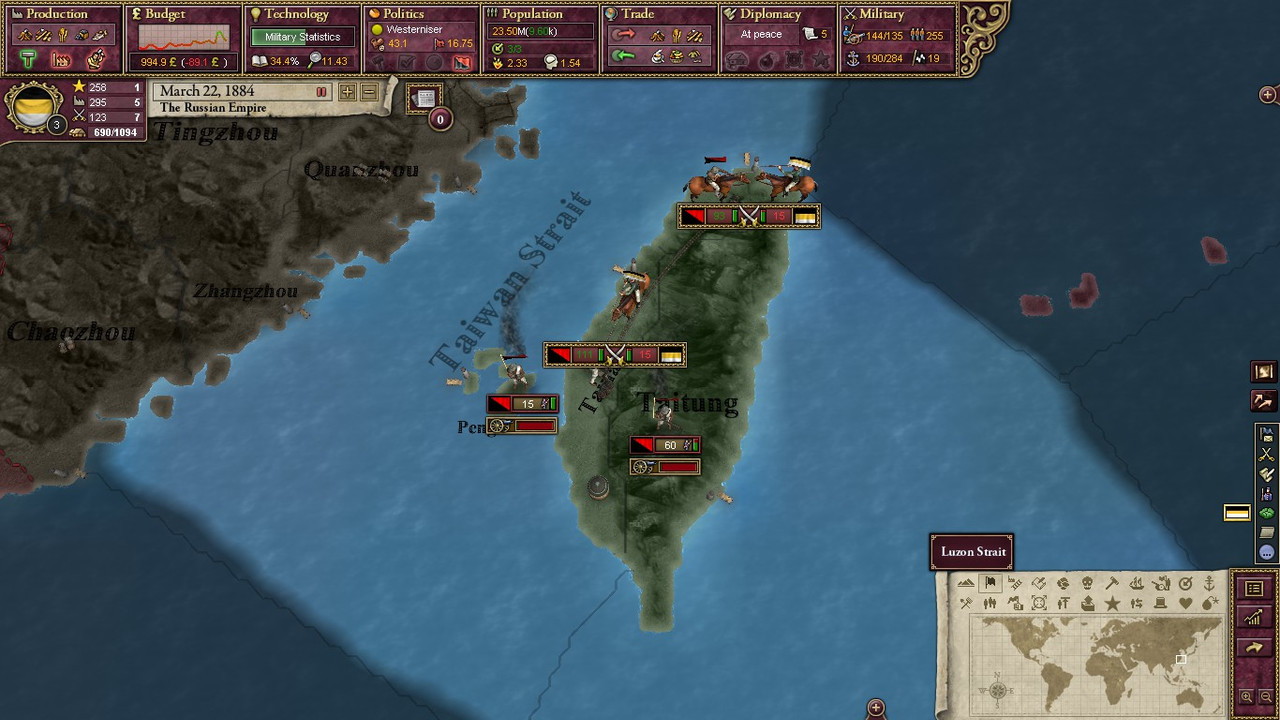
The Russian forces landed on 22 March 1884, while the Imperial Navy had blockaded the rebellious island. Royal troops cleared the island off the national-socialist militants. Regiments from garrisons on the Pacific islands have eagerly joined the punitive expedition. More than 120 000 local residents were executed during this punitive expedition, many of them were forcibly enslaved and sold to the Manchurian selfish traders. Governors, who financed the rebellion, resold them with profit to slave-traders, who exporting these unfortunate people to inland Manchuria… Not only adults but also children were mercilessly enslaved and transported to China. Some scholars argue that it was genocide.
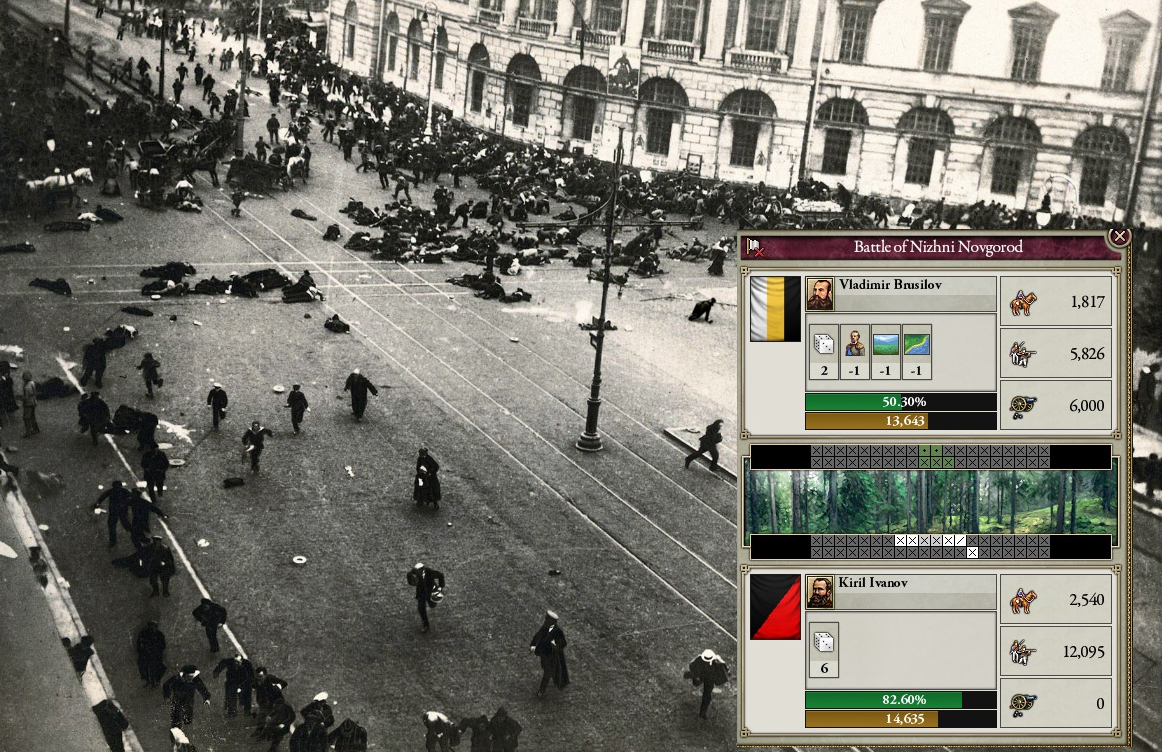
The riots had been completely suppressed at the mid of 1885. National economy was in ruins, while the Russian society was exhausted with bloodshed. Civil turmoil has caused hundreds of thousands of killed and injured people, dozens of destroyed towns and looted villages, decline in prestige of the Monarchy. Alexandr III Meri seemed to have lost his mind… He never left the castle in Gatchina and avoided meetings. Thus, Sergey Witte consolidated the government, becoming Prime Minister, and continued to be a de-facto ruler of Russia for the following ten years.
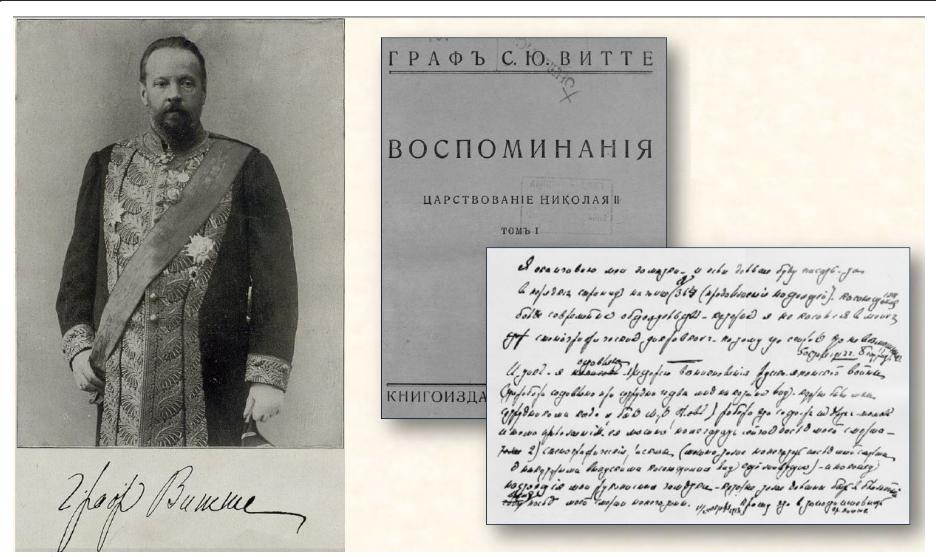
Sergey Witte had become a de-facto ruler of the Russian Empire, as just before it Onton Tichanov was a Regent four centuries ago. Two members of the Triumvirate left the political arena. General Michail Skobelev was shot in the battle of Nichny Novgorod, while admiral Loris-Melikov was injured during assassination on the St. Petersburg’s shipyard. He had to retire because of health conditions. Alexandr III Meri was lock in the castle of Gatchina after dramatic death of his father and the following social disaster.
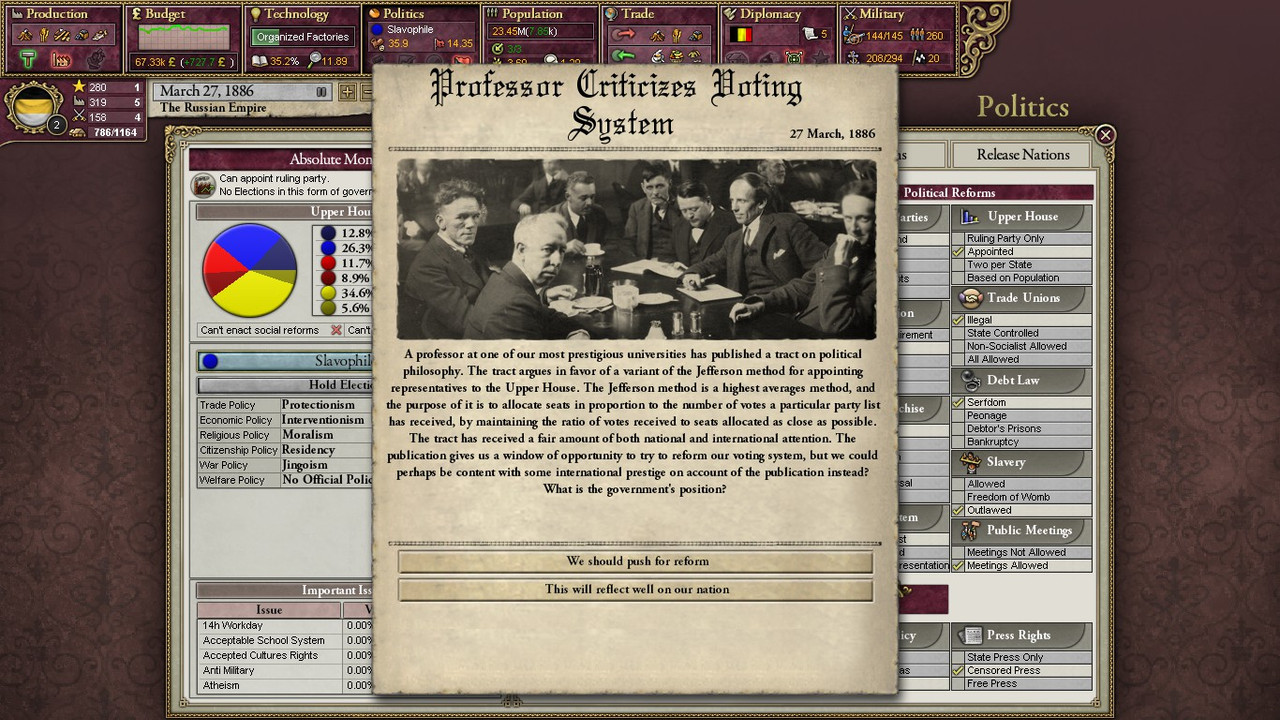
Thus, Prime Minister Sergey Witte became a Regent of partly incapable monarch. He was neither a tricky courtier like Onton Tichanov nor brave adventurer and noble usurper as Sofia Romanov, but a high-skilled administrator with outstanding record of achievements. The man, who would have become a ruler of the Empire, started his career in rail road industry. During suppression of the revolt, he gained support of army, The Officer Corp, bureaucracy and capitalist formed the basis of his power.
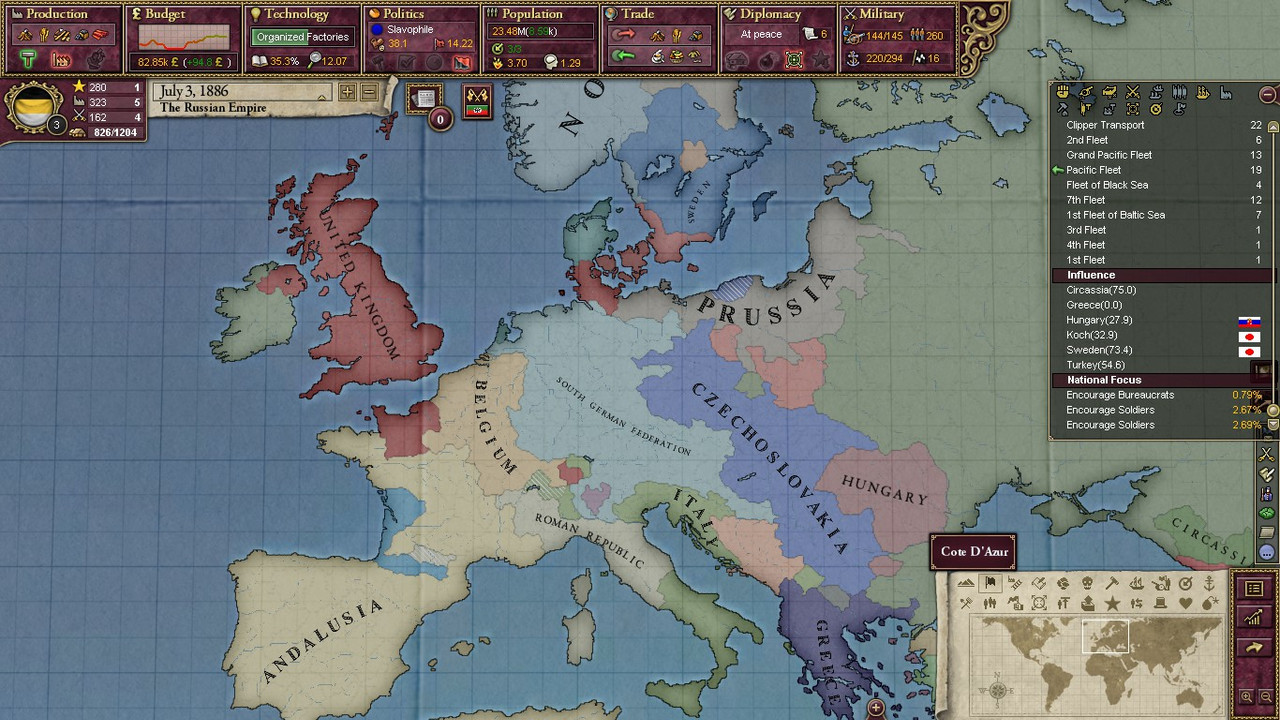
Despite social discontent and repeating uprising of the radicals from both sides, the government survived to keep potentially explosive social situation under control. Sergey Witte was concerned rather about an increasing political polarization than armed rebellious against the Government. Alexandr III Meri was absent from the king’s affairs, granting the Prime Minister absolute discretion. Witte’s success drew the envy of other powerful figures at the court, who also desired power.
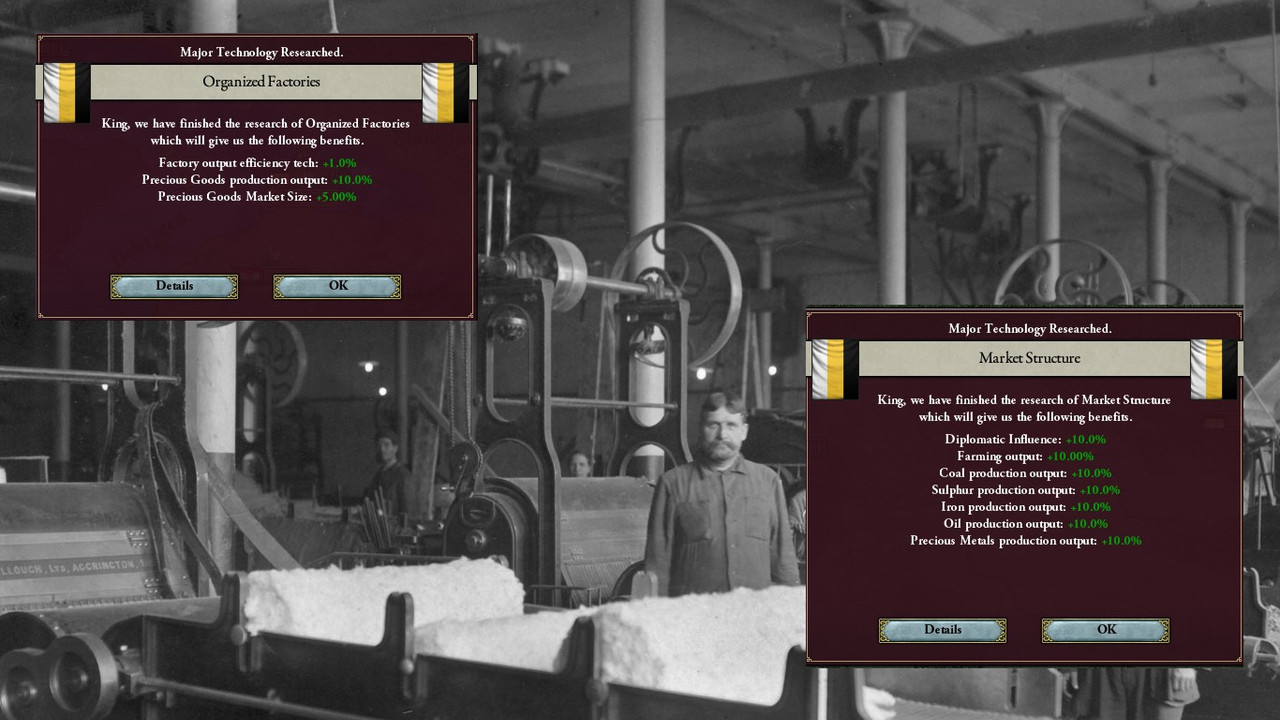
The Prime Minister launched a broad reform agenda in all the fields of government. Such reforms as Market structure (1885), Organized factories (1886), Late Classical Economics (1887), Money billing (1888), Scientific Management (1890) and Business regulation (1891) had definitively saved the country during the years of economic and social crisis after the rebellion. Labor class continued to grow, surpassing the level of 700 000 persons. The Russian Empire developing economy, like the leading European nations, had achieved considerable success and been ranked the 5th place of the most industrialized countries.
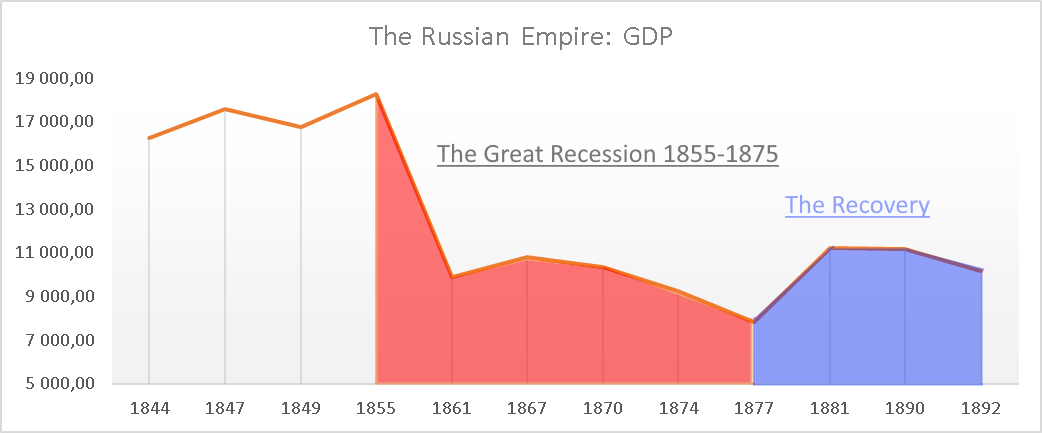
From the graph above we can see the trend of gross domestic product from the 1840s to 1895. The Russian economy has collapsed in the first part of reign of Alexandr II Meri because of crucial changes in world economies. As industrialization gathered momentum, especially in the Western Europe, the Russian economy had begun to fall behind the civilized world. Russia can’t mitigate the huge lag in the technologies neither by population nor natural resources. Continious territorial expansion did not bear fruit.
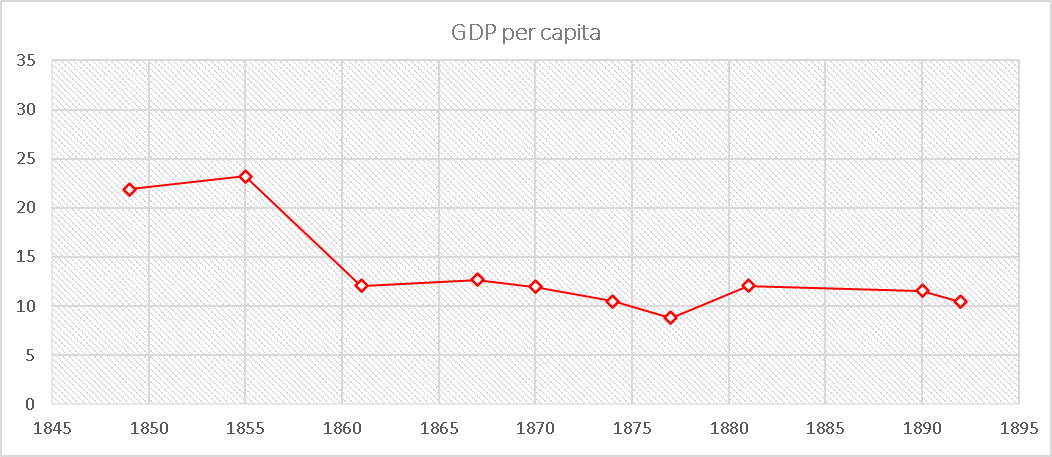
When Sergey Witte took the office in 1875, the national economy had been struggling for more than twenty years. Most of the goods were produced by artisans in their own homes, state factories were few in number, in addition, they were exceptionally ineffective. Whether the government subsided them or stimulated capitalists to invest money, the Russian industry was mainly an underdog with great number of small self-owned entities. By 1871 the production on factories was less than a third of total amount.

On contrary, after two major recessions (1855-1860; 1867-1872), caused by various reasons, including military conflicts, world economy has skyrocket since the middle of the 1870s. Russia was falling behind more and more against this background. Sergey Witte as a de-facto ruler of Russia insisted on the setting up an ambitious industrious program. Some of the industries had to create from scratch, while other were to modernize completely.
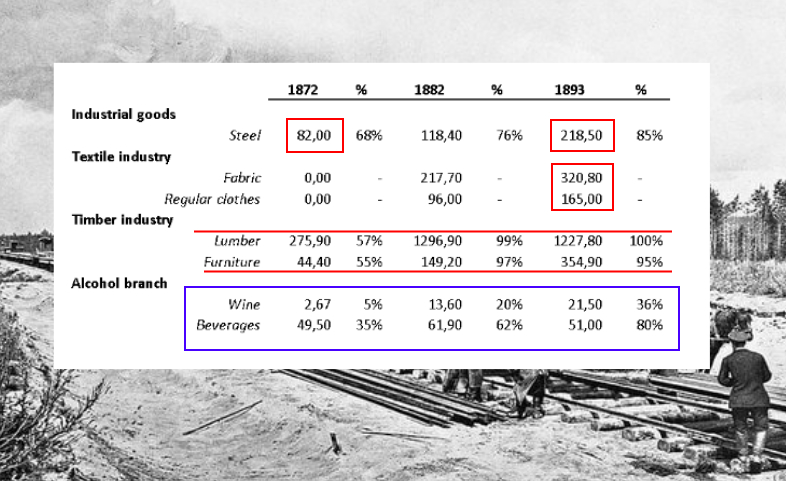
Look at the table above, which describes path of the Russian industrialization for the last twenty years of the 19th century. Steel production has risen by two and a half times since 1872. Textile industry has been built from the ground up with direct state funding (enormous financial investments). All fabric and regular clothes are manufactured on state large-scale factories. Production of furniture increased eightfold due to replacement of artisans with factories (from 55% to 95%). Unlike the industries noted above, alcohol branch was funded neither by the State nor huge industrial groups. Private investors, who had been artisans earlier, expanded their production in the southern provinces of the Empire.
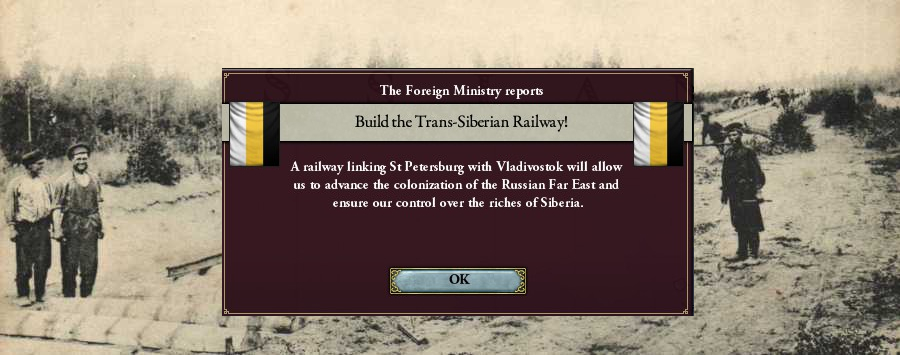
The success of industrial policy has strengthened the position of Sergey Witte at the royal court and society. In 1892, gross domestic product (GDP) began to grow for the first time since the 1850s. Recession seemed to go to waste… Investors began to actively buy state bond, by which large-scale infrastructure projects (like Trans-Siberian Railway) are carried out.
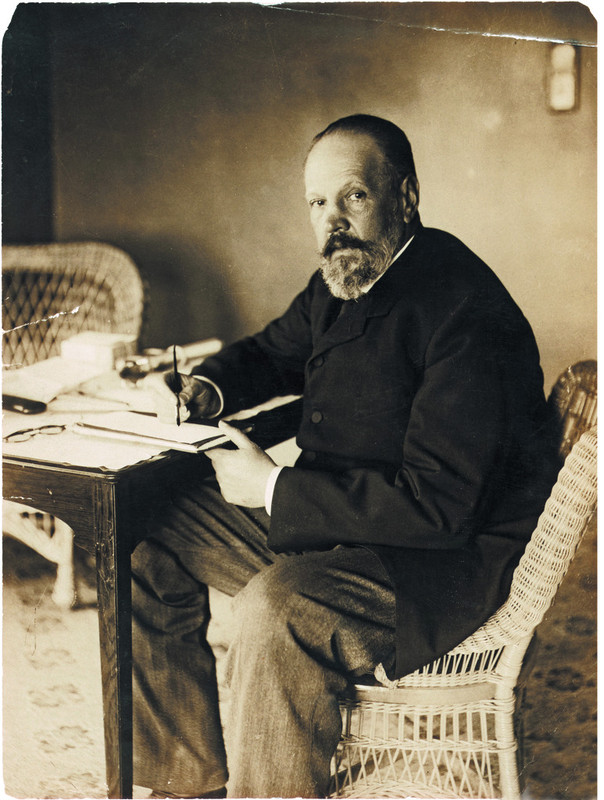
The Russian Empire had a very high level of taxes as well as tariffs on the imported goods, which gravely limited the development of national economy and consumer power. Sergey Witte thought this policy doesn’t match the emerging industry of Russia. If common people have no funds to buy consumer goods, so factories will bear the loss from overproduction. Protectionist tariffs raise the price of raw goods such dye, cotton and robber, thus factories are becoming less profitable. Implementation of new economic policy was discussed and approved at the regular meeting of Minister Cabinet under the chairmanship of Sergey Witte himself. The decision, that would have benefited the country, had proved fatal for Sergey Witte and cost him his post and his life.
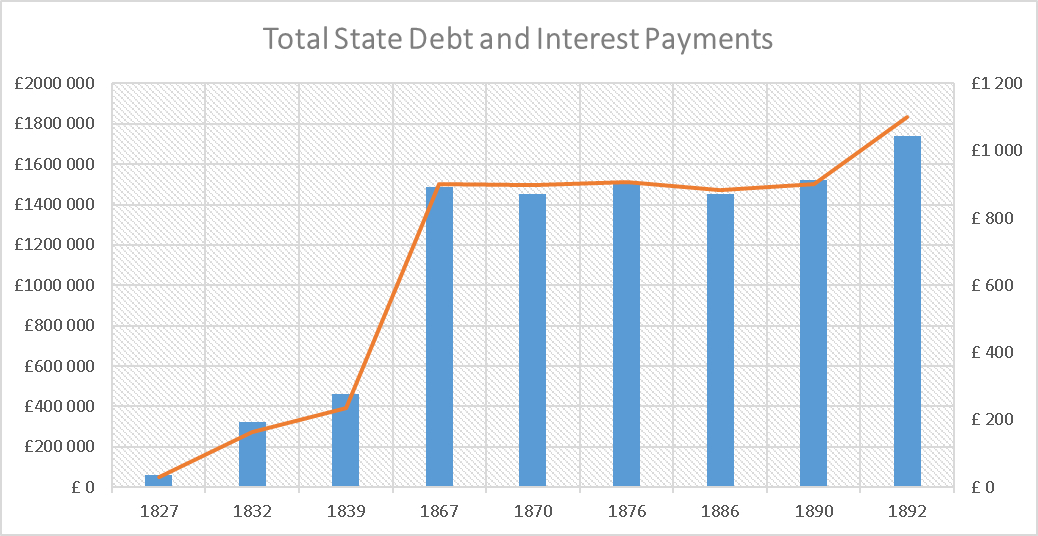
The Russian Empire has always be a Millitary Power with internal instability and weak economy. Sergey Witte succeded megalomania of Alexandr II Meri, marked by enermous millitary spendings, extermely expensive modernization of fleet and large-scale infrustruture projects. Almost all factories were state-owned and many of them were ineffective due to lack of resources, absence of capitalists and clerks. By 1890, Russia had only 6000 capitalists out of 21 million-persons population.
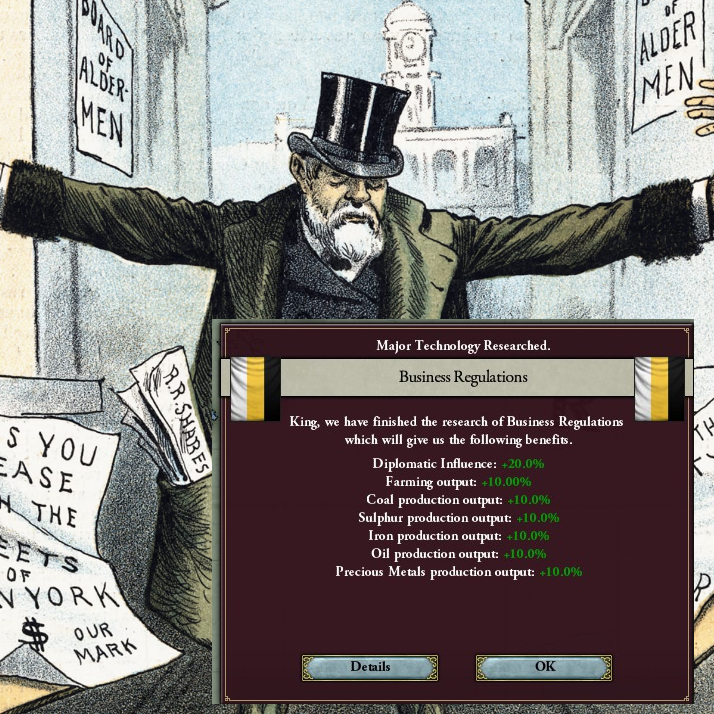
A new economic policy was adopted on 12 July 1890. Taxes as well as tariffs were lowered, while capitalists were promoted in the most populated regions like Moscow and St.Petersburg. Next year a new financial invention of Business regulation was done to stimulate domestic financial market. Inexperienced investors were positive about national prospects. The Revolution was supressed, while economy was growing rapidly by 10% per year. Civilization of Perm region, that was rich of iron and coal, would have accelerate steel production.
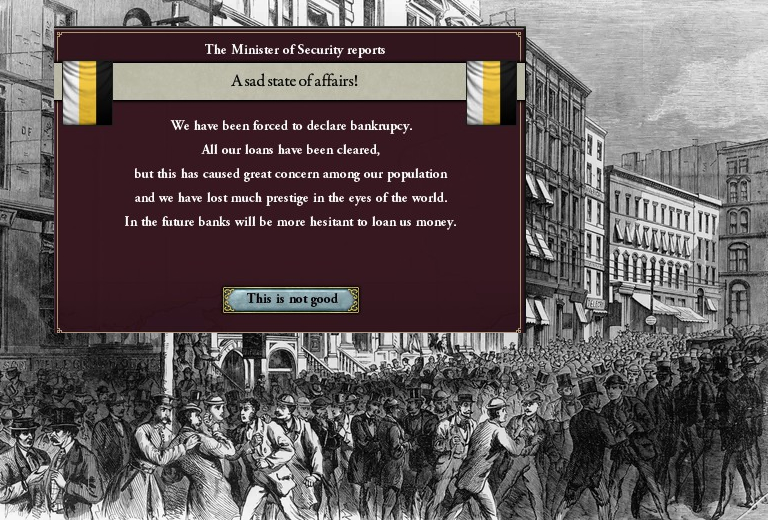
Everything fell apart in the beginning of 1892. when unknown changes on world market caused drastic decrease in demand for the Russian natural resources. The collapse in grain prices impacted Russia's farm economy, causing great poverty in rural areas. Tax revenues have fallen sharply. National stock market panicked in response to budget crysis. Inexperienced investors rushed to sell off state bonds. Invention of telephone led to massive panic among domestic investors as well as international financial funds. In the fall of 1892, the Saint-Petersburg stock market dropped sharply, and panic selling caused the stock market to crash.
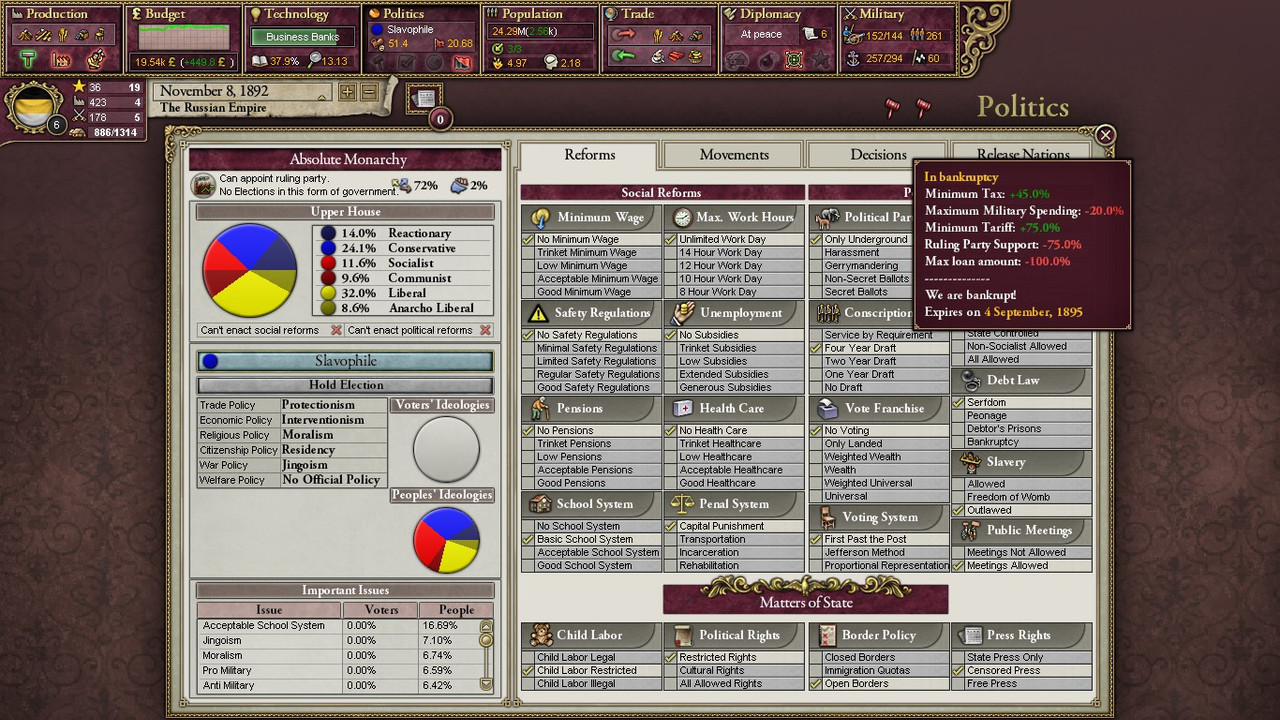
Sergey Witte didn't know what to do, either imprison financial traders and profiteers or raise cupons. His uncertaincy worsen situation, while another communist uprising on 23 May 1892 prevented Government from cuting budget expenditures. Financial situation was deteriorating all the year and Government had to default on debts on 04 September 1892.
- 1
Year 1905
The economic miracle has turned into default. Megalomania kills economyBoth rebels and an economic crash? That's no good at all!
Caught up with this just in time for the 20th century. Fascinating run through all the trials and tribulations of 19th century history. Russia has certainly seen its share of turmoil…
Next chapter is in the pipeline. You will see soon a few dramatic events in the Russian history.Caught up with this just in time for the 20th century. Fascinating run through all the trials and tribulations of 19th century history. Russia has certainly seen its share of turmoil…
- 1
Chapter VI. Dawn of New Age. 1905
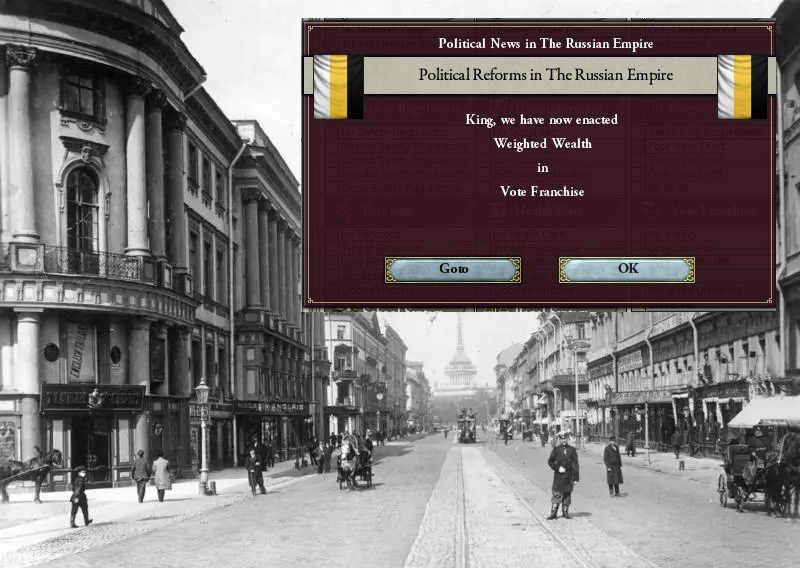
A young man is walking down the Nevsky prospect, a major street in the capital of the Russian Empire. Weather is pleasant, so he lightly dresses and looks great. He has already bought a couple of news bulletins, moving by newsstands, which are scattered along the street. The papers are named of “The National Assembly” and “The Spark”, where he finds his own article published a week ago. If he had bought the liberal newspapers, he would learn a lot of new things about himself. The liberals fiercely hate this young man for his beliefs and political actions.
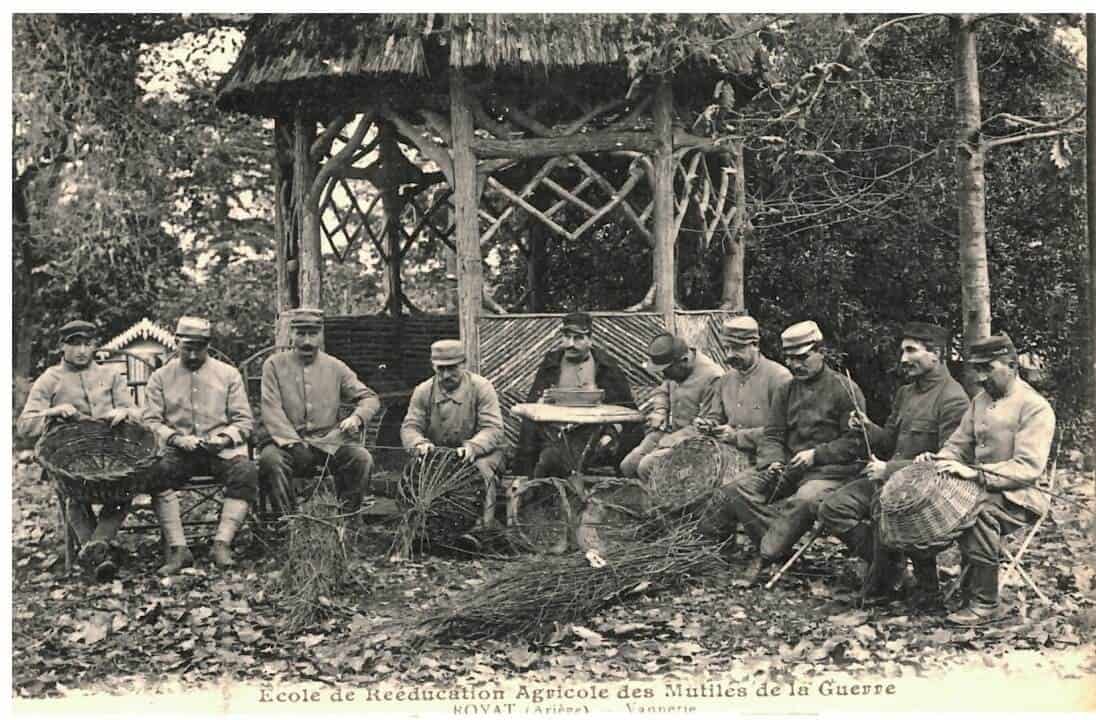
Injured solders are asking for alms near the Cathedral. The young man goes to them and gives money. “Thank you, sir, God blessed you!” “Where have you been wounded?” “That happened in the battle of Baska during the last Balkan war” “Damned war! If I had been a Prime Minister that time, I would have stopped this madness!” Our young man comes from a wealthy noble family settled down near Kiev. He perfectly knows, that all the south provinces are full of injured soldiers and officers after the Second Balkan War. Many of the sick and crippled streamed in huge cities to ask for alms. State has left them to their own devices to face this tragedy.

The war lasted for four years from 1900 to 1904. Tsar Nicholas II Meri ascended the throne after the death of Alexandr III Meri in 1899. He concluded a military alliance with the South German Federation, which emerged from Bavaria in 1884. The South German Federation is competing with all the neighboring countries like Belgium, Prussia, and Czechoslovakia. The focus of its country was on the unification of all the cored German lands into one strong national state. Wilchelm II Hohenzollern wanted the South German Federation to be supported by Russia in exchange for the provinces on the Balkans. Russia feuds with Czechoslovakia of the Balkan region, where the Slavs were under foreign oppression. Following the conclusion of military alliance, the South German Federation declared war on Czechoslovakia and the Russian Empire joined the war. The war was going badly for the Russian troops because of dreadful supply, low morale and bad command. The Russian armies had suffered heavy casualties in the series of battles.

Peace treaty was signed after four long years of blood battles and exhausting sieges. The South German Federation finally could fulfil its ambition of the unification of the German lands. The German Empie was founded on 10 March, 1904 in München, an ancient capital of Bavaria. The unification came from the south but not the north – Prussia has lost its Great Power status as early as in the 1850s. The Russian Empire made Czechoslovakia transfer some core provinces to Hungary, as well as, grant independence to Serbia and Bulgaria. Our young man argues that it was not value for money. Germany is becoming too strong and powerful state.

He has finally reached the building of Parliament, a national assembly called by Duma. Alexandr III Meri granted long-awaited vote rights to the Russians near before his death. The First Russian Parliament was held on 1nd of July, 1899. Establishment of the Representative body of power has become a milestone of the political process, which lasted from 1892. Tsar Alexandr III Meri dissolved the Senate and the so-called “Liberal Dictatorship” led by Loris-Melikov. Sergey Witte committed suicide in captivity (some people thought he was killed). Loris-Melikov, a liberal general and former member of the Triumvirate, ruled the Empire from 1892 to 1899. Russia paid all its debts and returned the confidence of foreign investors. Market reforms have been successfully implemented and the national gross domestic product has doubled in the following five years.

The First Duma worked from 1899 to 1903, while our young man is a deputy of the Second Duma held on 1st July 1903. Guards check out his documents and he can come into the building. The he goes to secretary, where government reports and materials are able to be red. He used to come early to prepare perfectly before the meeting. “Good morning, your materials are ready” “Thank you very much, Sofia, how are you? Has your husband found a job?” “Unfortunately, no. He is still unemployed; glass factory is still closed because of losses” “Does your family receive income support from the State?” “No, we are completely alone in our troubles…”. You shall know, I will do my best to improve situation and push social agenda. Government must turn into common people but not only support capitalists and landowners!”.
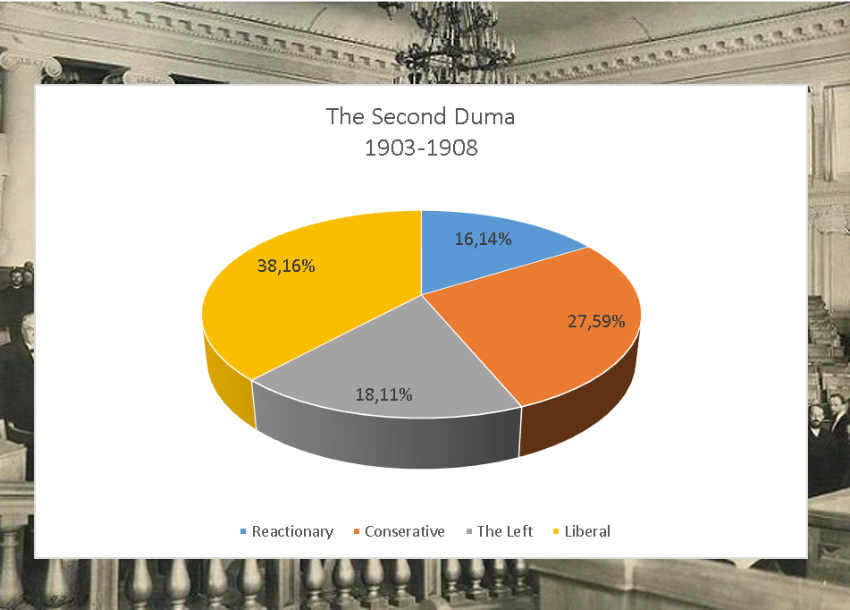
Young deputy walks to the Senate Library, greeting both the political allies and opponents. He is a member of the socialist party (Mensheviks). Two years ago, Tsar Nicholas II Meri, who succeeded the throne after the death of Alexandr III Meri, was forced to allow political parties to agitate and recruit supporters without fear of punishment (18 Aril 1904). The ruling liberal party still dominates country using administrative support, but Tsar tends more and more to return to the original type of government - Reactionary Imperialist Policy. The young deputy, studying the papers, like a scholar, joined the Socialist Party five years ago in order to fight injustice.
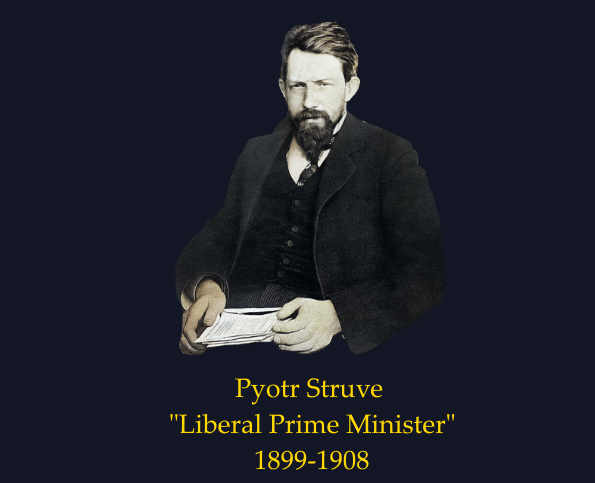
The deputy is preparing for a speech, which he is going to make next meeting of Duma. Prime Minister Pyotr Struve, a head of the Liberal Minister Cabinet, is looking to give account to the Duma abut current economic development. Pyotr Struve has been a Prime Minister for two consequent terms from 1899 after the decades of dominance of conservative party. The liberals have been yet targeting the internal policy for ten years from 1892, when Tsar Alexandr III Meri carried out the coup. He is confident making the speaach in the front of the Assembly because national economyrecovers from financial troubles of the 1890s.

Pyotr Struve goes to the rostrum to describe outstanding record of the Russian economy development. Gross Factory Production raised by 94% from 1892 to 1905 despite the war and general strikes occurred last year. Almost all goods are produced now on factories. Industrial goods increased by 2 times, while Consumer goods tripled. Growth rate is amazing: Steel 30%, Fabric 75%, Regular Clothes 36%, Furniture 42%. The Working class has crossed the level of 3 mln. persons in 1900. It semmes that economy is rebounding from the recession, although there were two wars and huge workers strikes from 1890 to 1905. Russia waged an unsuccessful millitary expedition in India agaist Koch (1894-1896), a small state with rich dye and silk. The Second Balkan War (1900-1904) was very painful and impoverished many men and their families.
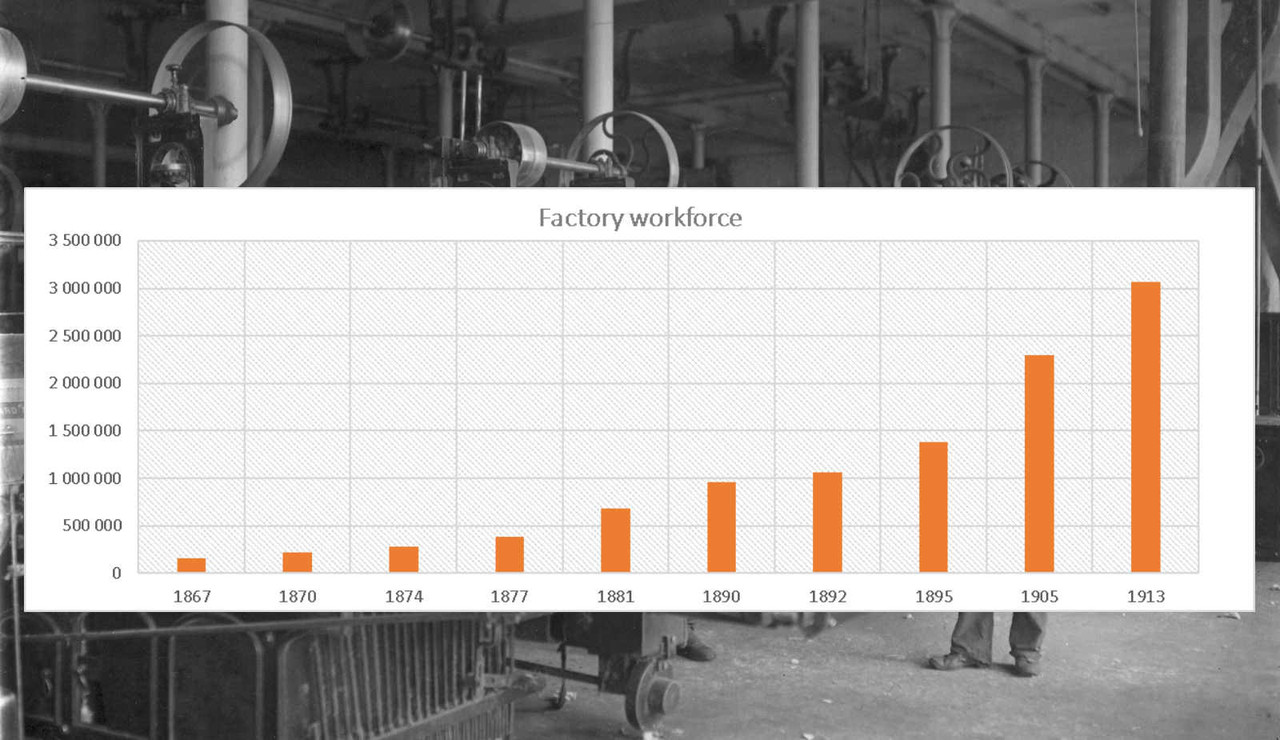
The Deputy, hearing to the Prime Minister’s speech, didn’t question some sort of economic development success in the Empire. He insisted on the fact, that some industries are still underdeveloped. Modern economy sectors, actively developing in the leading industrialized countries, like Roman Republic, England and Germany, did nor exist in Russia. The Russian Army has no tanks, telegraph and airplanes. Country heavily lags in both consumer and military technologies. Russia is not so glorious, high-chief civil servants and courtiers believe.
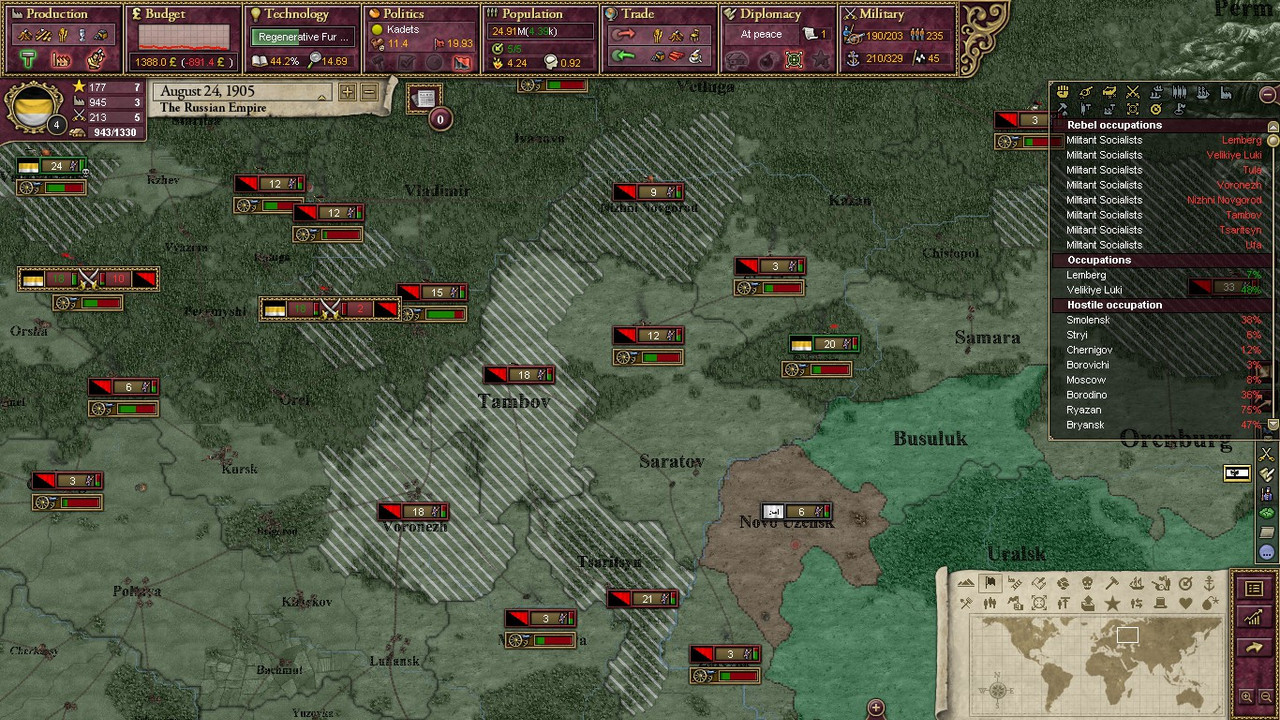
Deputy comes to tribune. He doesn’t stage on the fright and speaks bravely about terrible working conditions, poor school system, absence of pension system and safety regulation in the workplace. Militant combatants rebel almost every year, killing thousands of loyal troops and destroying property. Last year a major workers strike occurred in the country, government was forced to sent forces to put down a rebellion. Every year more than 5 000 persons flee the Empire because of fear of violence, persecution, and war, by emigrating to the USA, Argentina, and New Andalusia. The Russian Empire is not a very attractive place for life all over the world...

Deputy argues that government must change the policy of oppression and launch highly needed social reforms. The National Assembly should make Tsar abandon the policy of militarism and return to common people as the only way to resolve the ongoing social crisis in the Russian Empire. He stressed the country’s need for peace, social justice and social assistance like pension, unemployment benefits, and acceptable school system for everyone! After his impressive speech resistance of the conservative delegates has been crushed and Acceptable School System has been finally introduced in the Russian Empire. What is his name? Well, his name is Leo Trotsky.

- 1
- 1
I was wondering who our young friend would turn out to be… I wasn't disappointed! 
I wonder how far he'll rise in this world. Somehow I don't think he'll be swept up by history's tide before he can accomplish anything of note…
I wonder how far he'll rise in this world. Somehow I don't think he'll be swept up by history's tide before he can accomplish anything of note…
- 1
Who knows? He is definitely a promising young man from the leftist faction. The Emperial political system is very turbulent, so he might get a chance to advance.I was wondering who our young friend would turn out to be… I wasn't disappointed!
I wonder how far he'll rise in this world. Somehow I don't think he'll be swept up by history's tide before he can accomplish anything of note…
- 1
Chapter V. Stolypin. Failed Statesman (1905-1915)
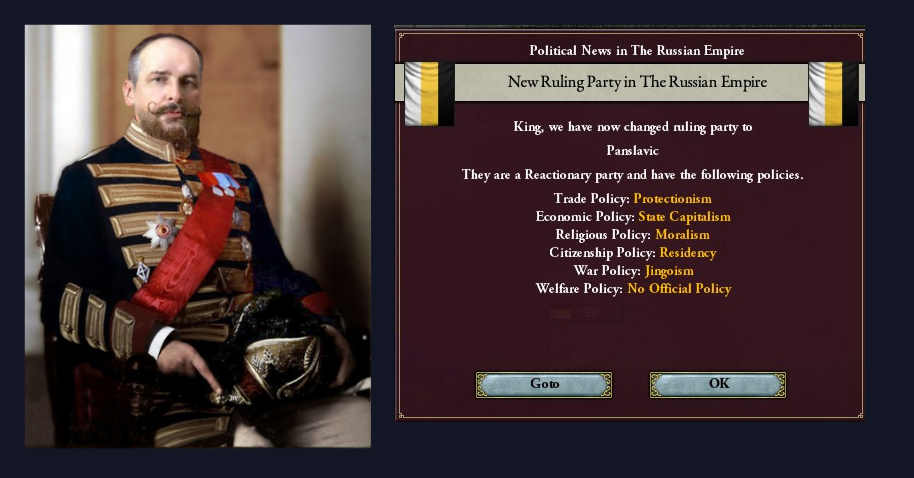
Pyotr Stolypin became a Prime Minister on 12 November, 1910. His predecessor, Pyotr Struve, was forced to step down after the lost confidence of Tsar Nicholas II Meri. Despite formal victory in the Russian-Japanese War (1908-1910), the country suffered heavy casualties and equipment losses. Russian ground forces showed low combat skills because of bad command, lack in supply and unsatisfactory organization. The troops of Gurgan, an ally of the Japan Empire, managed to cross the Caucuses mountains and burned the eastern coast of Azov Sea. So, Tsar decided to replace the Minister Cabinet by reactionary government.
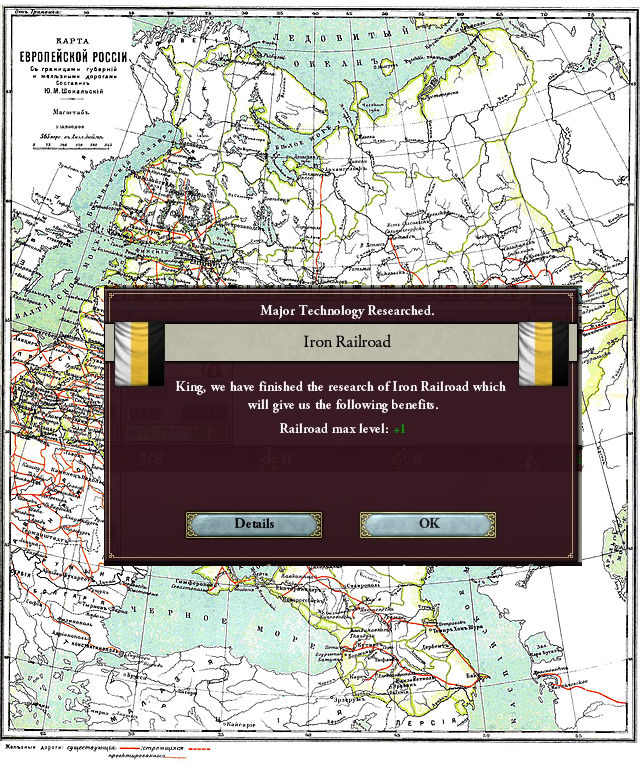
Pyotr Stolypin was born on 13 July. 1861 in a wealthy noble family. He got home education and graduated from St. Petersburg State University with excellent marks. He joined Civil Service in 1876, when Tsar Alexandr II Meri established reactionary Minister cabinet. He appointed Sergey Witte as a Prime Minister. Pyotr Stolypin became an assistant at the Department of Infrastructure. He was actively involved in the expansion of Iron Railroads (31.05.1878), upgrade of ship guard in St. Petersburg (13.03.1880), and deployment of numerous fabrics across the whole country.

Tsar Alexandr II Meri was assassinated on 11 March, 1882 and the Russian Empire faced civil disorder. Sergey Witte took all responsibility for punitive campaign against the rebels to rescue the Empire from collapse (1882-1885). Pyotr Stolypin was next to him and got promotion after the suppression of the First Russian Revolution. In the following years (1885-1892). Pyotr Stolypin assisted Sergey Witte in accelerating economic development. Railroads, modern factories, defense fortifications and great improvements in farming and mining were in his sphere of influence.

Everything has changed to him in the end of 1892. State budget couldn’t stand up to megalomanic projects like Trans-Siberian Railroad and state defaulted on debts on 2 September, 1892. Financial crash has inevitably led to political crisis, the leftist radicals began plotting against the government to seize power violently. Alexandr III Meri, a mentally-ill (insane) person, was guided by reactionary circles. They were well ahead of the revolutionaries and dissolved the Senate first. Tsar staged a coup d’état! Loyal troops had stormed the Senate building, killing many civilians and opposite deputies. Sergey Witte was arrested, he committed suicide ten days later. Pyotr Stolypin was hopefully was went into exile only.
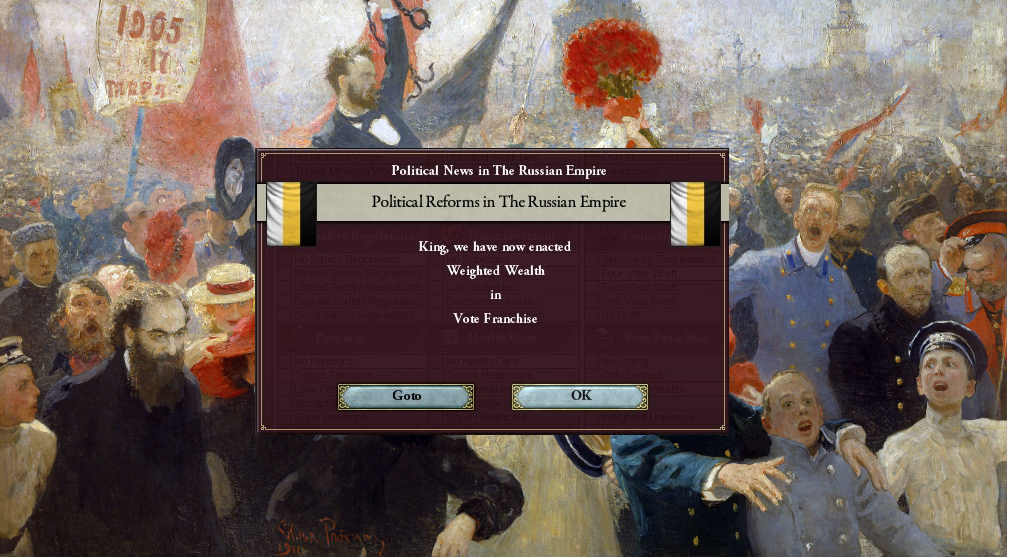
In the following ten years Pyotr Stolypin served as a General-governor in Kiev, where he was from. He continued to expand railroad network, construct fabrics and improve port facilities within Kiev region. Liberal Dictatorship of Loris-Melikov lasted for 7 years and ended in the establishment of National Assembly in 1899. Age-old dream of the Russian intellectuals has fulfilled at last. The Russians have finally gained political representation, and the Russian Empire transformed into Constitutional Monarchy. Tsar Nicholas II Meri, who ascended the throne one year later after the death of Alexandr III Meri, had to adopt the Constitution he hated from all the heart.
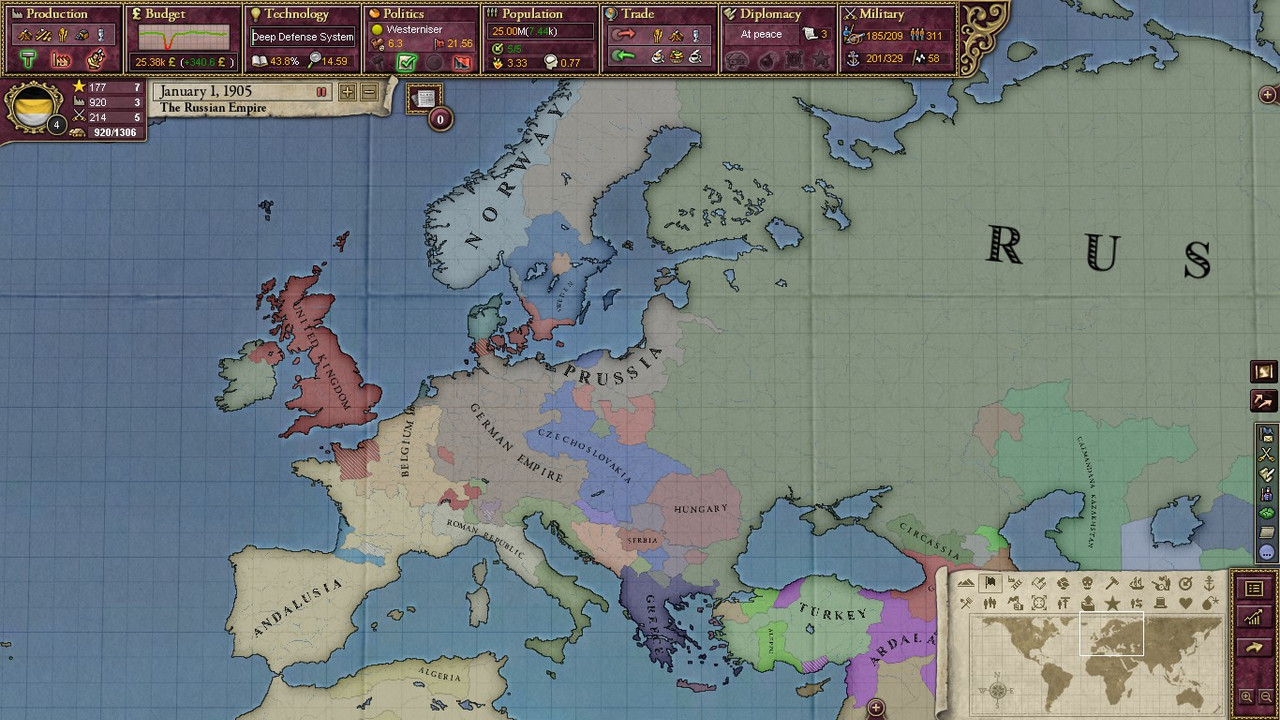
The Second Balkan War broke out in the beginning of the 1900s. Despite heavy losses and unending bribery scandals, involving Chief Staff and Royal Court, the Russian armies were able to defeat the forces of Czechoslovakia. After the war the Balkan states, like Serbia, Bulgaria, Bosnia and Macedonia, gained finally independence. But, more importantly, the South German Federation was transformed into the German Empire. Pyotr Stolypin as a member of the Senate supported Tsar all the time and Nicholas II Meri mentioned his.
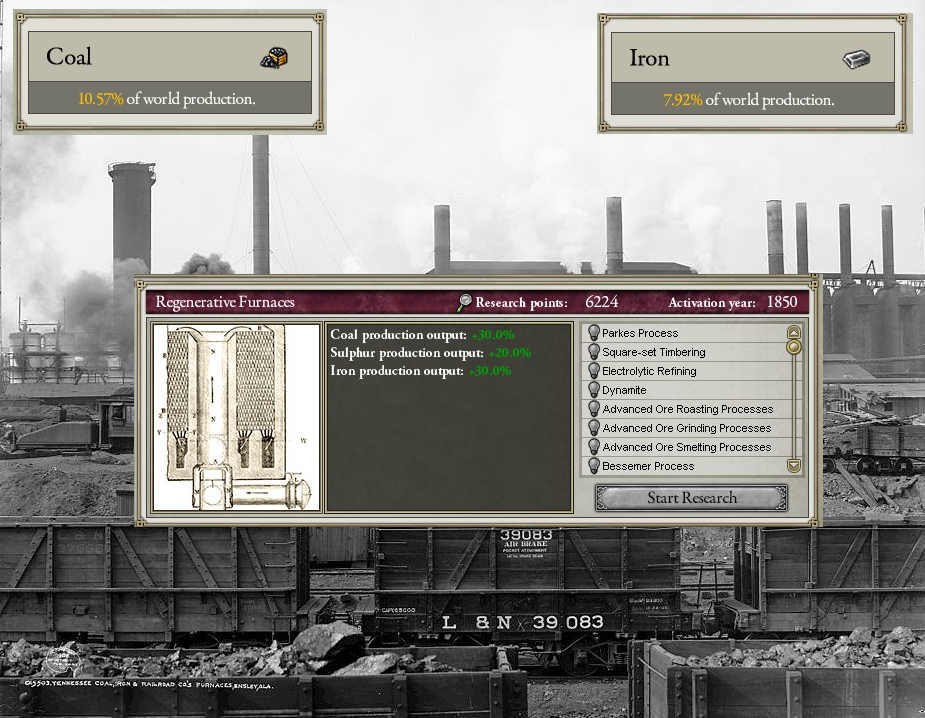
Pyotr Stolypin was elected Head of Industrial Commission during the Second Duma (1904-1908). He argued that national economy had severe shortage of vital raw resources like coal, iron and silk, He authored a set of major reforms within Coal production, which resulted in coal output boosts by 50%. Factories, producing iron and steel, received thousands of tons of highly needed resource.

During the Russian-Japanese war (1908-1910) Pyotr Stolypin publicly criticized the Government for corruption and bad army’s supply, insisting on large-scale reforms in military industrial complex. A report of young man Michael Frunze, who served at the front as an artillery officer, was brought to his attention. Army was ill-equipped, poorly paid and undermanned. War was won only owing to extremely bad condition of the Japanese Fleet. Russian vessels managed to set up a naval blockade of Japan, preventing transport of troops and supplies in this way.

But in so doing, he avoided criticizing army itself and General Staff as many the socialist deputies. Performances of Stolypin in the Senate with the analysis of losses during the recent war brought him huge popularity among the Royal Court. Tsar Nicholas II Meri gladly dismiss Pyotr Struve from the post of Prime Minister and appoint Pyotr Stolypin on 02 September, 1910. Pyotr Stolypin, who was a 50-years-old nobleman successfully returned to politics, he led the movement against both socialism as well as liberalism, that threatened stability of the Empire. Pyotr Stolypin was a strong Prime Minister and enforced his authority with great vigour for five years from 1910 to 1915. He effectively accelerated economic development and crippled the leftist radical movement. Most of the red ringleaders were exiled or terrified to raise rebellion. These times were quite peaceful, especially in comparison with the previous years of terror and labor strikes.
Ground Forces and Royal Navy re-equipping with new machinery was carried according to the state plan. Ground Forces got modern warfare and ammunition (Gutling gun, 1910), while Royal Fleet was finally replenished with monitor in 1912. Military logistic and organization were also considerably improved since the entry into force new Army Field Regulation in 1911. Another significant development was the introduction of Elastic Defense System in the end of 1913. Network of tunnels and trenches would strengthen army to resist enemy massive attack. The Russian Empire was actively rearming in anticipation of renewed hostilities on the continent.
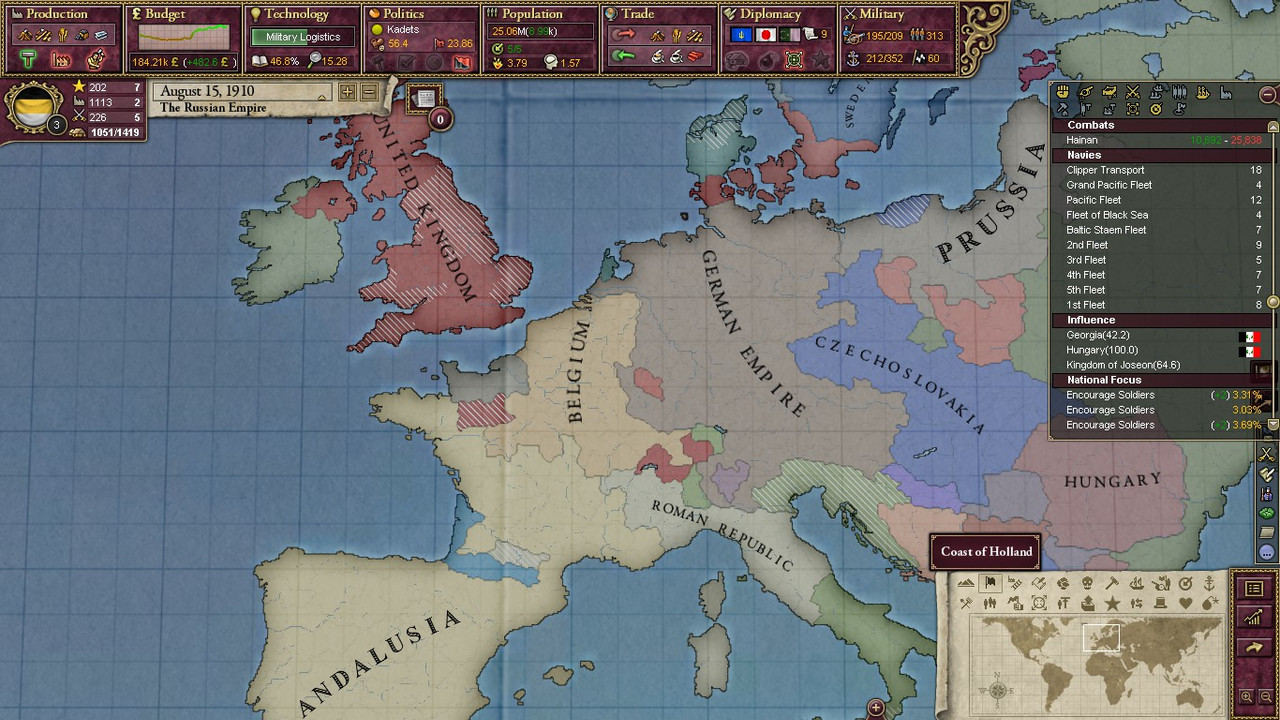
The German Empire continued aggressive territorial expansion toward the East by conquering the Prussian and Czechoslovakian lands. Defeat of Czechoslovakia generated tensions between the states on the Balkans. Sebia claimed some provinces of Bosnia, while Macedonia feuded with Greece and Bulgaria. The Balkans was a real political powder keg of Europe waiting to explode in a war.
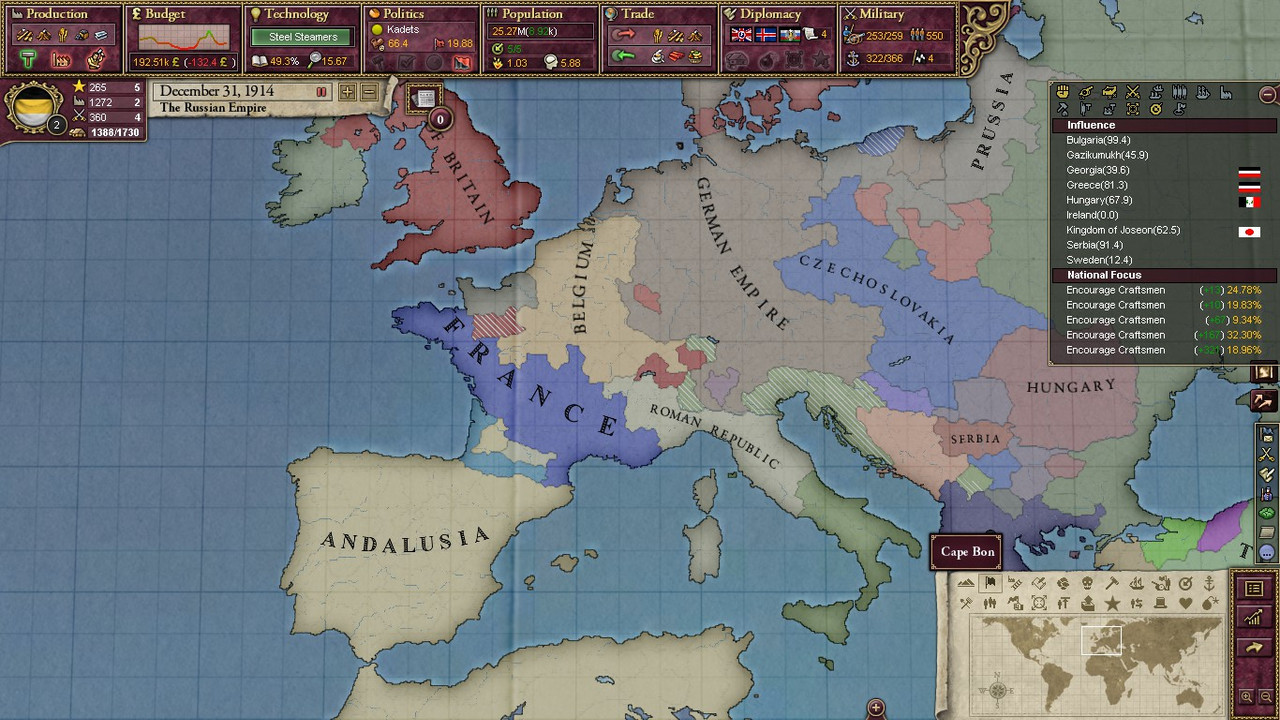
France raised from the ashes again in the last of 1910. Andalusia granted independence to the Frenchman as a result of pressure from Belgium and the United Kingdom. Great powers of Europe made Andalusia return cored French provinces and refrain from any military actions. After the centuries of foreign oppression, the French finally acquired their own national state.
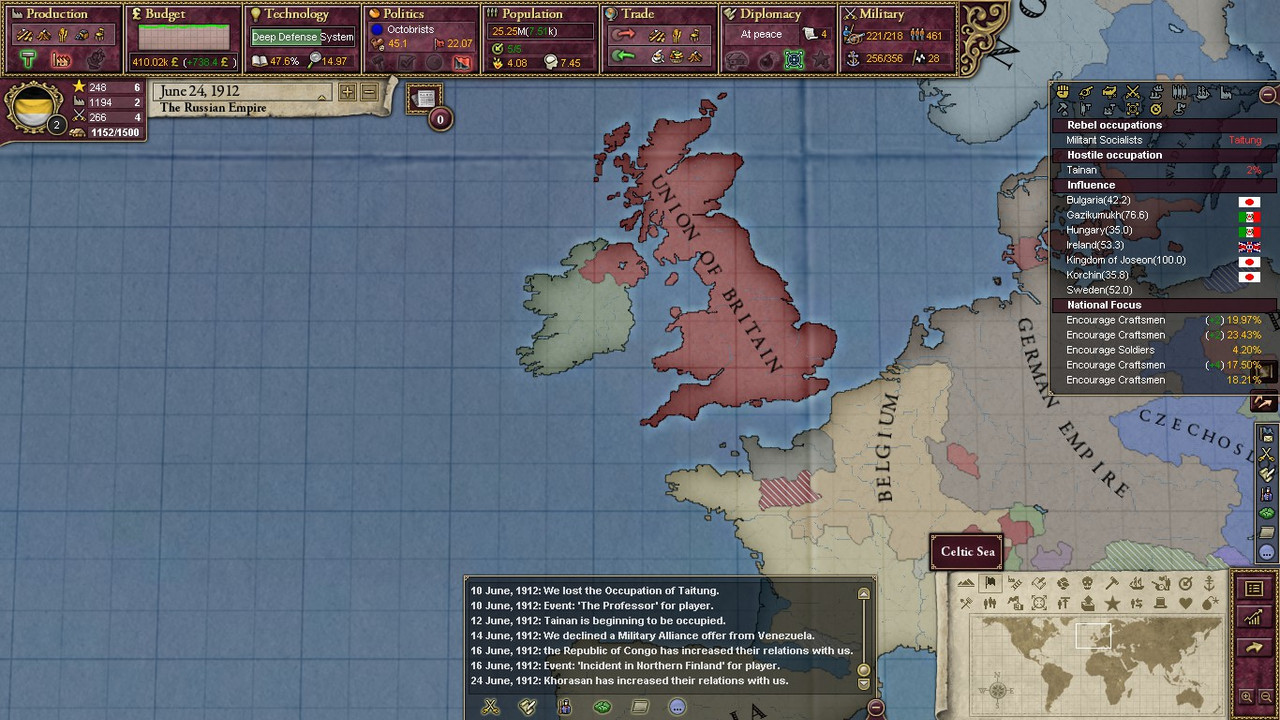
The United Kingdom went through three revolutions in less than a year (from August 1911 to March 1912). First, the communist faction raised rebellion and captured Royal Palace of Westminster. Royal Family managed to flee the country and went to Belgium. Two months later the Liberals counterattacked and put the red radicals out of London. Thus, the UK became a Republic ruled by Parliament. However, the fascist gangs led by Alfred Beresford, a retired military officer, suddenly stormed the building Parliament and took power in March 1912. Alfred Beresford attempted to impose a fascist dictatorship on the British islands. That is terrible!
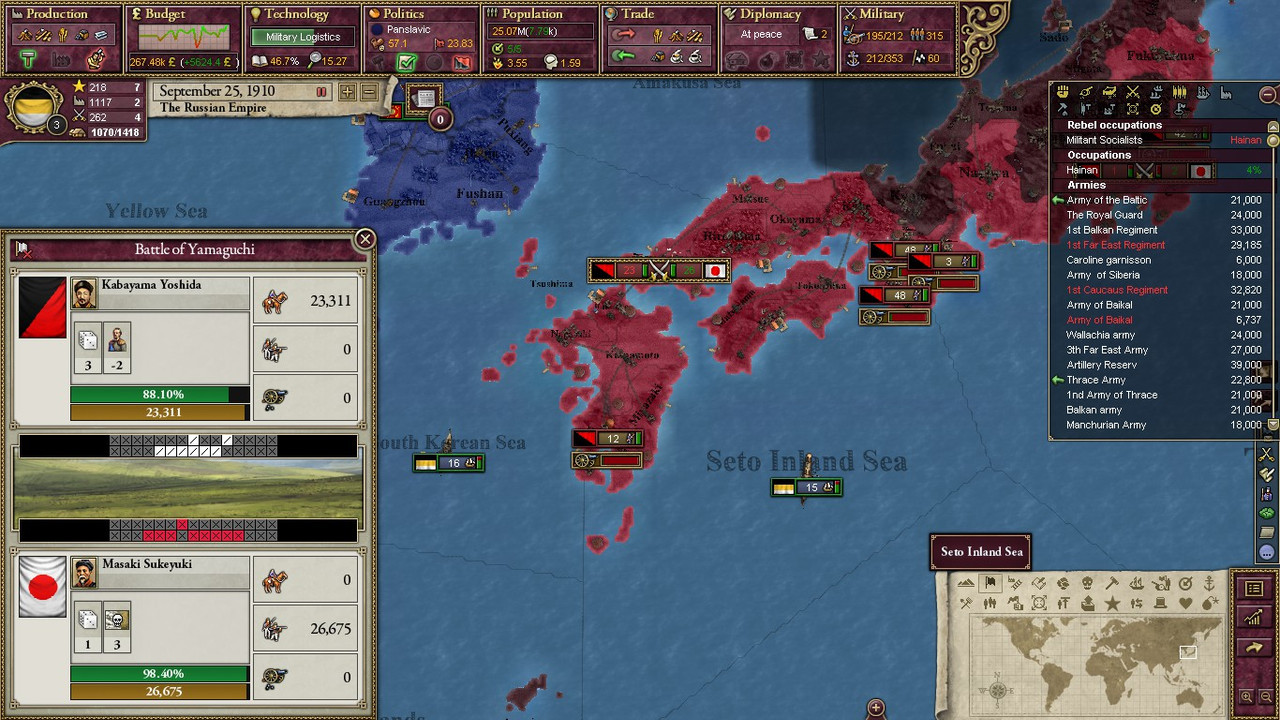
Japan suffered the worst political disaster and horrible devastation on the other side of the world. After the losing the recent war Japan collapsed into chaos. The Fascists upraised in Tokyo on 25 September, 1910. Next five years they could win the civil war and took sole control of the country. They established the dictatorship of terror and violence. Japan embarked on the path of war and aggression in Asia. The Russian Imperial Forces tried to bring support to Japan to resist the radicals, but these efforts proved futile.
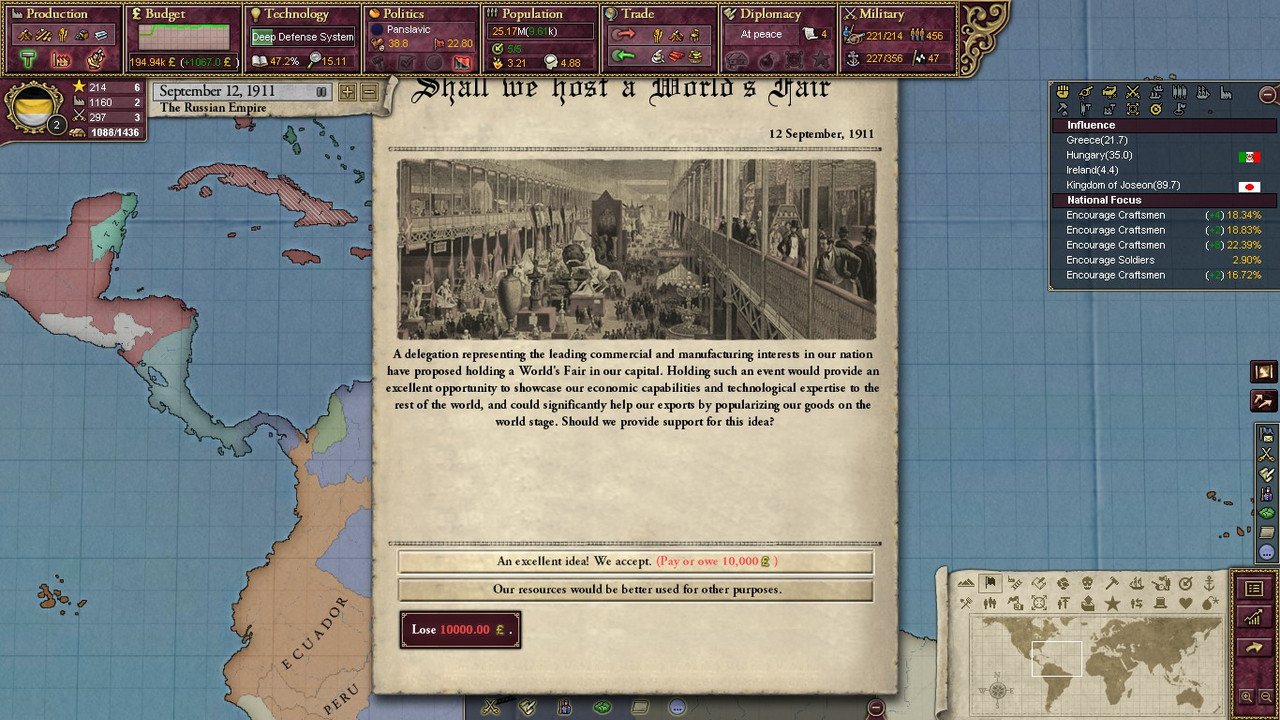
Russia was an island of stability and relative security for a while. Number of craftsmen exceeded 3 Mln. persons and gross domestic product raised by about 50%. Russia was a leading producer of Steel, Fabric, Furniture and Iron. Modern consumer goods loke automobiles and telephones were actively imported from Roman Republic and the German Empire, making Russia a highly attractive market. World’s Fair took place in the end of 1911 in St. Petersburg. The exhibition was held under the honorary of Prime Minister Pyotr Stolypin. It was the highlight of his career…
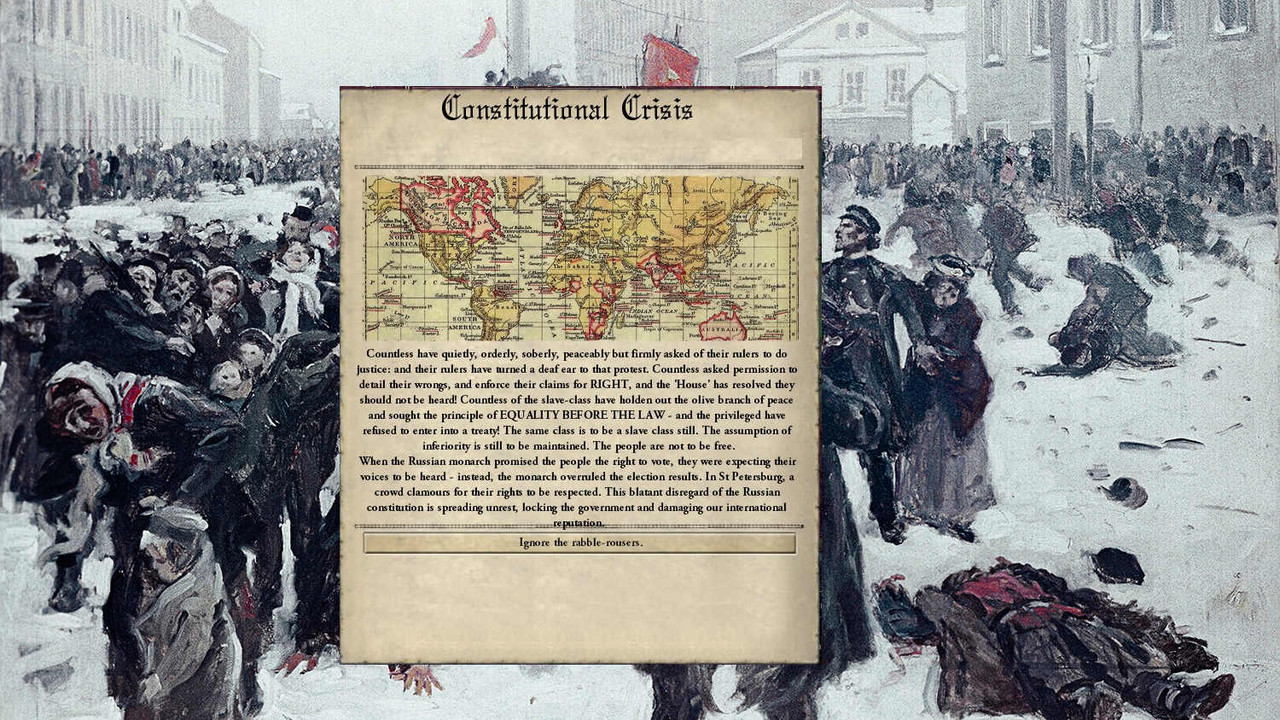
The Third Duma was elected on 1 July 1912. Despite the liberals won election by landslide, Tsar decided to keep Prime Minister from the reactionary faction. Pyotr Stolypin tried to save good relations with Parliament, but the most of deputies were determined to oppose the government by all means. Illegal appointment of Prime Minister provoked the Constitutional Crysis of the July Days. A large crowd gathered outside the Winter Palace, they were peaceful and only wanted to speak with Tsar.
People, demanding for equal vote representation and respecting for their rights, were harshly suppressed using gunfire. Bloody Sunday of 07 July 1912, undermined the people’s belief in Monarchy because of unjustified violence against peaceful citizens. Tsar Nicholas II Meri lost his popularity and love among the nation forever, he acquired the nickname “Butcher”. Six days later on 07 July the Prime Minister Pyotr Stolypin resigned under the circumstances caused by massacre at St. Petersburg.
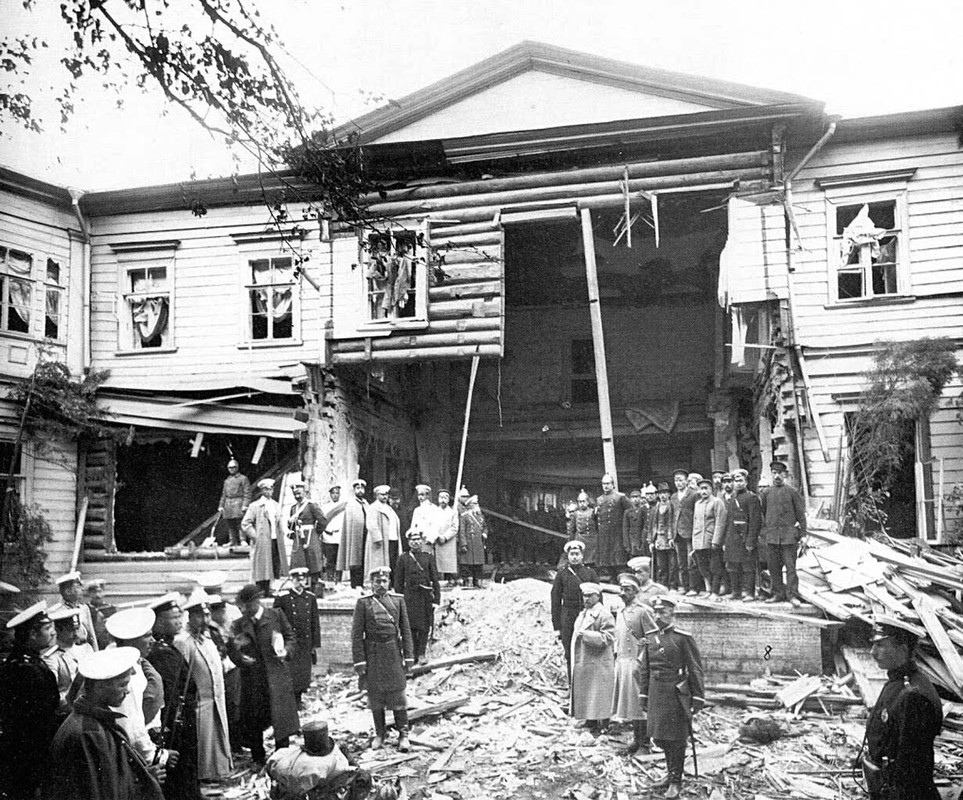
His was cut short on 10 November, 1914, when a band of terrorists made successful attempt on the life of former Prime Minister by bombing his country house. Exploding bomb killed Pyotr Stolypin and injured his family. Teir bodies were buried under the debris of destroyed home. A day of mourning was declared in the Russian Empire. A great statesman, who joined the ranks of unofficial “Regents” like Onton Tichanov, Sofia Romanov and his teacher Sergey Witte, died after more than 30 years of proud civil service.
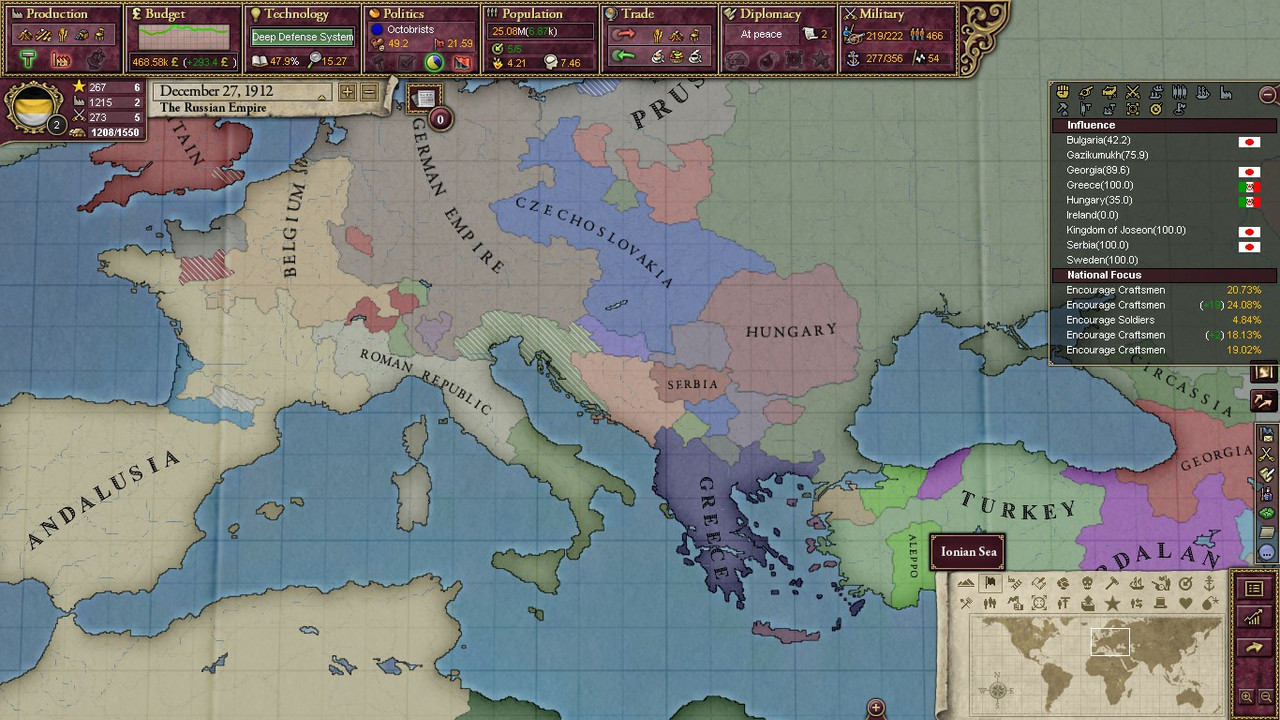
Terrorists were arrested on the outcomes of investigation in the late 1916. They belonged to secret society named secret society named “Dead Arm”. This secret society consisted of the Serbian nationalists who were plotting coup against Stolypin to push Tsar Nicholas II Meri towards the war of the Serbian Restoration. Serbia claimed lands of Bosnia, a satellite of the powerful German Empire. Russia had miliary alliance with Belgium and Italy, avowed enemies of Germany. The First World War broke out next year after the assassination of Stolypin. Russia proposed ultimatum to Bosnia to return the cored Serbian lands and withdraw heavy weapons from the region. Bosnia rejected the Ultimatum and requested support from the German Empire. The War began.

Chapter VI. Frunze. Fall of The Empire (1905-1917)
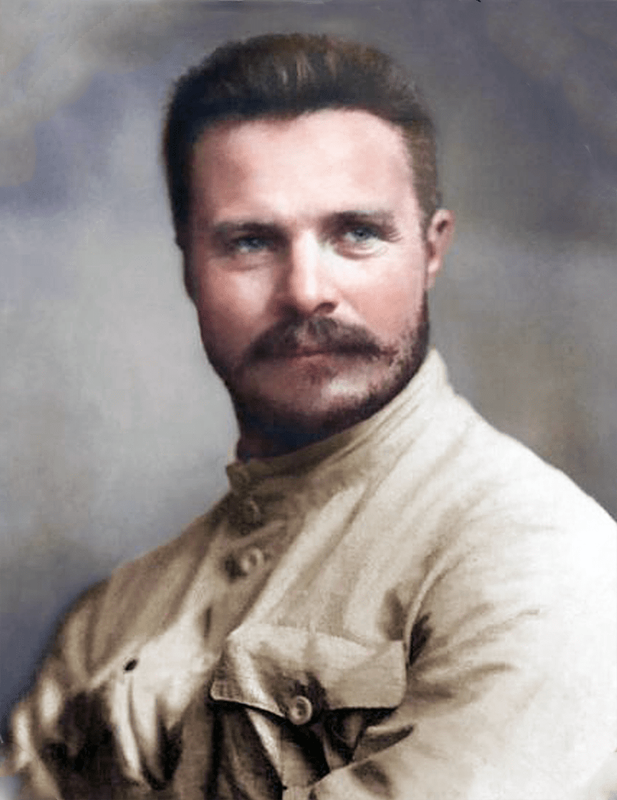
Michail Frunze was born in 1883 in Tver to a working-class family. His father worked at a factory, which produced one of the leading export goods – furniture. During the Witte’s industrial reforms, the factory, where the Frunze’s father worked, scaled twofold and he was promoted to a clerk in 1895. Furniture industry was a profitable business, so he could pay school education of his son. Young Michail entered a Realschule in Tver having an excellent education.
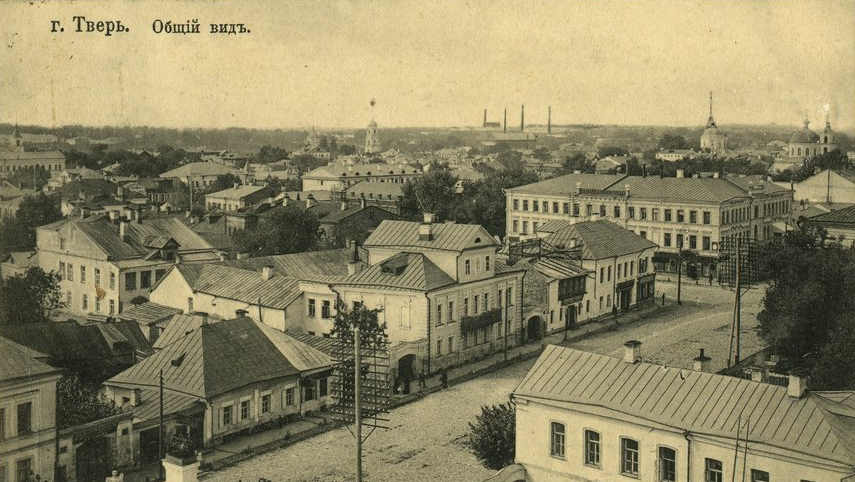
There are some words about the city, where Michail was born. Tver had been a capital of the Russian Tsardom for a long time. After the conversion to catholic faith, King Alexandr moved the capital from Moscow to Tver in 1432. He has chosen Tver as a major trade city and bulwark of the new Catholic faith in Russia. The Tverian period in the Russian history was marked by continuous expansion to all points of the compass: Siberia, Black Sea, Finland and Caucasus.
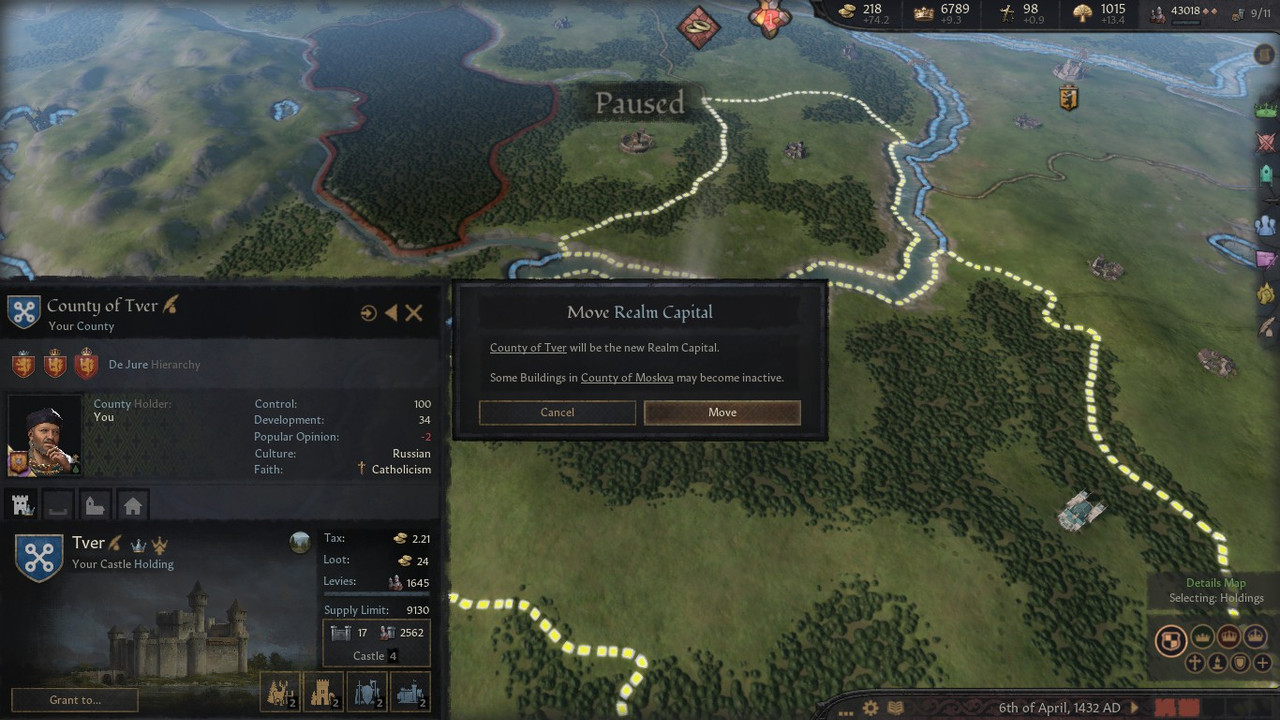
Tsar Peter the Great founded Saint-Petersburg in 1703 as a new capital of the renewed Russian Empire, oriented at the West. Despite losing the status of capital, Tver continued to be an important economic and military center. The Tombs of the Meri’s located in Tver, and every new Tsar visited the city after coronation. Nicholas II Meri was at Tver in June 1900. And a young boy could see the Tsar on the father’s shoulders in a crowd. Tver has become one of the most developed regions on a par with Moscow, Vladimir and Kazan up to the end of XIX century. Thousands of labors worked at factories, supplying army by artillery, ammunition, and small arms. Civil economy was presented by furniture, forest industry and machine parts. Tver was a real workshop of Russia.
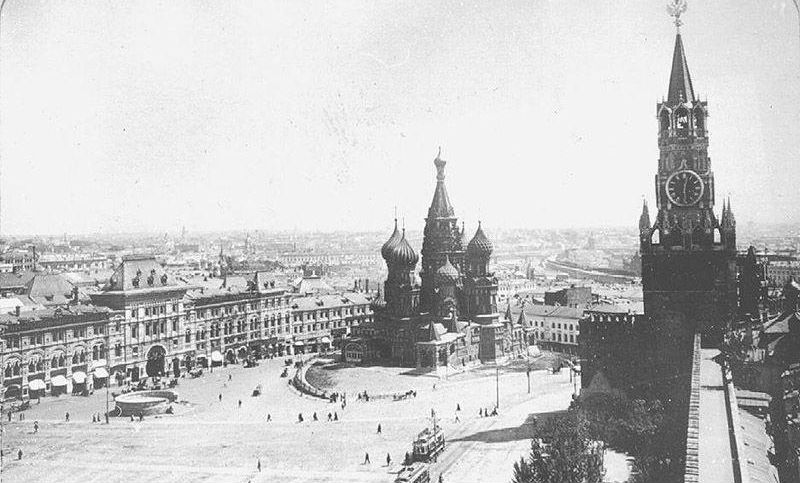
However, Michial Frunze didn’t become a worker. In 1897, he graduated with distinction from Realschule and then enlisted in the Cadet Corp in Moscow. Parents were able to pay for university education, but the boy chose military career and attended the Military Academy as a cadet. He was a well-built boy, who loves horse-riding, shooting and physical exercise. Moscow was a heart of the Russian Military-Industrial Complex, where soldiers and officers were obtaining military skills.
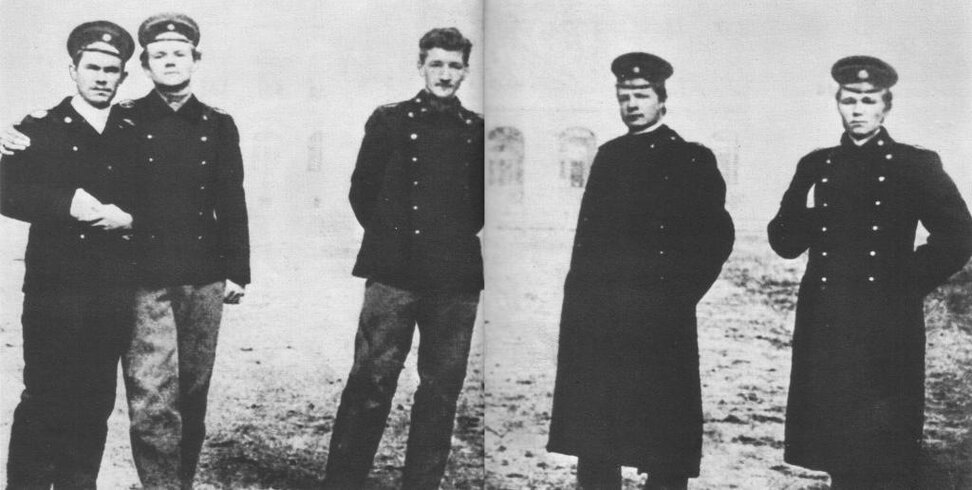
Michial Frunze studied at the Academy from 1897 to 1905. Cadets worked through an intensive curse of military art by the experts, who were fighting during the Balkan War (1900-1904). Michial Frunze went to the front at Headquarter of the Russian Balkan Army in the last year of education (21 years old). The war was over and the Russian army gradually and slow was leaving Czechoslovakia, looting small towns and pillaging villages on the path toward Russia. High Command condoned looting despite the complaints from local citizens and peasants.
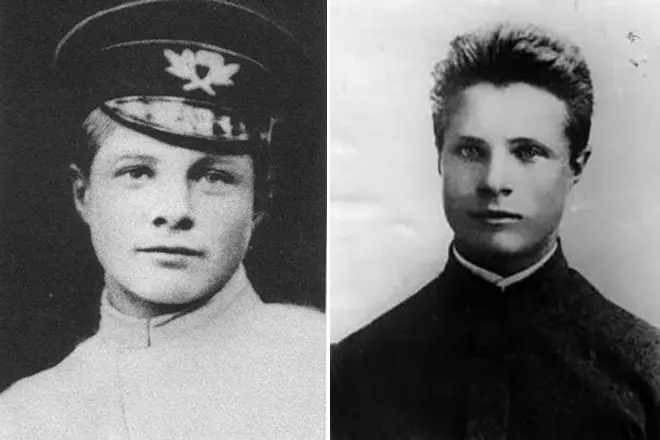
He graduated the Academy with excellent remarks and later he was sent to military service at the Far East. Tsar Nicholas II Meri turned to the East, facing strong resistance from the Japanese Empire. Japan had successfully implemented modernization of society and become an Empire in the mid XIX. A new-born Asian Empire invaded and occupied the weakened and unmodernized Korea in the 1890s, that was contested by the ruling circles in the Russian Empire. Korea was perceived as a de facto satellite of Russia, after the series of wars with Manchuria.

Port Arthur was a naval base and stronghold of Russia in Manchuria. Michial Frunze arrived there in March 1906 as a junior officer under the command of General Kuropatkin. Russian Ground Forces as well as Pacific Ocean Squadron were preparing for the coming war with Japan. Michial Frunze was enrolled in the Okhotsk Life Guards Regiment in the rank of lieutenant. Next two years he was improving his martial art skills in artillery, combat engineering and fortification. In 1908 he was advanced to the rank of First Lieutenant.
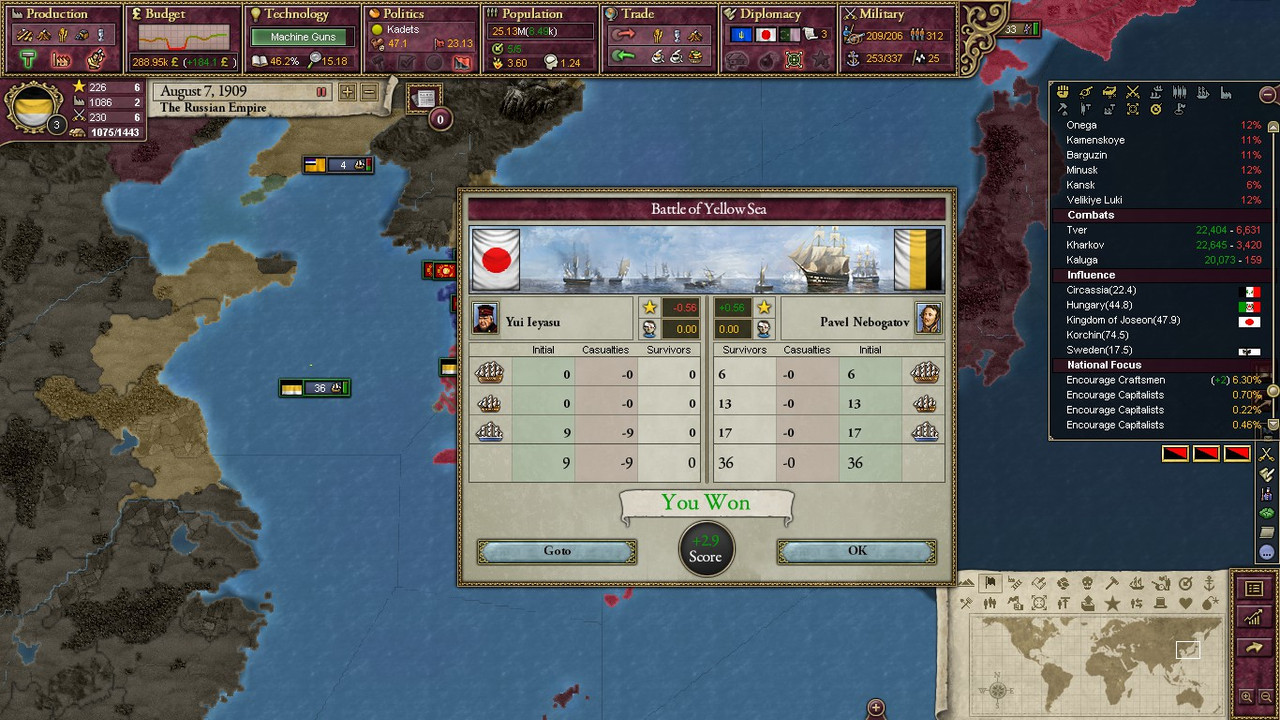
The Russian-Japanese War broke out on 17 June 1908 by attacking the Japanese Fleet in Yellow Sea. Tsar Nicholas II Meri decided to strike first! During 20-hours naval battle enemy vessels were burned; bodies of killed men were everywhere, ripped to pieces. The Russian fleet began to hunt weak and disorganized enemy ships around the Japanese isles. Japan was soon completely blockaded, that had severe detrimental effects on economy and military forces.
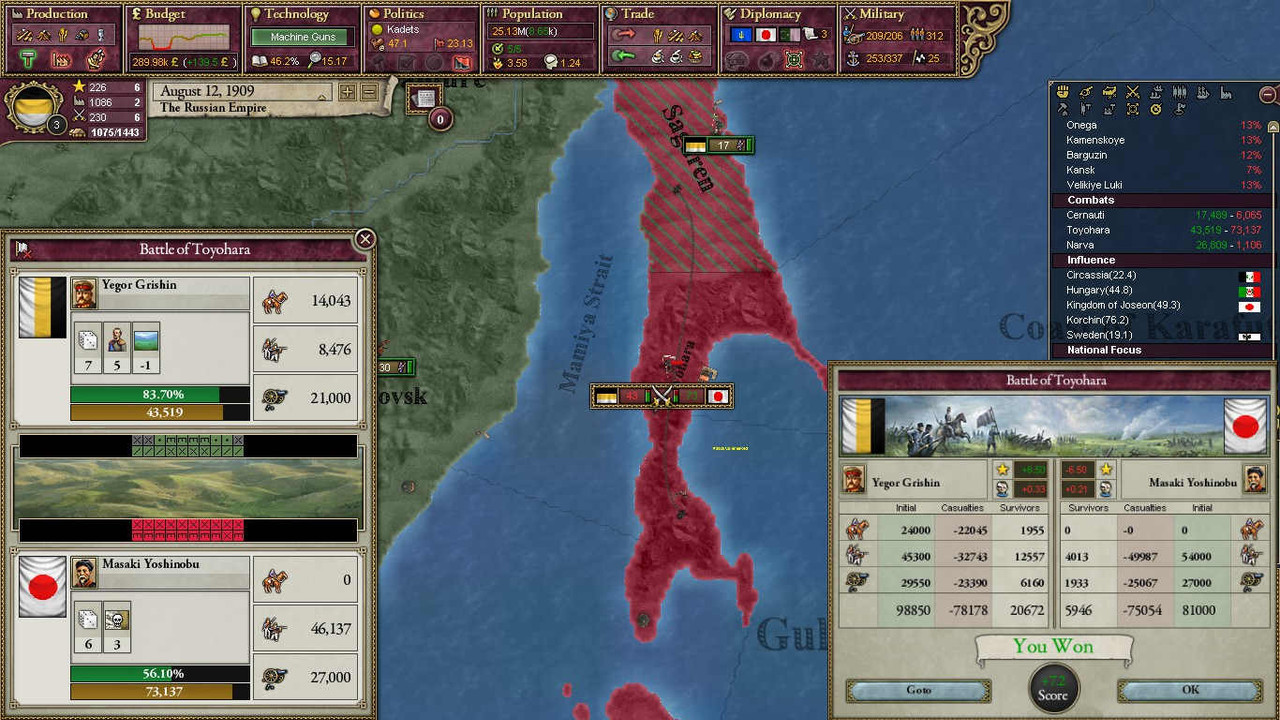
Ground Forces invaded the Sakhalin Island and suddenly attacked the Japanese garrison. Despite the superior in number, the Russian army won the battle with heavy causalities: more than 70 000 soldiers were killed during the battle lasted for about 4 months. Enemy could retreat to homeland – the Russian fleet was distracted by clashes with the Japanese monitors, and the garrison of Sakhalin Island managed to rescue encirclement.
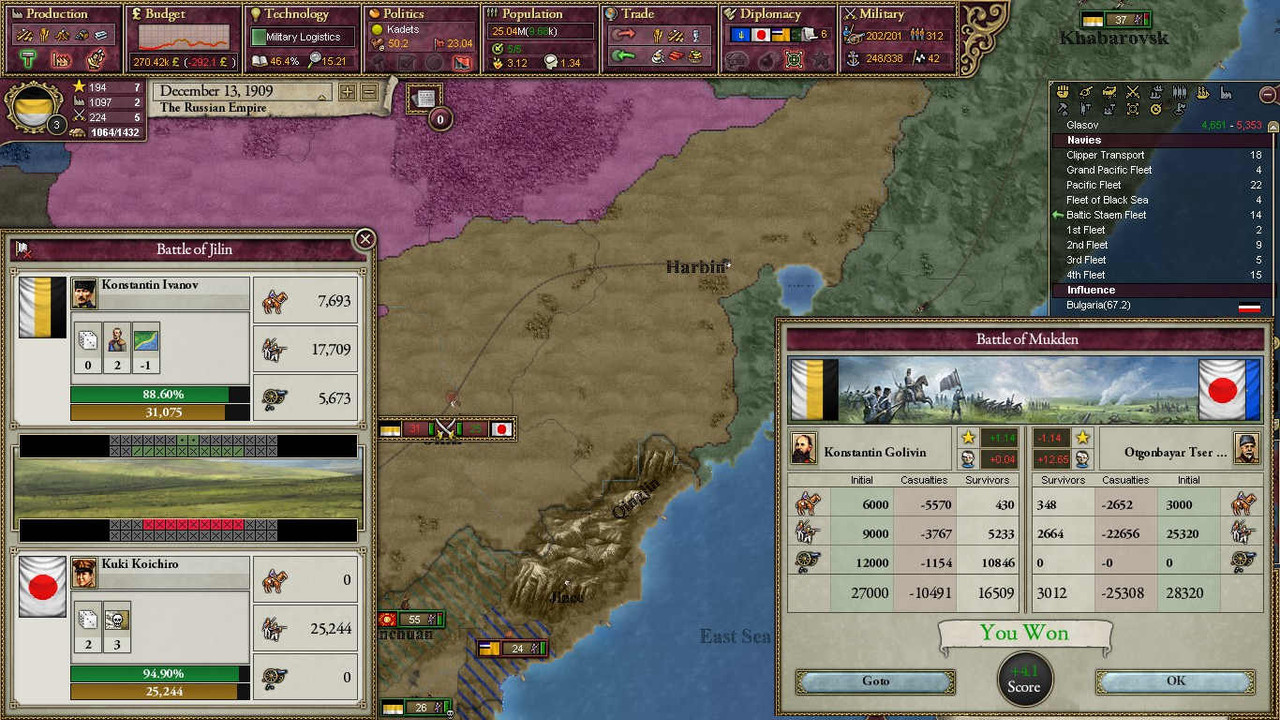
Michial Frunze took part in a few of land battles in Manchuria during the war. The Japanese continental forces were cut off from the ally troops by sea blockade. They tried to break through to the main body of the Japanese occupation forces in Korea. However, General Konstantin Ivanov managed to intercept them. The battle was extremely tough and bloody, the Russian troops met with stubborn resistance from the moving Japanese army. After the months of maneuvers and small clashes, the Japanese were encircled and destroyed.
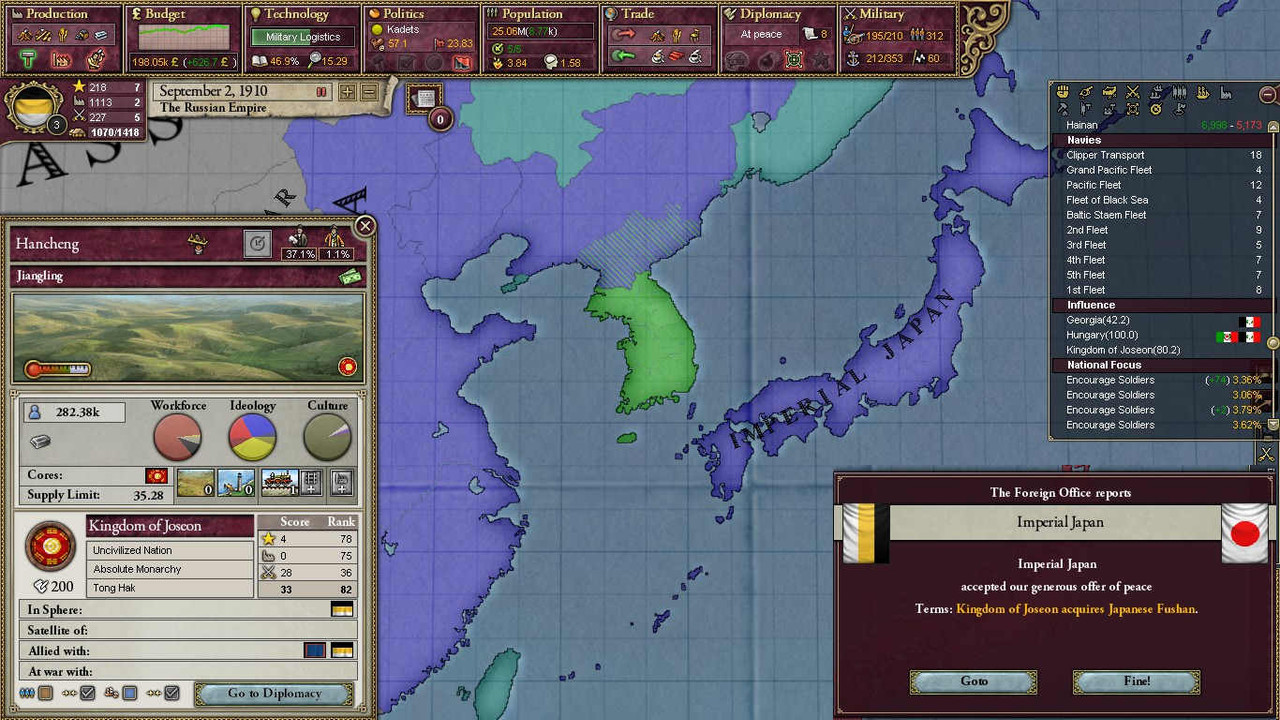
Our hero was decorated for bravery and later given command of infantry regiment with the grade of Captain. The Frunze’s regiment went to Korea to liberate the country from hostile occupation after the winning the Mukden battle. Local people greatly welcomed the Russian troops, who arrived in Korea. They hated the Japanese occupants because of their awful racial policy and segregation. Michial Frunze, a 25-yaer-old officer, was happy to be a liberator for the oppressed people.
Peace Treaty was soon signed on 2 September, 1910. Japan returned to Korea all the cored lands and paid reparations to Russia. Occupation troops had to get out the Korean Peninsula and Manchuria. The Treaty ended the imperialist aspirations of the Japanese Empire in Asia. Japan, that was exhausted by the war, collapsed twenty days after the signing the shameful peace agreement. The Fascists faction raised rebellion against the royal government in the north, while the communists upraised in the south. Within the months the Japanese Empire slipped into chaos. Fascists won the civil war lasted for three years (1913).
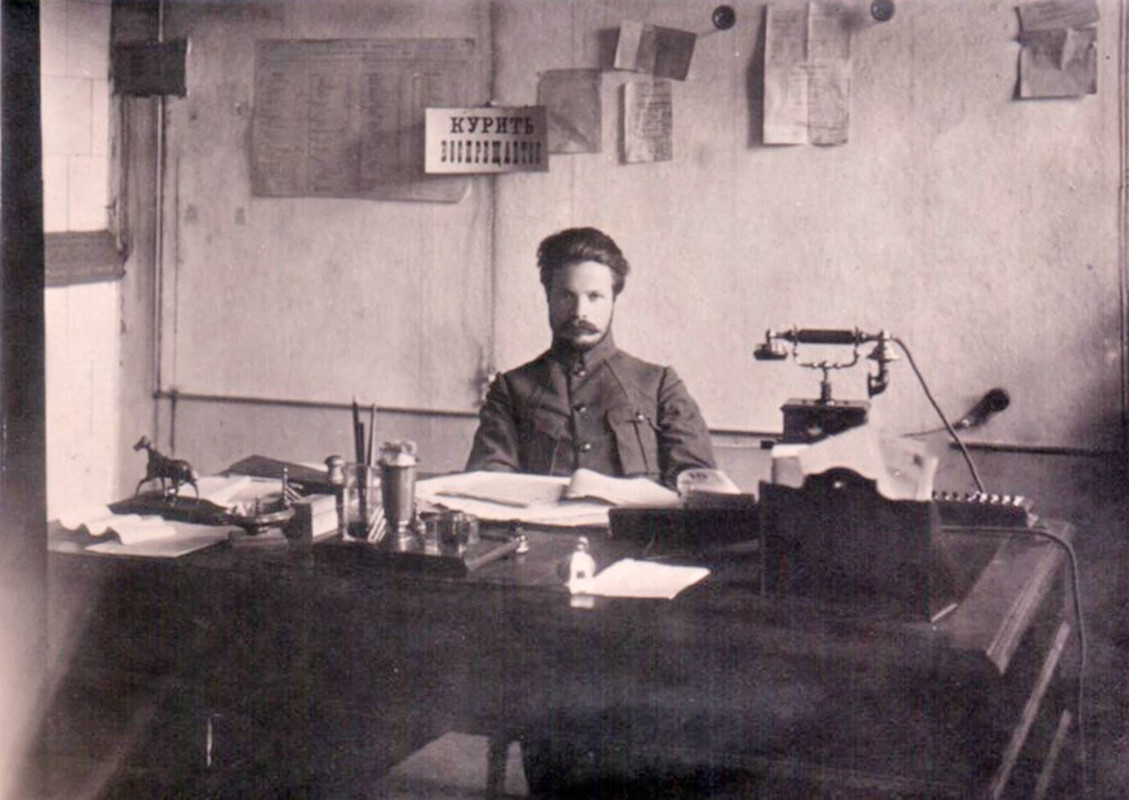
Michial Frunze continued his service in the Russian Manchurian Army as a commander of field artillery regiment. The regiment settled down near Port Arthur to protect the fortress. Garisson duties led to boredom, so the most of the officers were indulged in gambling, alcohol and love affairs. In contrast to other officers, serving at Port Arthur Michial Frunze was getting into reading the socialist literature but not leisure. After studying the Marxist section of economic literature, arrested from the Japanese communists, he decided to join the Bolsheviks party led by Vladimir Lenin.
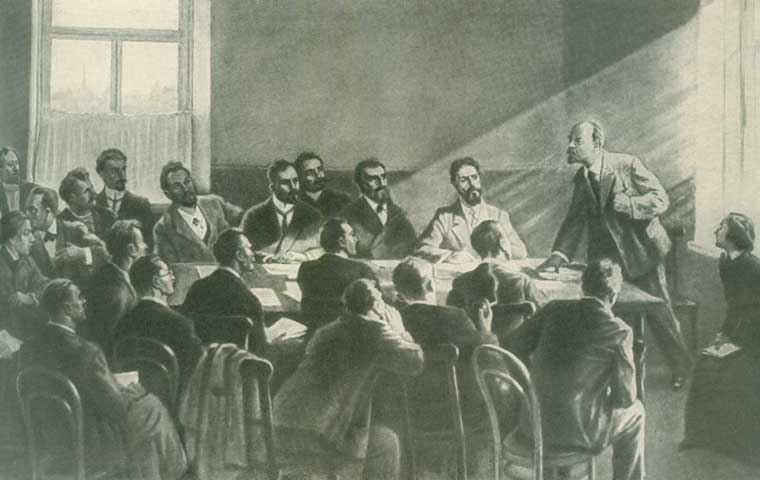
A small political party of radical socialists was founded under the leadership of Vladimir Lenin in 1903.The Bolsheviks called for expropriation of private property, social justice and strong labor state against the outdated political system of the tsarist Russia. Michial Frunze joined a secret circle of the Bolsheviks after the massacre in St. Petersburg in 1911. Thousands of unarmed people were shot near the walls of Winter Palace. Horrific crime deeply shocked the conscience of nation! Michial Frunze decided to serve for the common people but not Tsars!!!
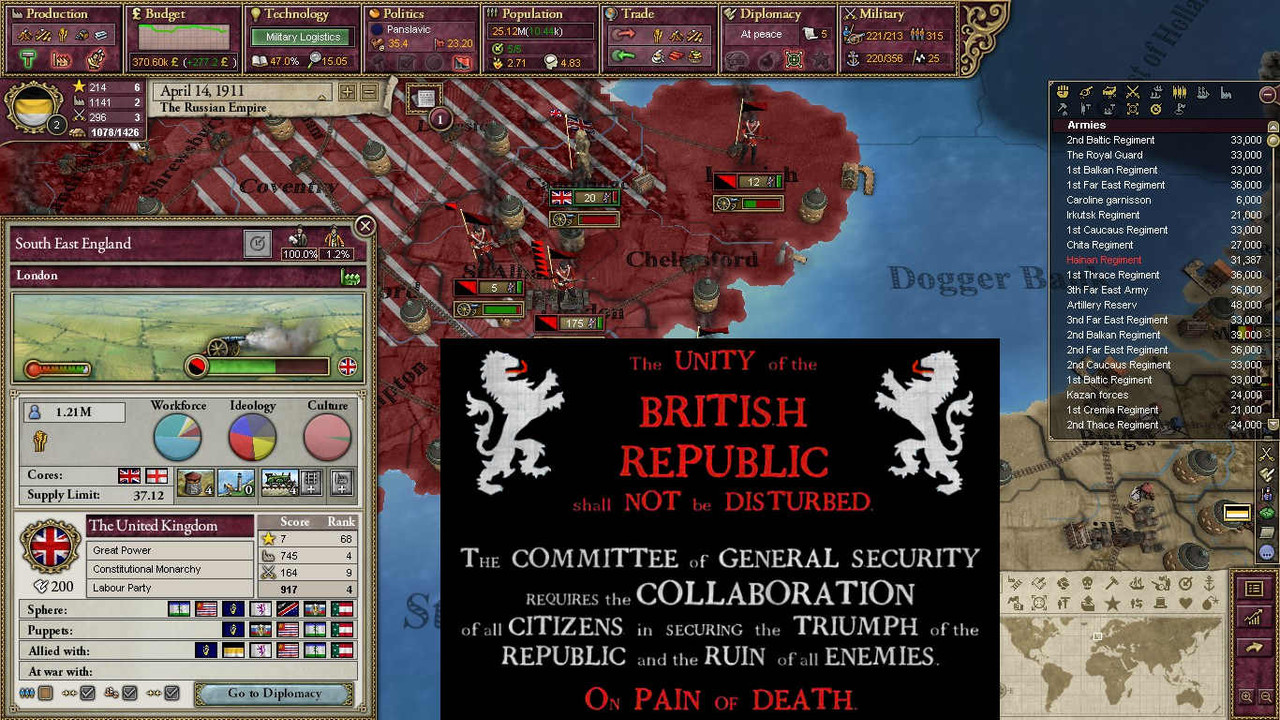
However, he was a soldier and had to join a punitive expedition against the people, whose beliefs he shared. The United Kingdom had been spared by huge unrest from the end of 1910. The British Communists, a radical socialist faction, rebelled against the Crown and successfully besieged London. The Russian Tsar took decision to provide military assistance to the British Monarchy in the form of Expeditionary Force. Michail Frunze was one of the excellent officers selected for participation in this deal. He neither wanted to kill the socialists nor leave military service.

The Russian Expeditionary Force arrived too late. At the time of landing, the British Government had capitulated and accepted all demands of the rebels. The British Monarchy was overthrown and replaced by the rule of the communists, but this was short-lived. The fascists brought the Red Government down and set up a fascist dictatorship. The Russian squadron left the British Isles and anchored at Kronstadt, a naval base of the Russian Baltic Fleet. Michail Frunze changed the place of military service and began servicing with the 1st Caucasus Army. He was later elevated to the rank of Colonel at the Imperial Army, stationed in southern Russia.
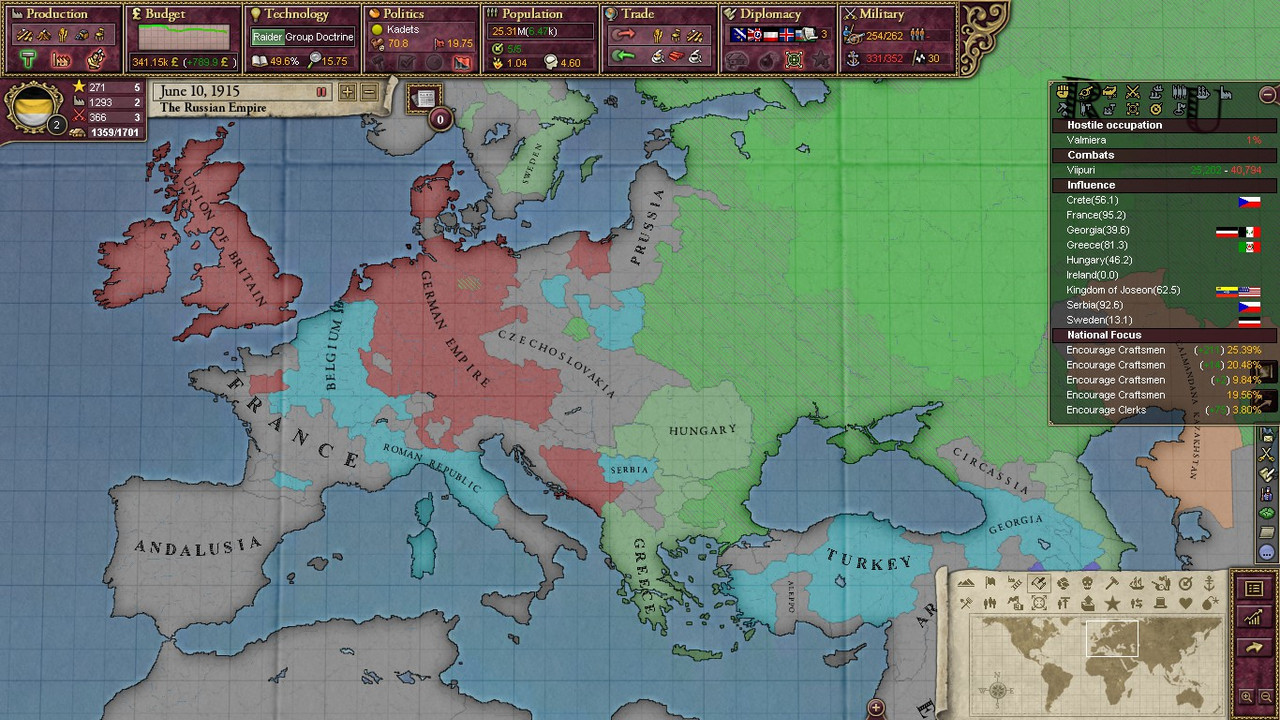
The Great War broke out on 08 June, 1915. The Russian Empire issued Bosnia-Herzegovina an ultimatum to return the Serbian provinces and withdraw from the disputed areas. Bosnia-Herzegovina rejected the ultimatum and Russia declared war on June 15. Bosnia-Herzegovina asked for help from the German Empire and the Great War began. Russia was supported by Belgium and Italy.

The Russian armies attacked the positions of the Bosnian and German troops, but soon were discarded and retreated into their own country. The Russian troops suffered defeats from the well-trained German Forces during the summer and autumn of 1915. The first victory took place only on 7 November, when the Russian army won the Battle of Grodno against the German forces, advancing towards Kiev. The Balkan Russian Army defeated the Bosnian troops and besieged Belgrade in the same month. The capital of Serbia was liberated five months later on 11 April, 1916. Plevna, a stronghold of the Bosnian defense line, had fallen in one month, and the Russian troops occupied all the territories of Bosnia-Herzegovina by the end of the year.
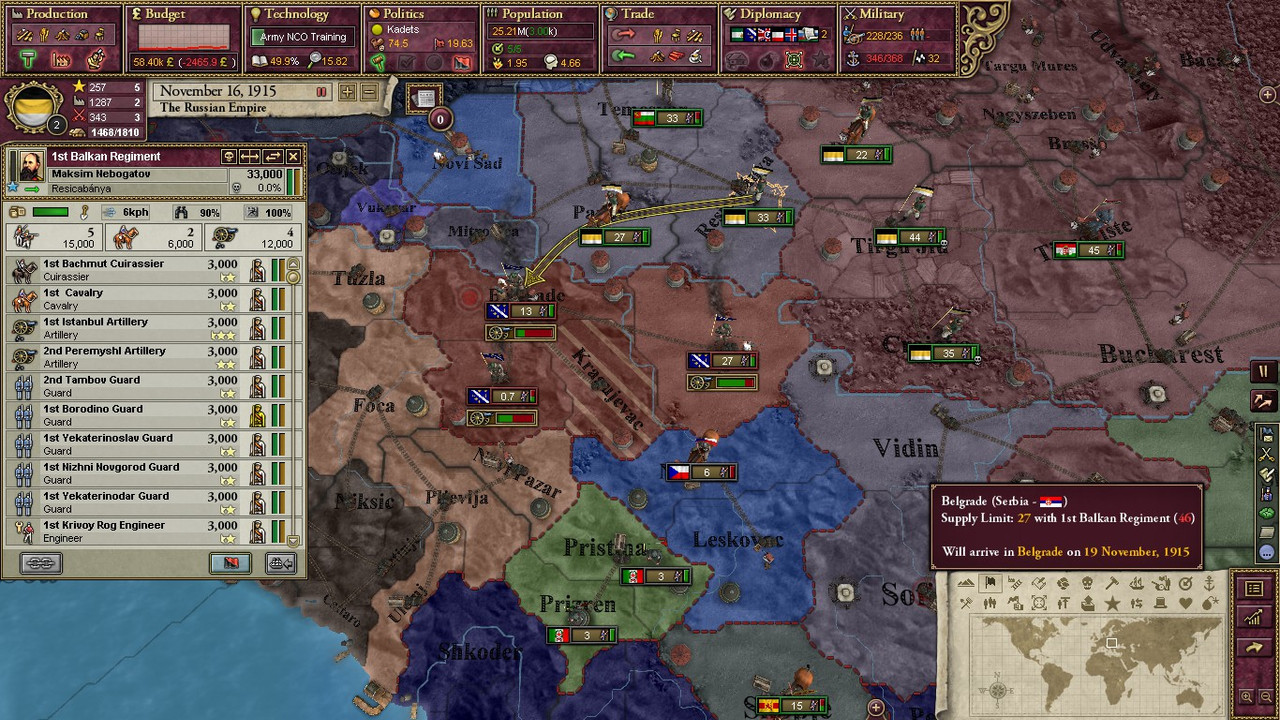
The Caucasus Army, where Michail Frunze served, joined the Great War only in the end of 1915, after horrific and shocking loses on the Western front. Colonel Michial Frunze took part in the liberation of Serbia, his regiment stormed Plevna. The Bosnian army was completely destroyed in a few months of fierce fighting. The Russian troops reached the borders of the allied Italy by the end of 1916. Unfortunately, the Russian armies were exhausted and had suffered heavy and irreplaceable losses on every front. Its allies – Belgum and Italy had capitulated and signed humiliating Treaties of Verdun and Venice.

After replenishing the reserves and recruited fresh forces for the attack, the German Empire was able to descend upon Russia from Konigsberg to Belgrade.The Western Front collapsed in the spring of 1917, when the outnumbered forces of the German Empire crushed the weak and disorganized Russian army, that was broking to pieces. The German regiments advanced towards St. Petersburg, Moscow and Constantinople step by step. Nothing could stop the German drive! On 22 May 1917, Riga fell, and the gate to St. Petersburg was open wide for the German Army.
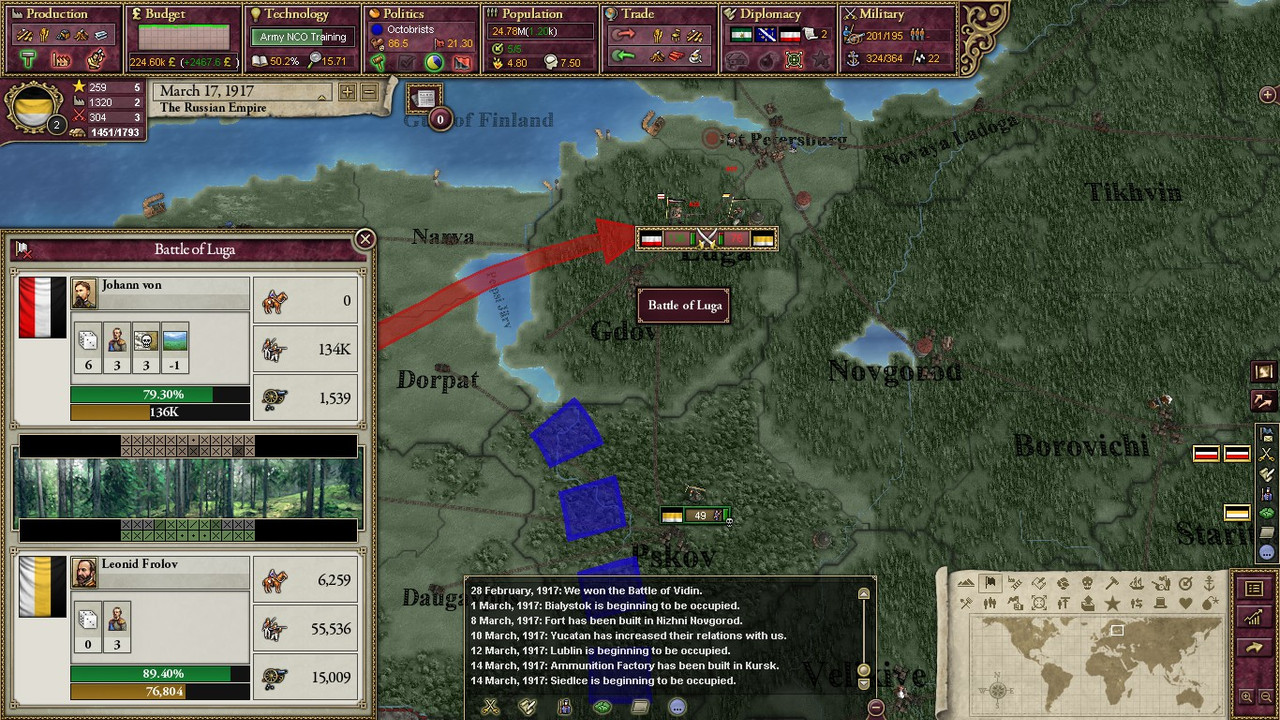
The Russian troops fought back the enemy at the Battle of Luga last time in the war (15 July 1917). Michial Frunze, who was recently elevated to General and received command of an infantry division, was seriously wounded in the leg. He was sent for treatment to the hospital in Moscow. His regiment was destroyed later in the Battle of Narva (20 October 1917). The German army surrounded the capital of the Russian Empie and Tsar Nicholas II Meri had to negotiate. Peace negotiations lasted for two months and ended on 03 December 1917 after the Treaty of Saint-Petersburg (Shameful Treaty).
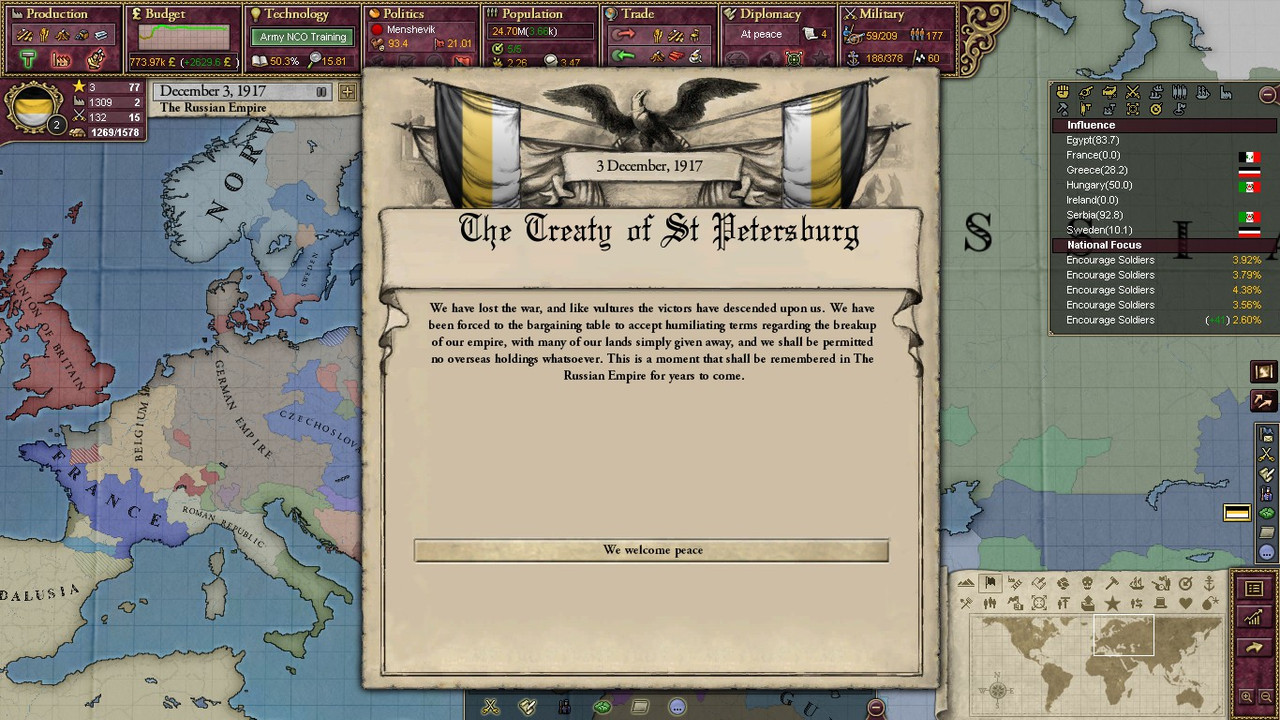
Michial Frunze was overcome with anger at hearing about the Treaty of St. Petersburg. The Russian Empire fatally lost the war and ceased to exist, having lost huge continental territories and all the colonies in Asia and Far East. Poland, Estonia, Latvia, Belorussia and Ukraine had hopefully gained long-awaited independence under the protection of the German Empire, providing to them all needed military, diplomatic and financial support. He retired from the army in the following year and settled in Tver, where his parents lived. Frunze believed that his millitary career is over, and it's time to return to peacefull life. He was only 35 years old.
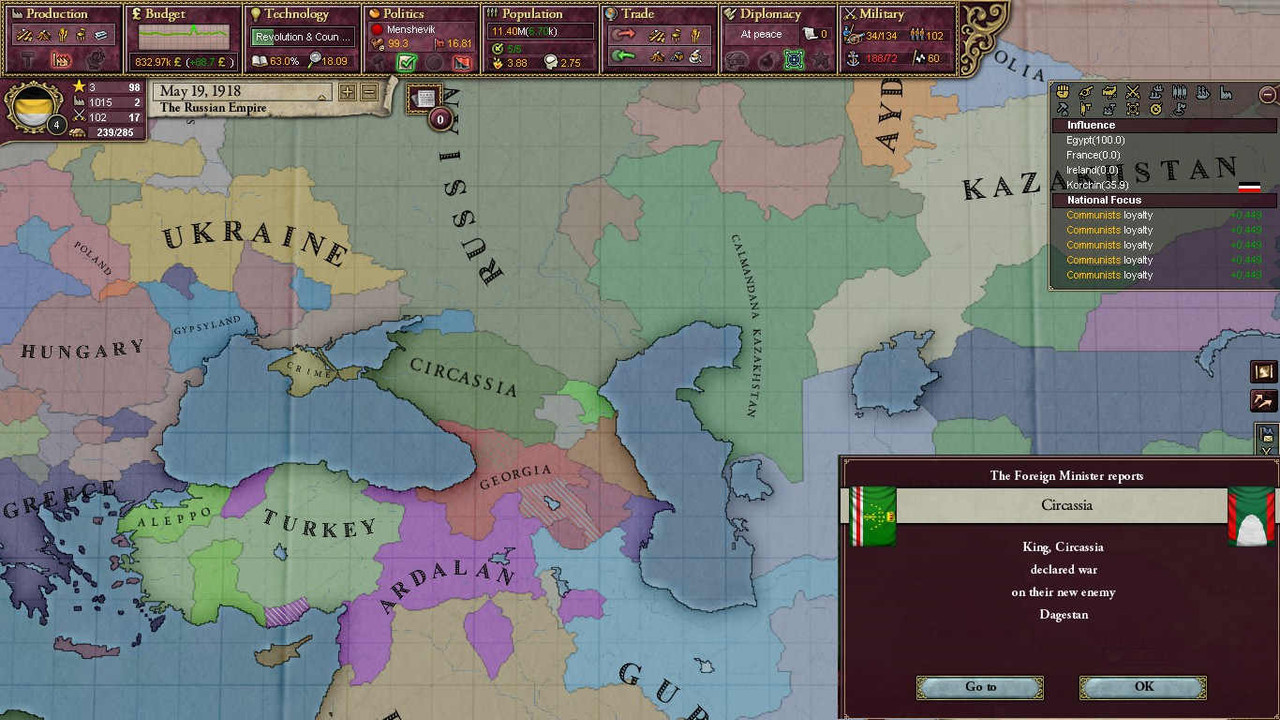
Circassia, the most economically developed vasal of the Russia Empire, declared independence and soon began attacking the neighboring countries like Dagestan, Azerbaijan, and Armenia. Military warehouses of the Russian army were looted and Circassia was soon capable of equipping big army. Georgia gained liberty and began fighting against Circassia for dominance in the region, involving other Caucasian states such as Armenia. Transcaucasian alliance was formed to resist aggressive policy of Circassia, that has treacherously acquired a huge piece of the Russian provinces on the South.
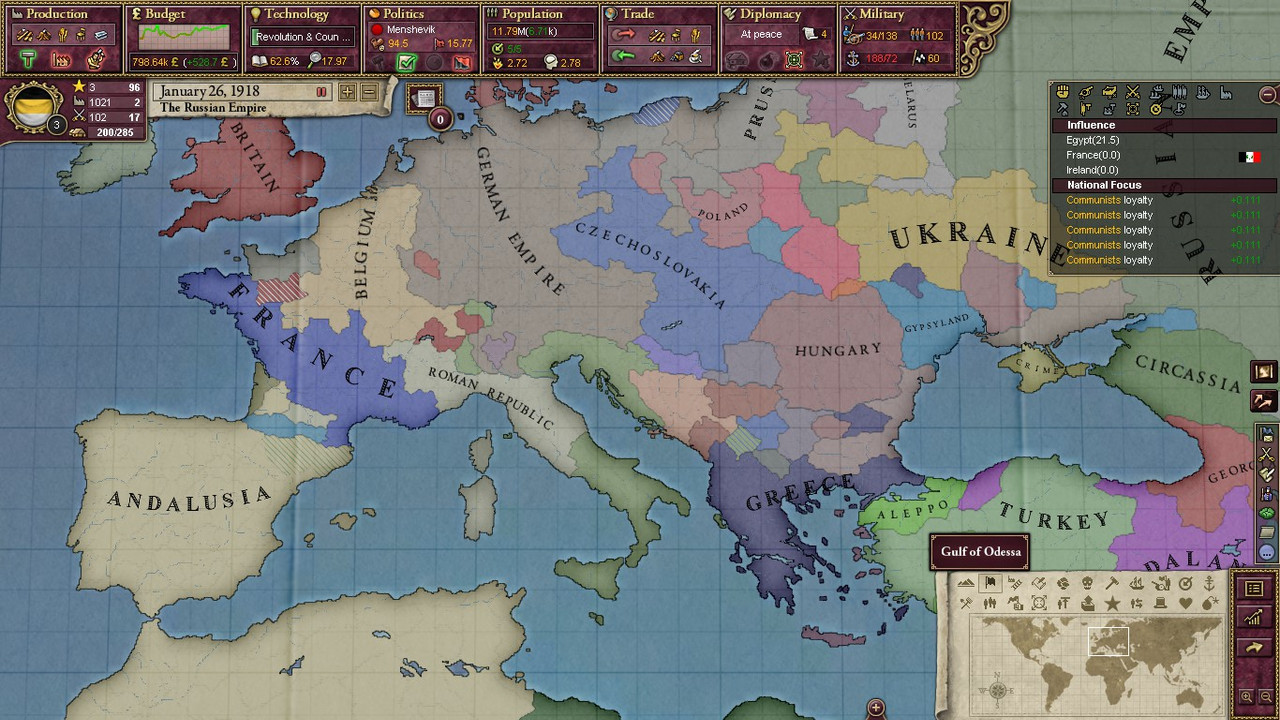
The Russian Empire had to transfer Constantinople and the surrounding areas to Greece. A huge crowd surrounded the Governor’s Palace in Constantinople and forced to restore the land to its legitimate owner – Greece. Emperor Alexandr I Meri solemnly entered the city a hundred years ago. His crowned successors Nicholas I Meri and Alexandr II Meri strengthened the Russian presence on the Balkans by sword and tough diplomacy. And now all is lost… Serbia, Bulgaria, Hungary, Macedonia and Greece left the sphere of the Russia’s influence, and they Immediately began to fight against each other. Hungary attacked Bulgaria, while Greece annexed Macedonia after a short but bloody invasion. During the 1920s, in country after country, the fascists seized power either by the parliamentary way or a palace coup.
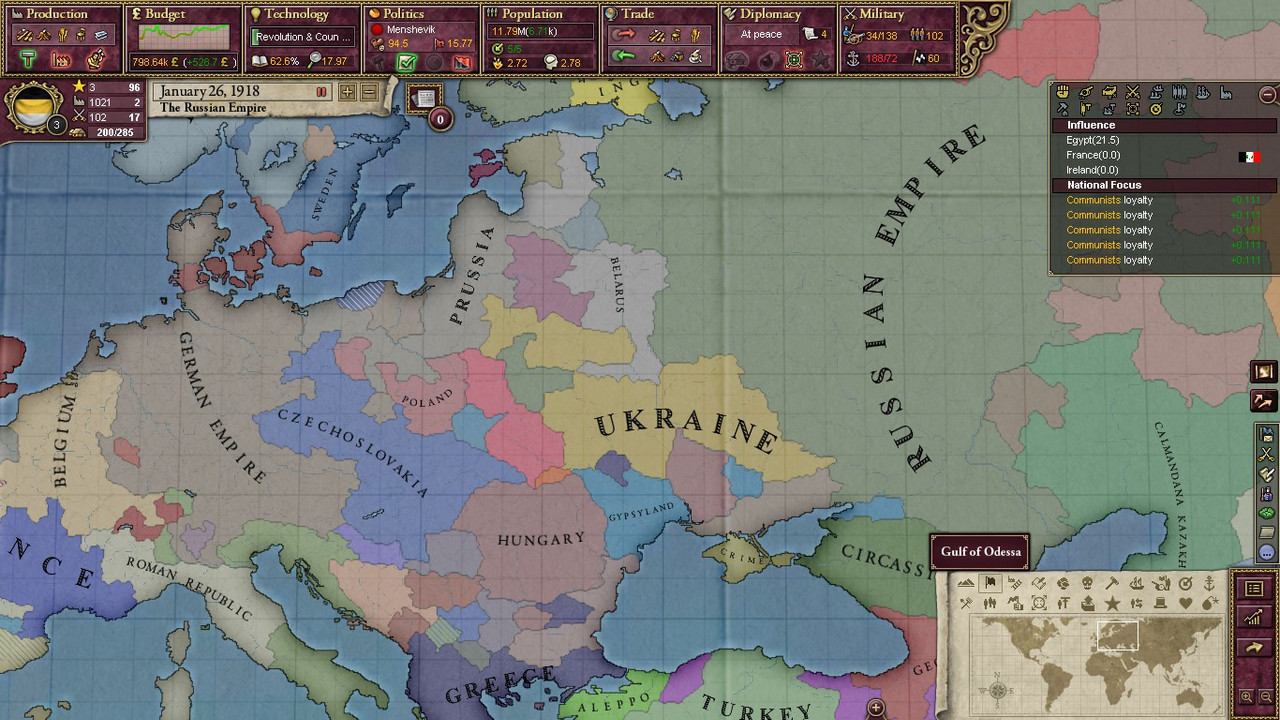
According to the Treaty of St. Petersburg, the Russian Empire has also lost half of Siberia and all overseas colonies particularly in the Pacific Ocean. Some provinces continued to belong Russia on the Far East, forming an enclave, remained cut off from the rest of the state. For the first time the Turkic states gained independence, Terek Pass and Turkistan have cut off the Far East from Russia.
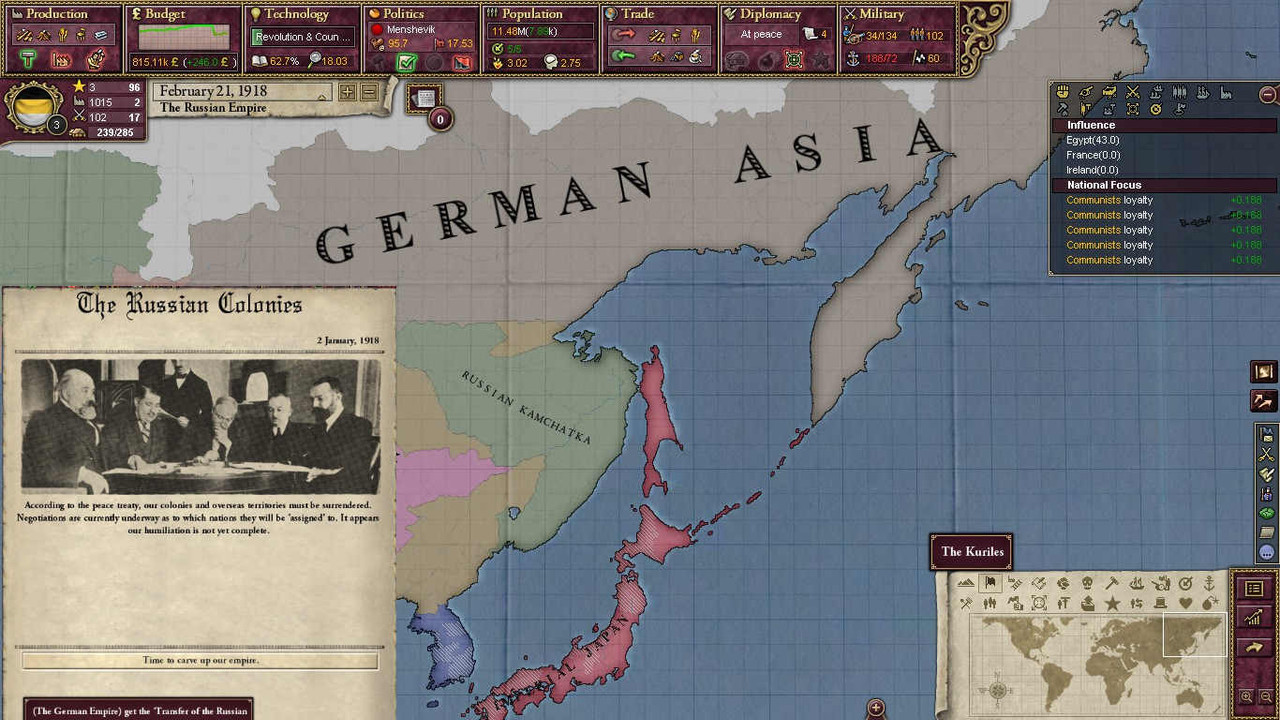
The Reign of the House of Meri, that had been lasted for about 1 000 years, has tragically ended after the bitter fight with another continental empire. During the ten centuries of Meri’s rule in Russia, there were many successes, achievements and victories. But times are changing: Nicholas II Meri went to Azov and later sailed for Greece, accompanied by royal court and his own family. He reached Constantinople on 12 May 1918. He died of heartbreak in 1927 in Attika. His son Alexei became a head of the House Meri, hopeless dreaming of the Russian Imperial Crown.
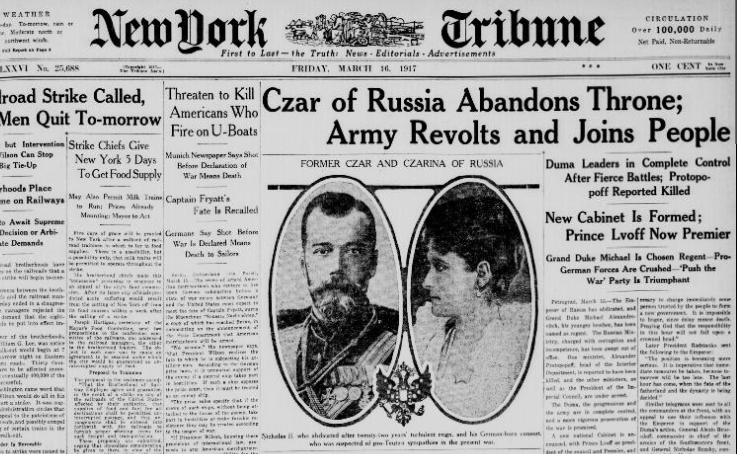
The country continued to be called “EMPIRE” for a year, although the Tsar Nicholas II Meri abdicated on 12 February 1918 after the Russian defeat in the Great War. The V Duma has been elected on 01 July 1917 and consisted of 492 members. After the losing more than half of the country, the majority had lost mandates to represent economic and political interests of people in the Russian Parliament. Their constituents now lived in newly independant countries. Formally, the V Duma had been provisional also until the All-Russian Constituent Assembly was convoked. The Assembly was held a year later on 12 February 1919, the gelegates voted unanimously for the Republic at the openning meeting of the session. The seven hundred years reign of the House of Meri ended in catastrophe, the Russisn Empire collapsed into dozens separate states. Some of them first gained statehood (Latvia, Estonia, Crimea, Ukraine and Belorussia), while others rose from the ashes (Poland, Lithuania, Dagestan, Armenia and Circassia).

P.S. My Campaign was lost.
Threadmarks
View all 12 threadmarks
Reader mode
Reader mode


